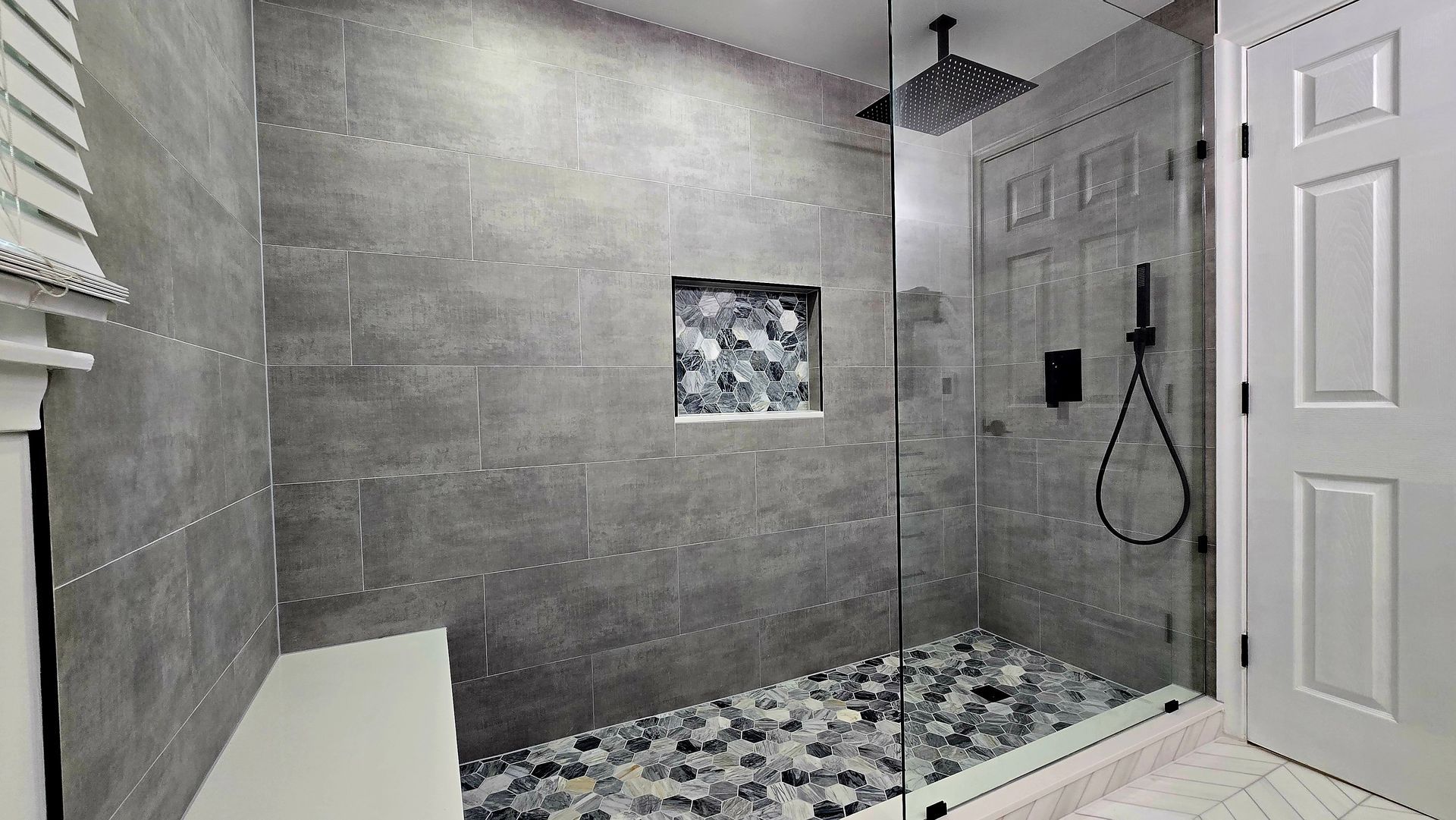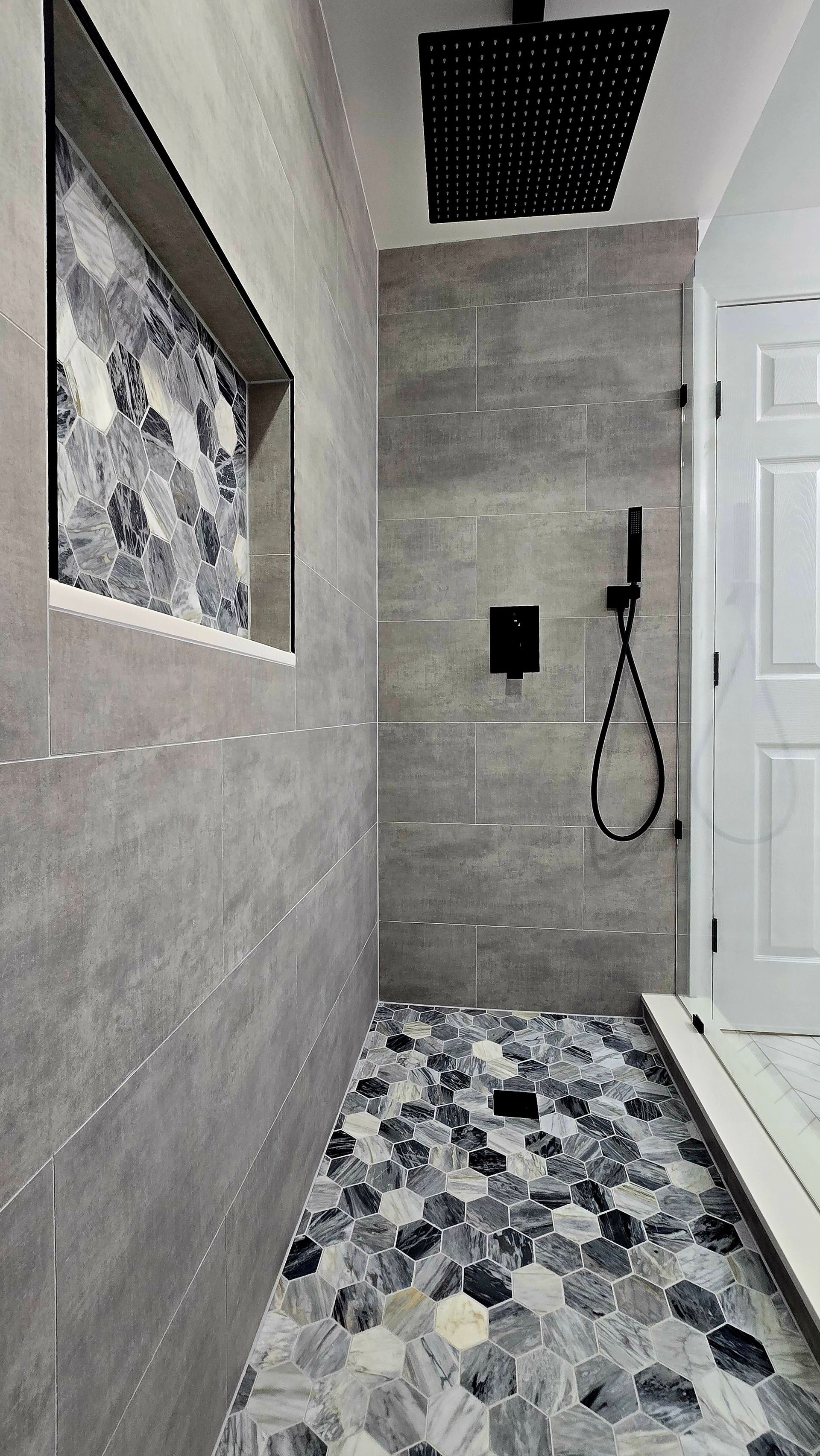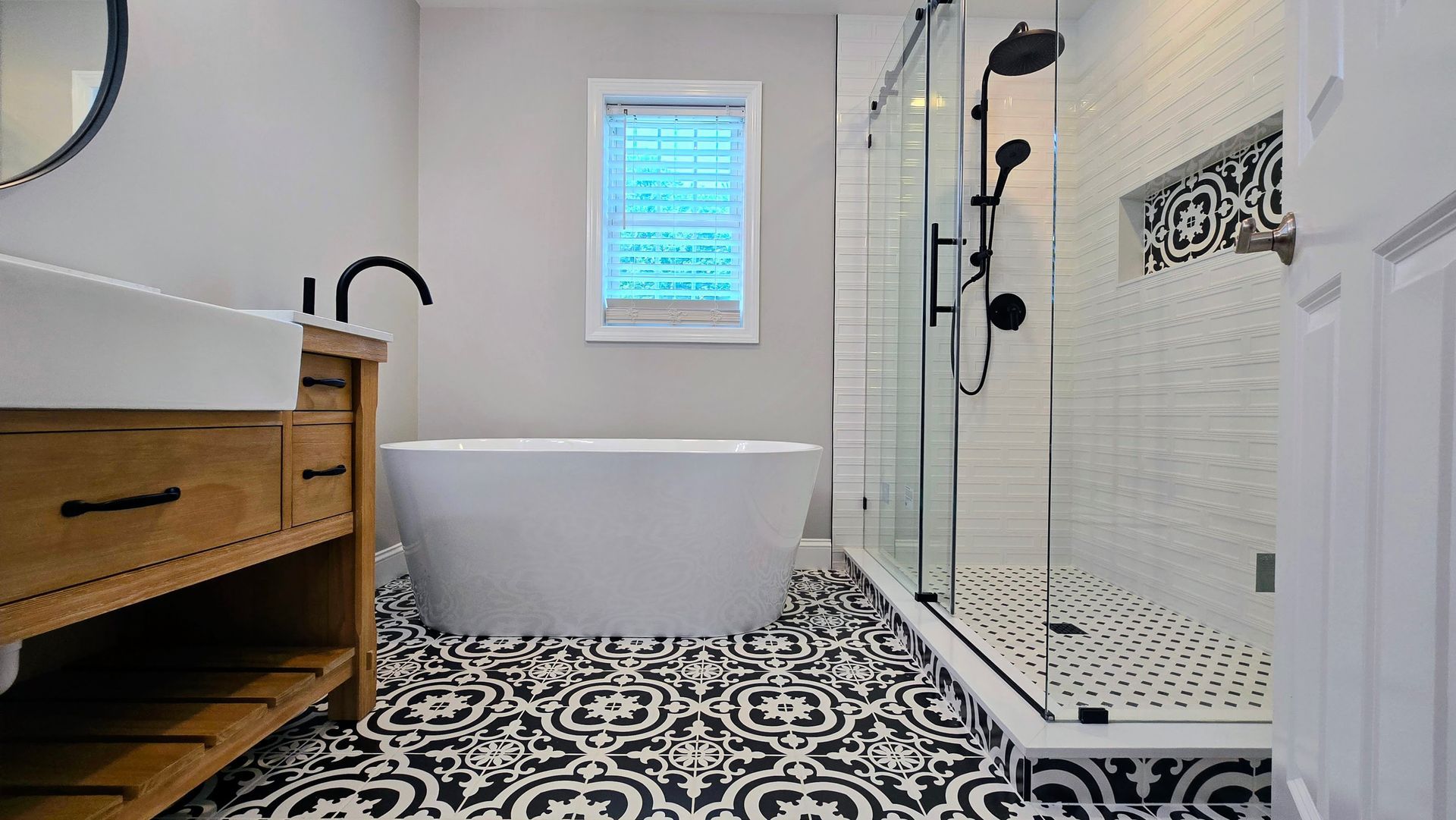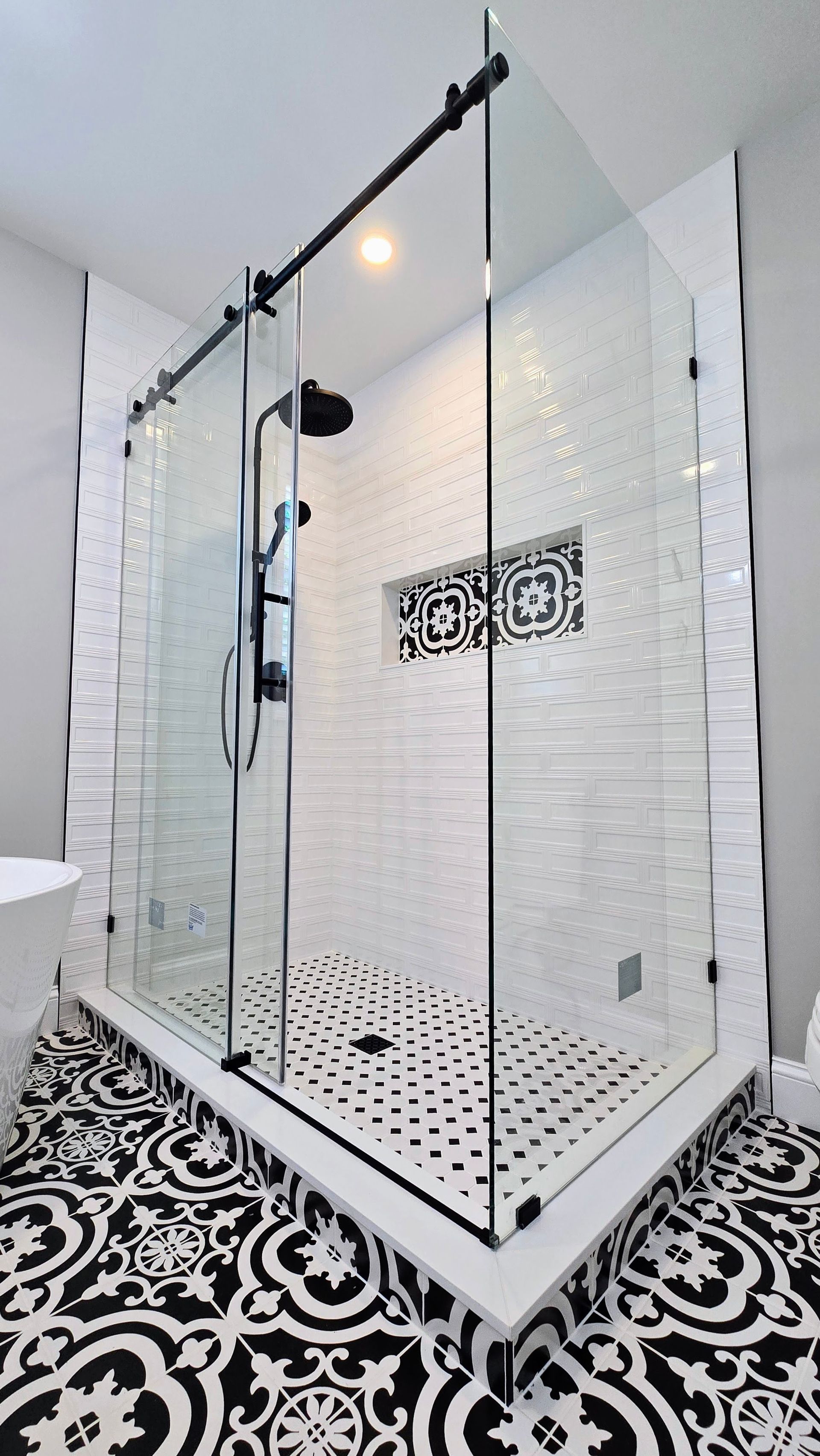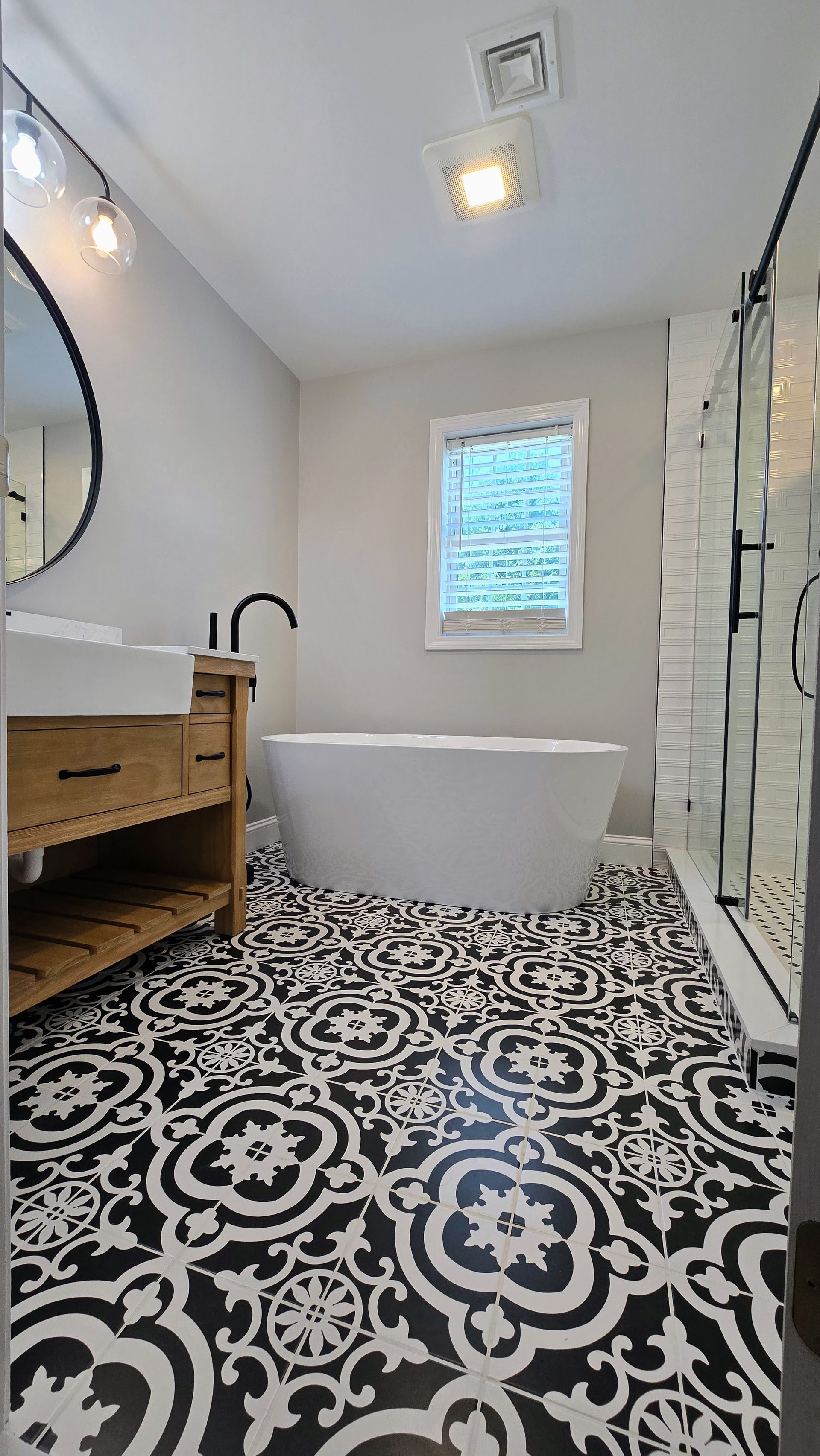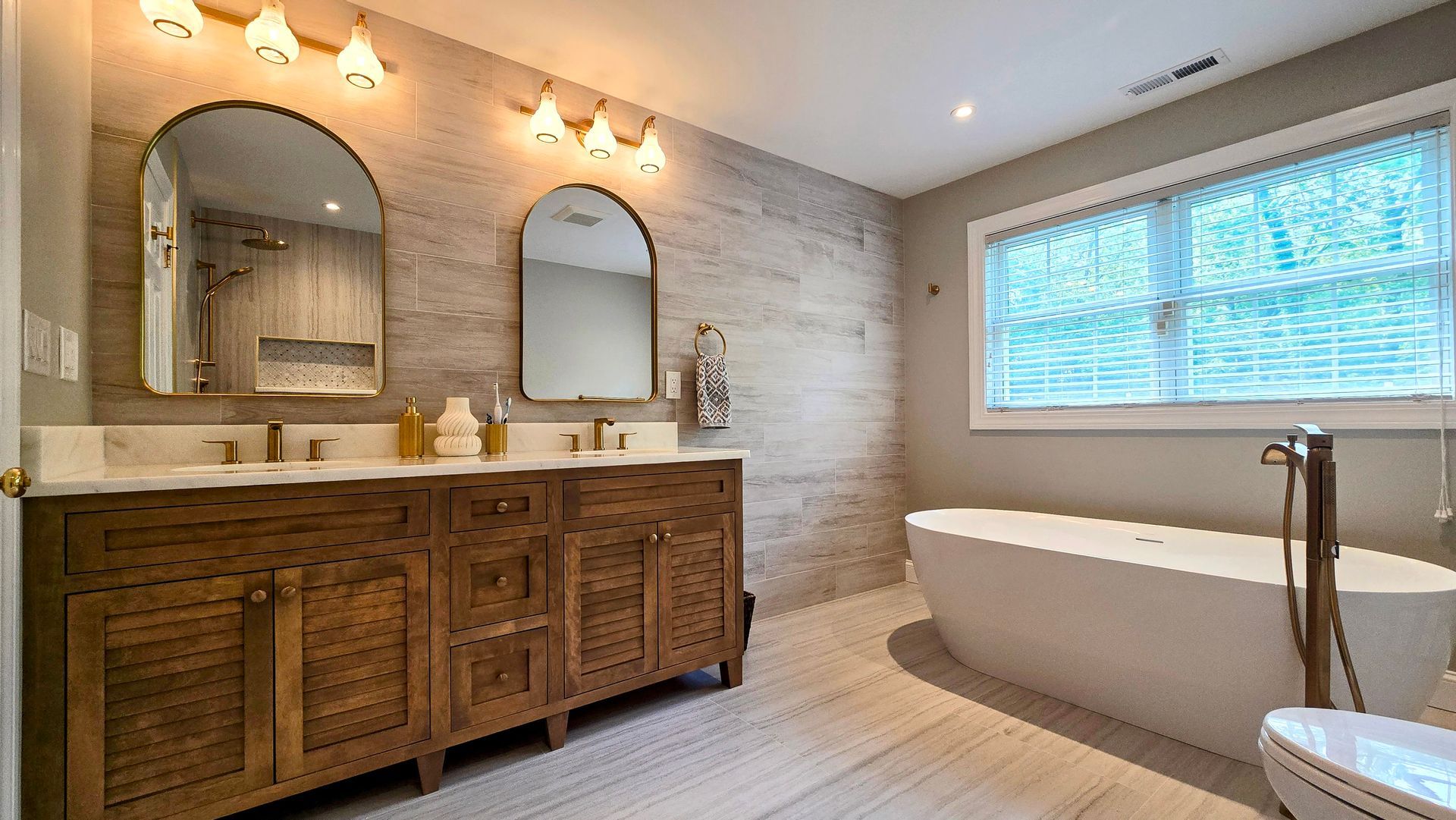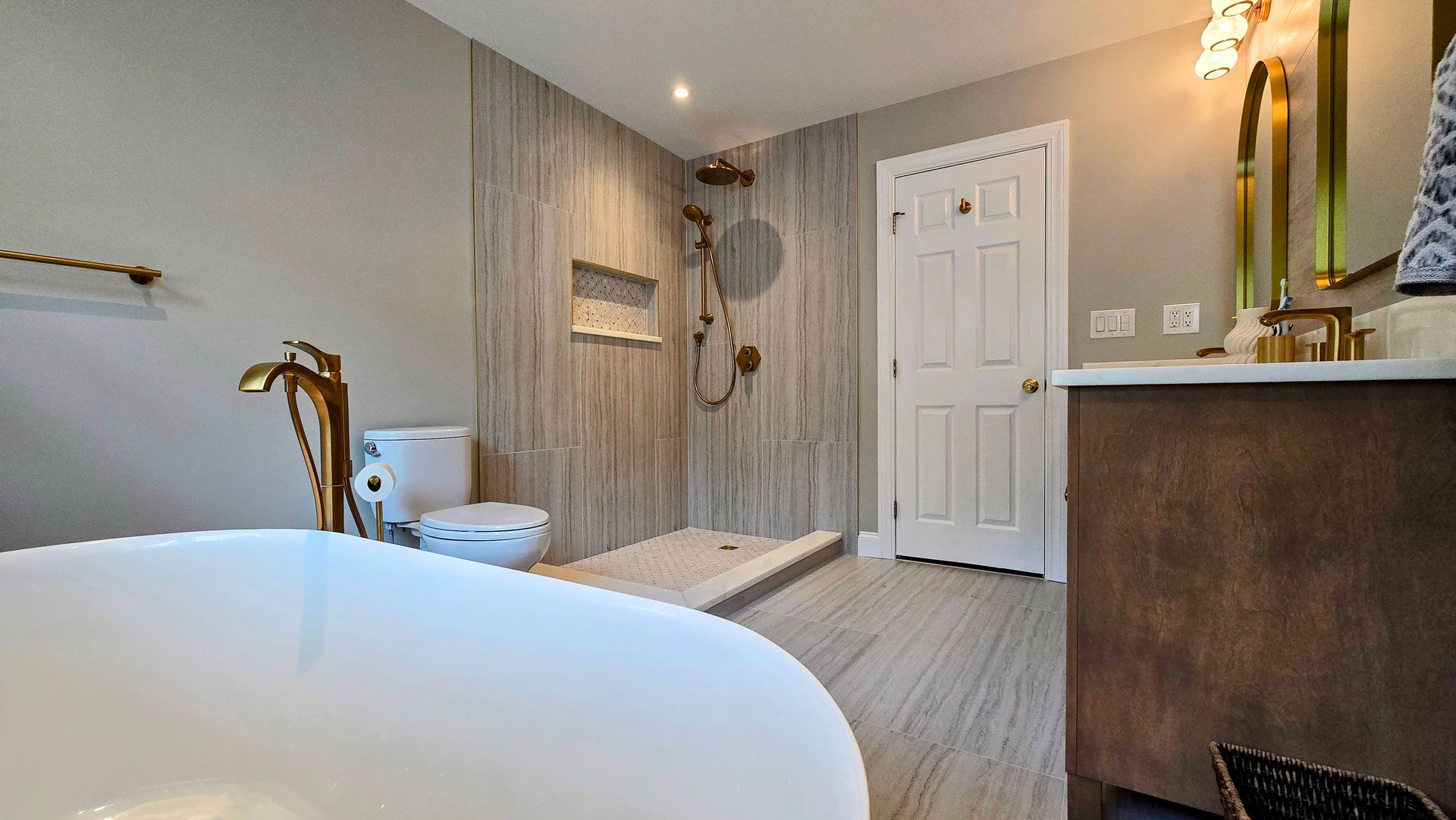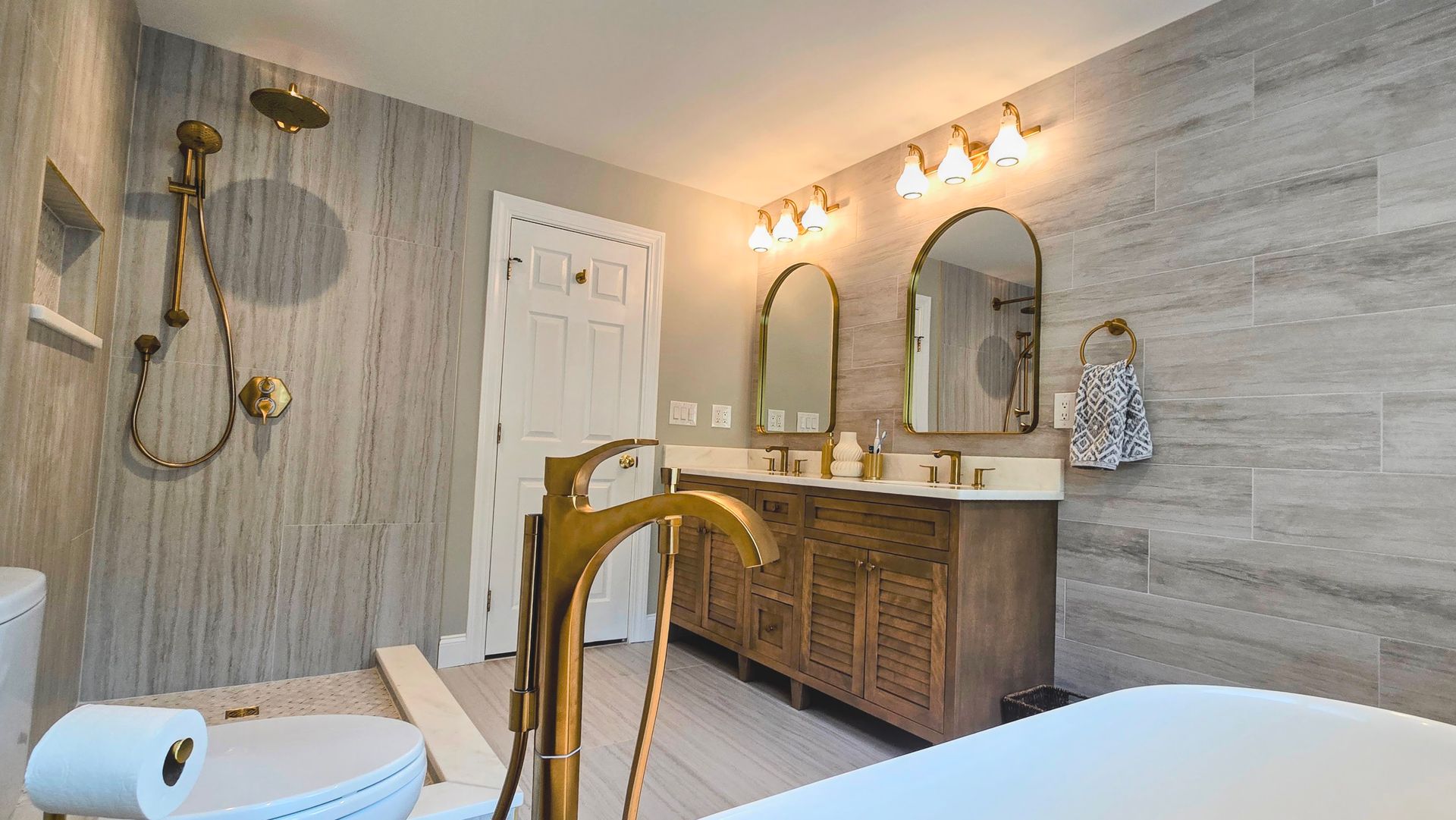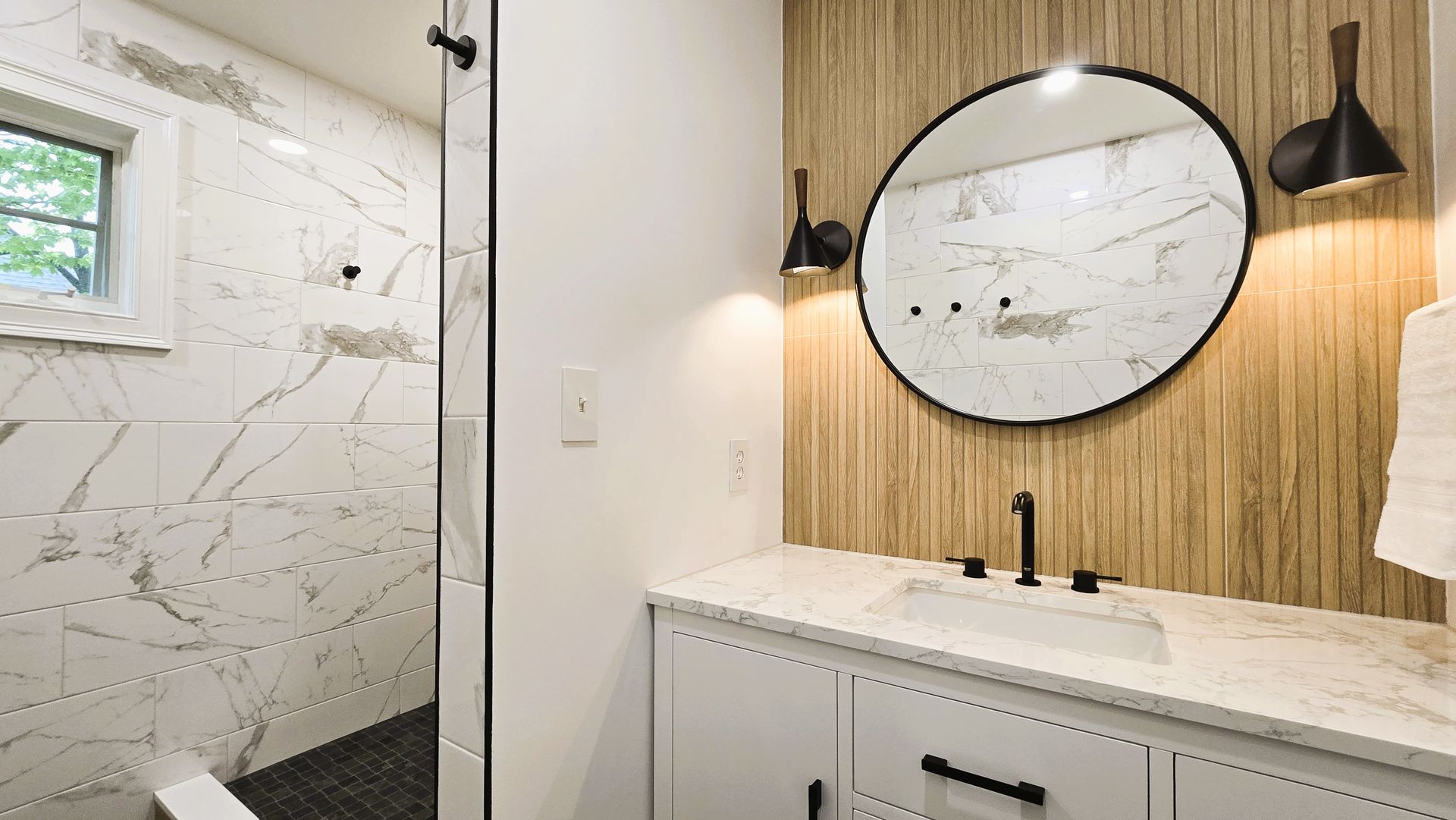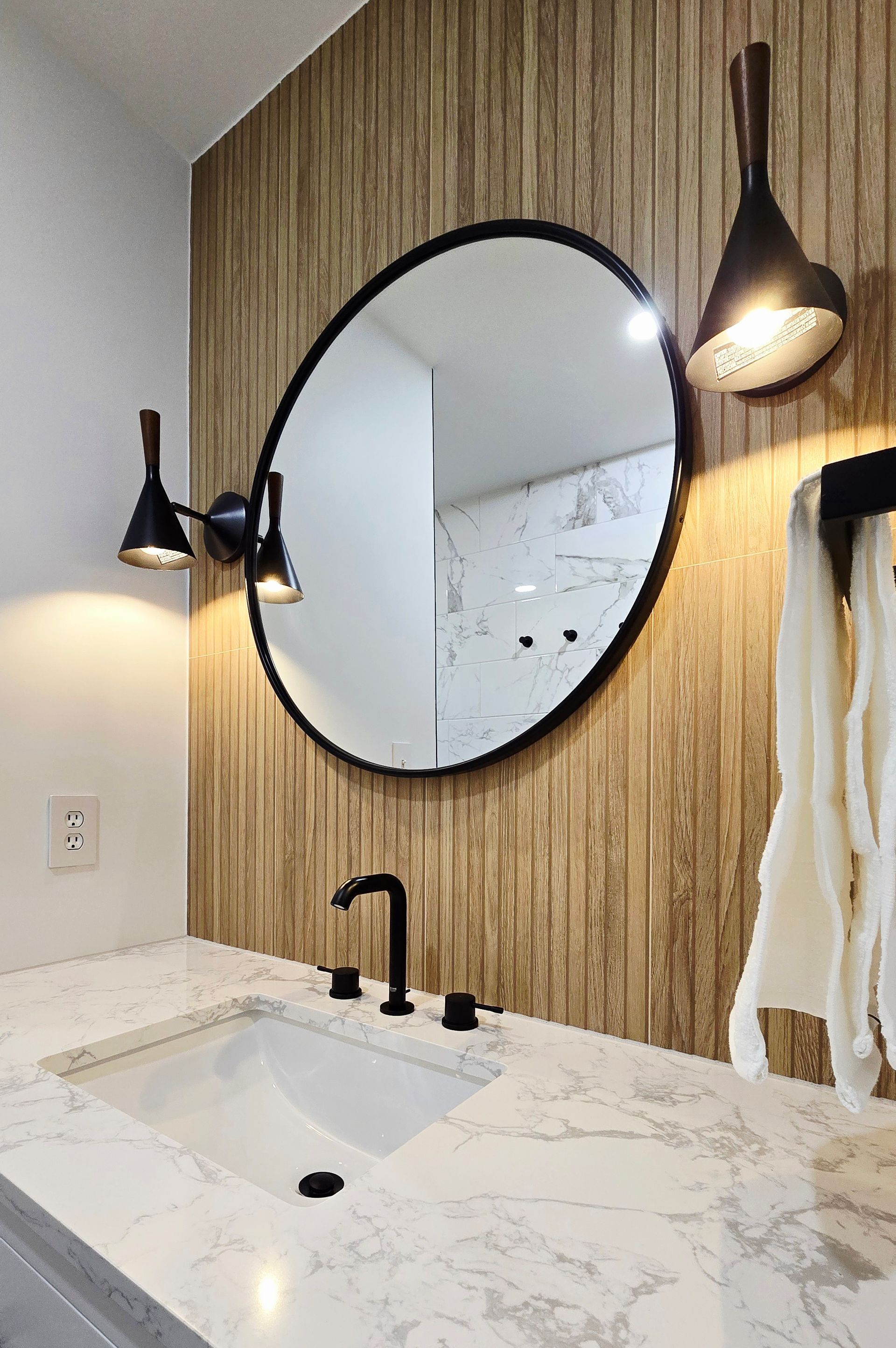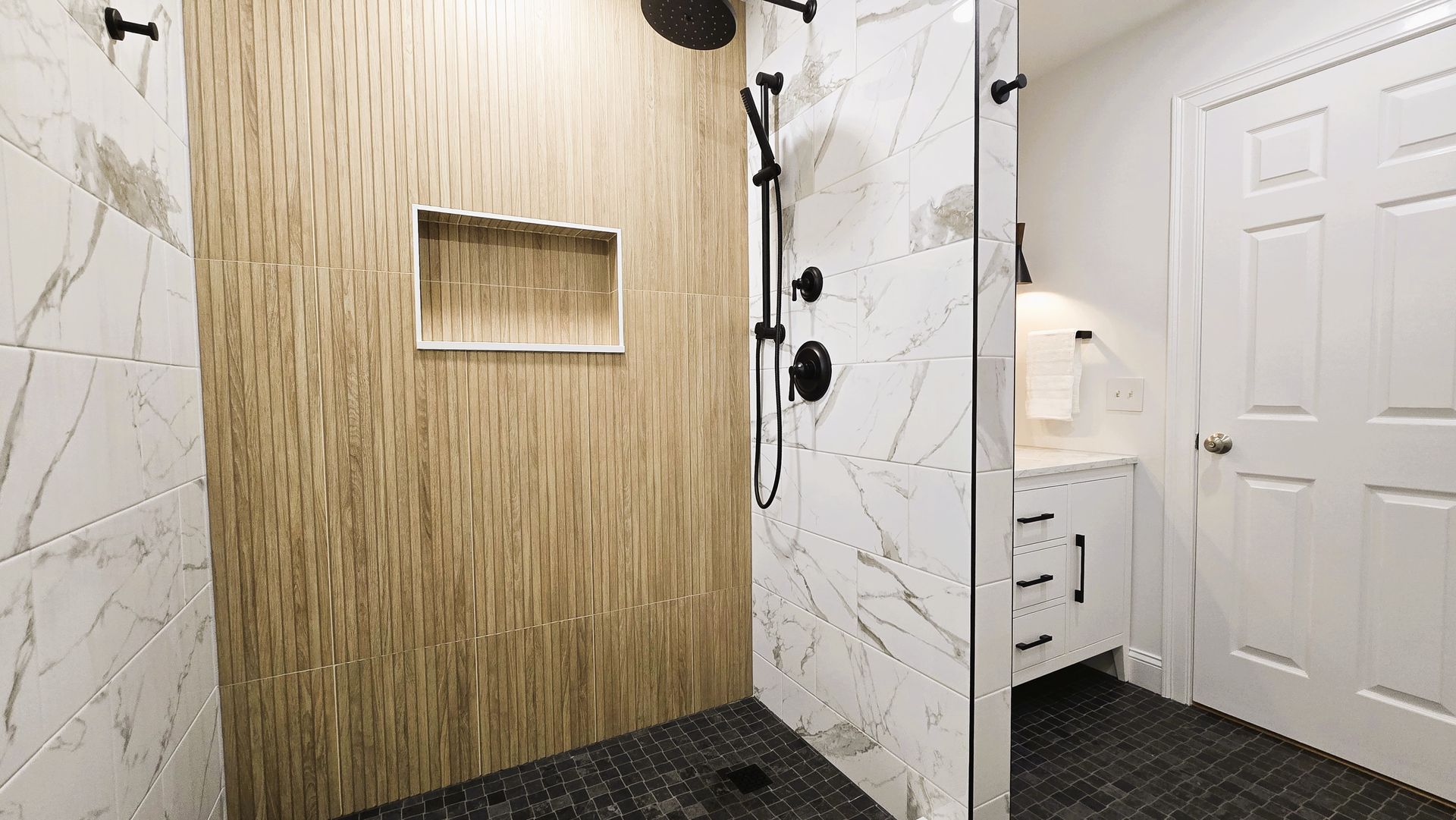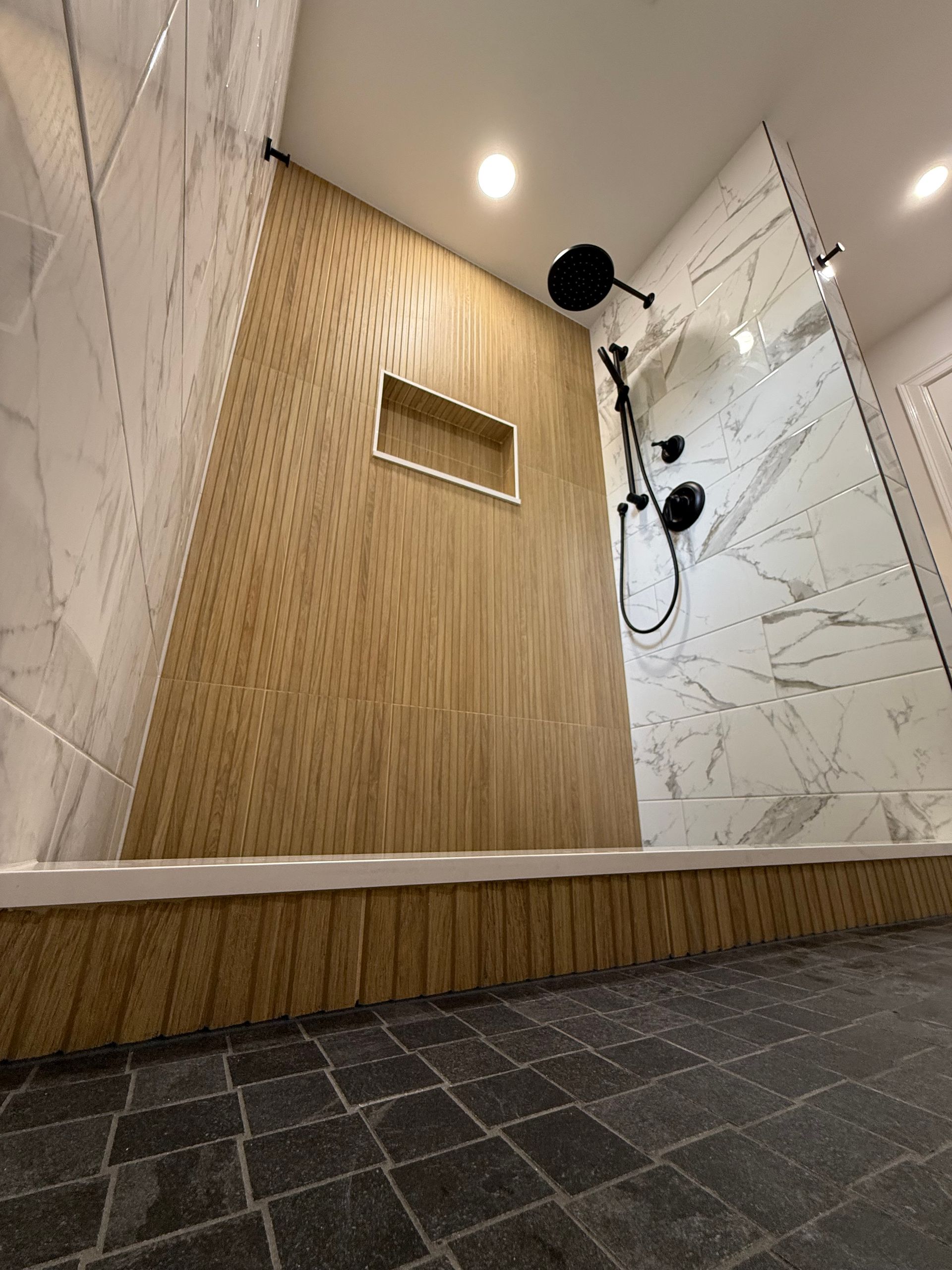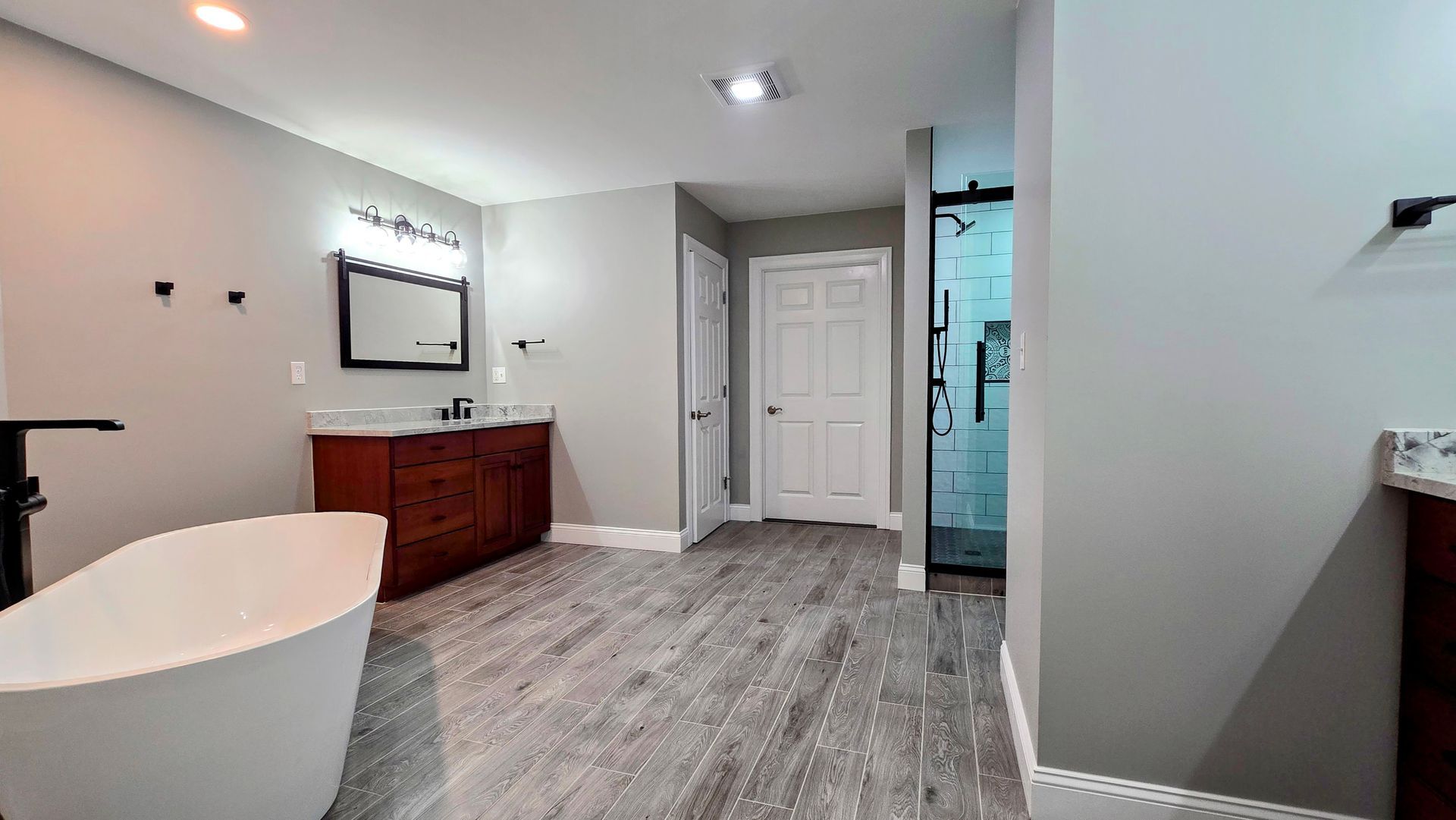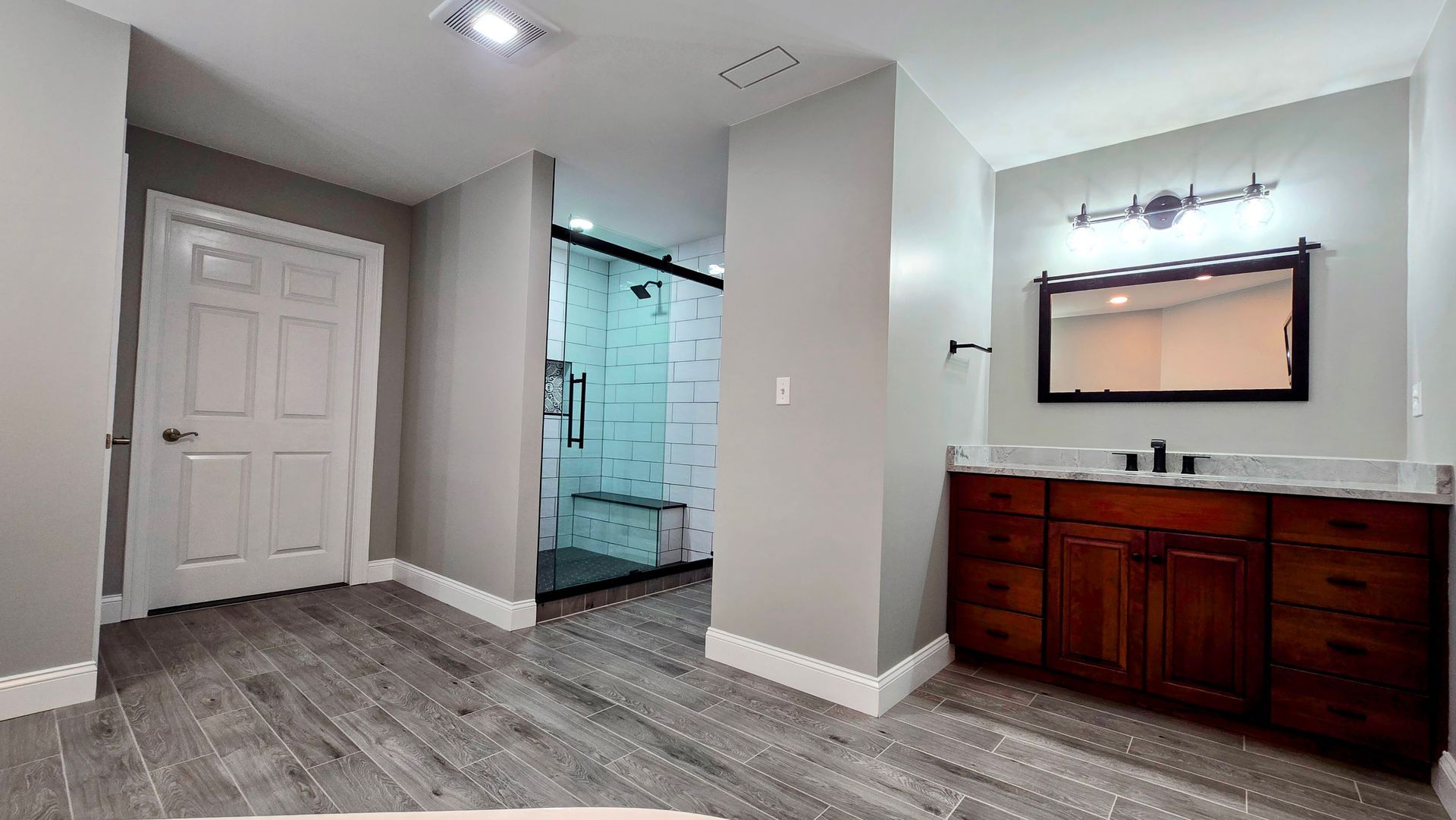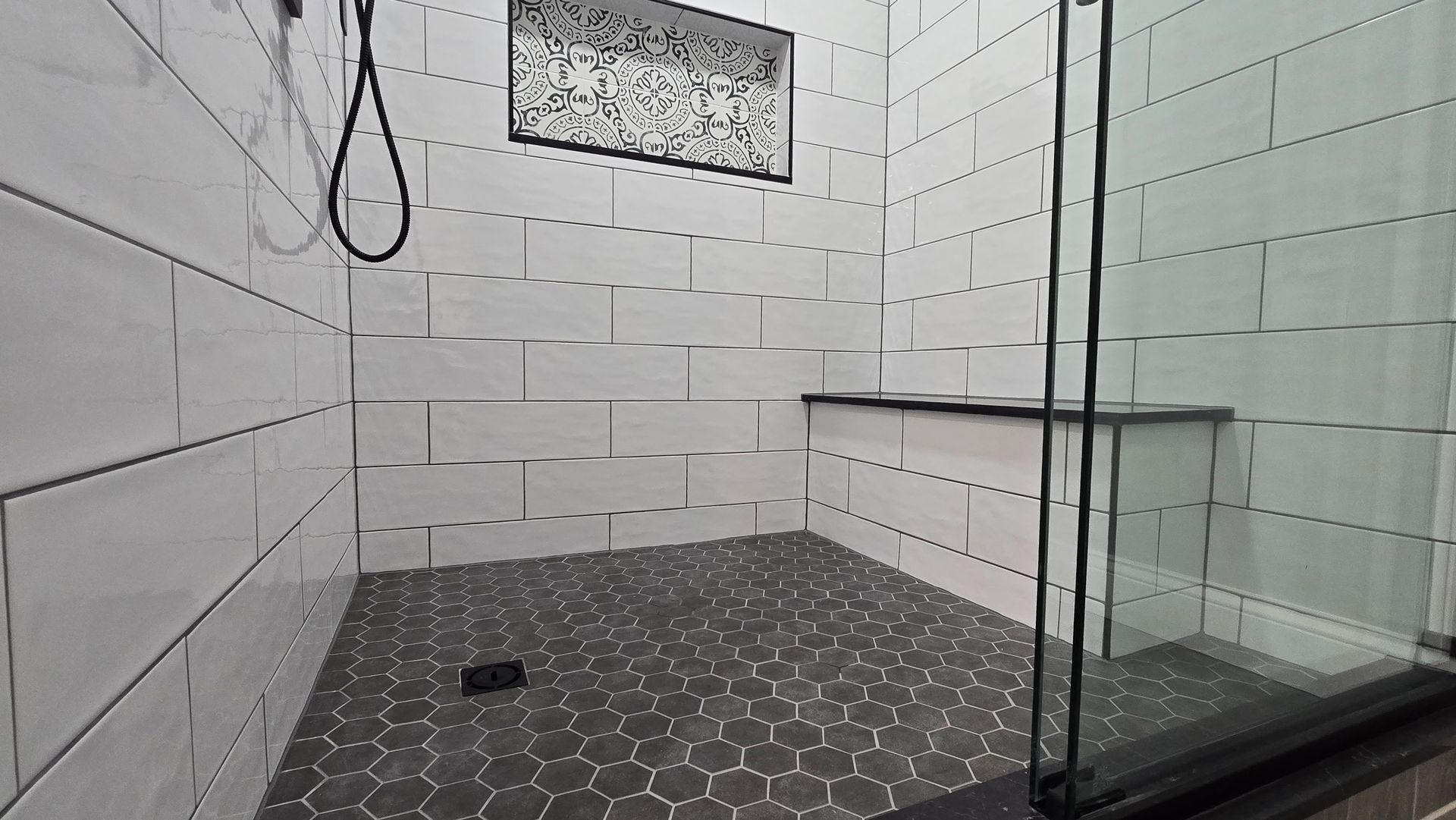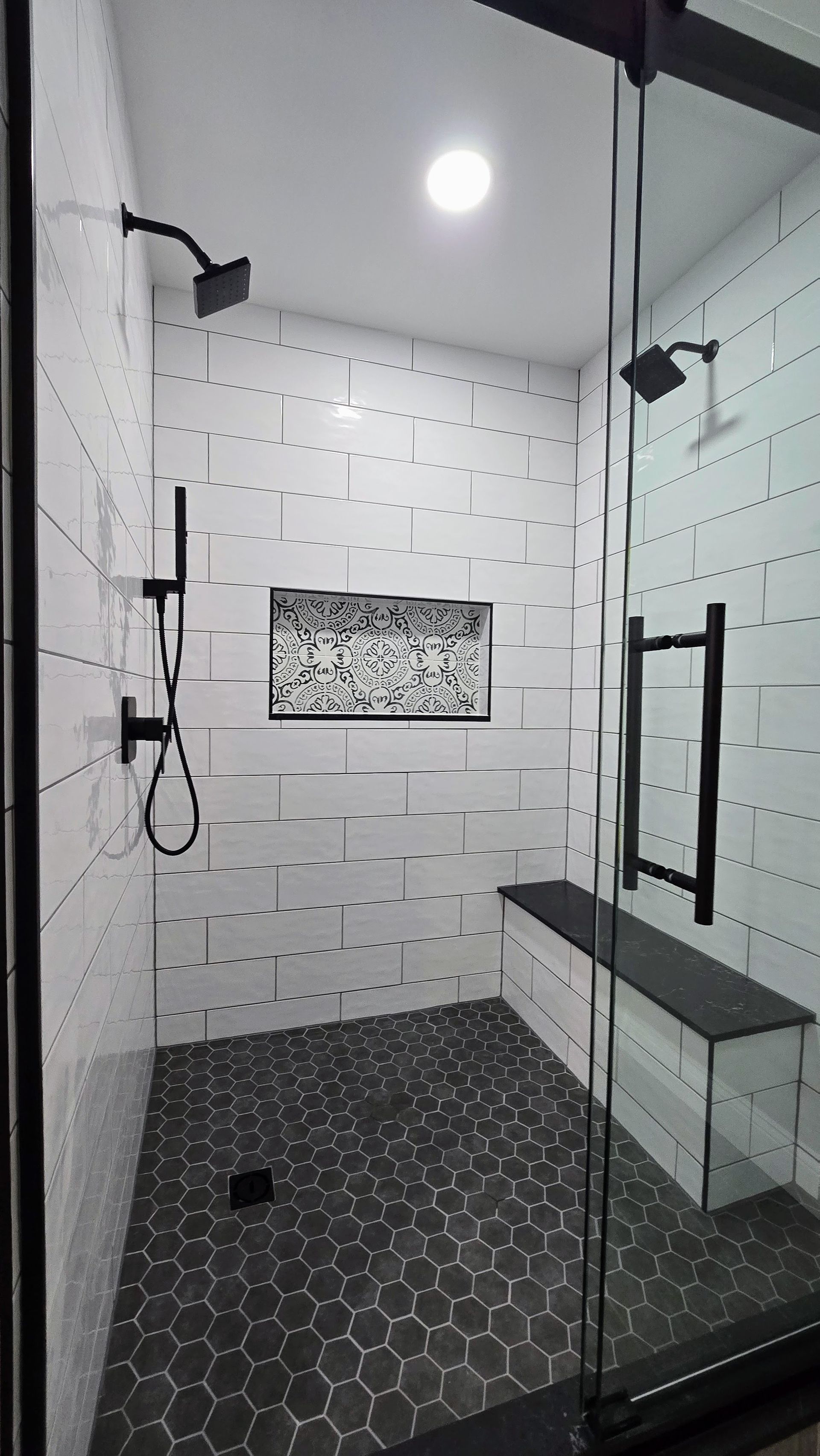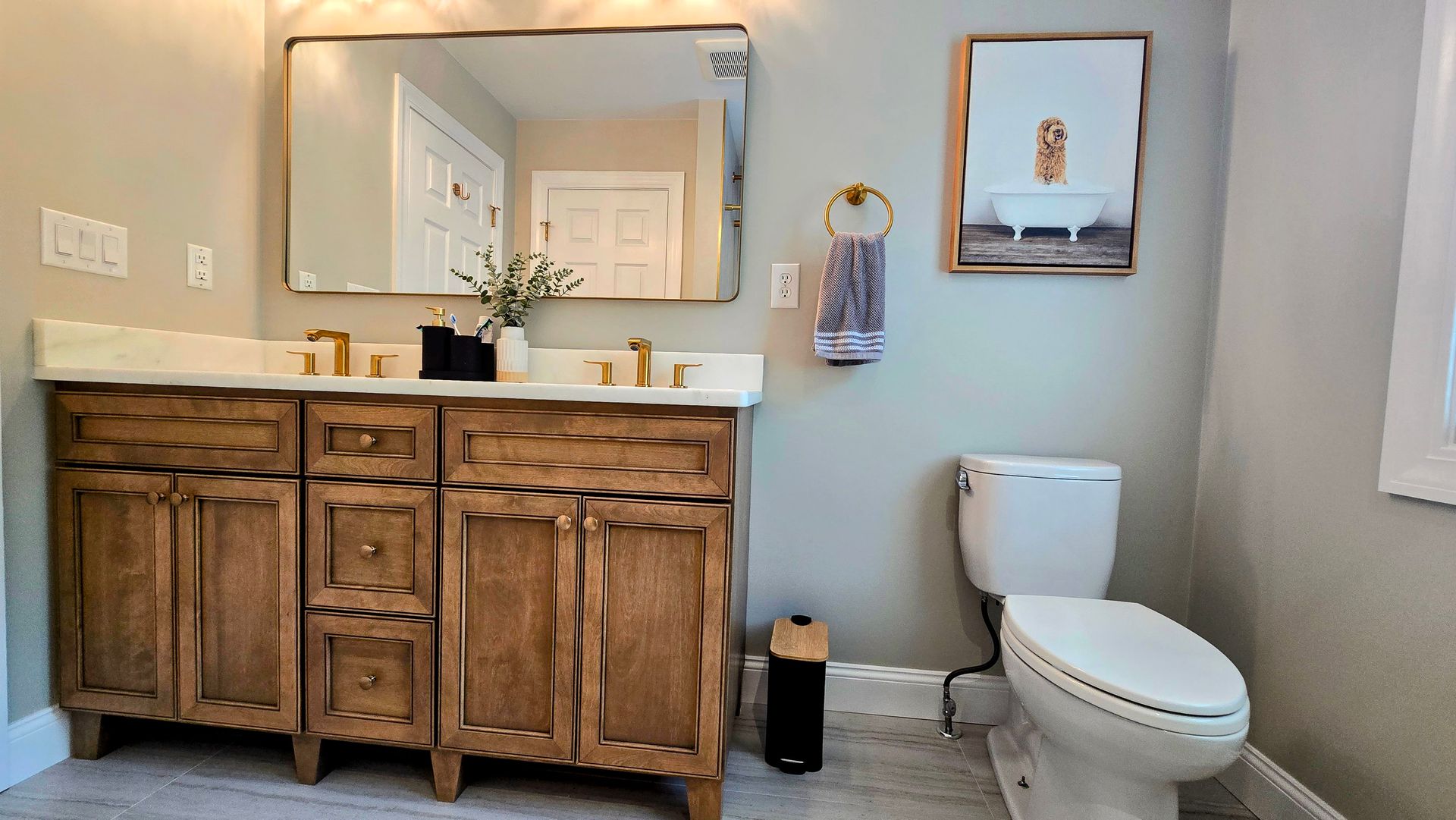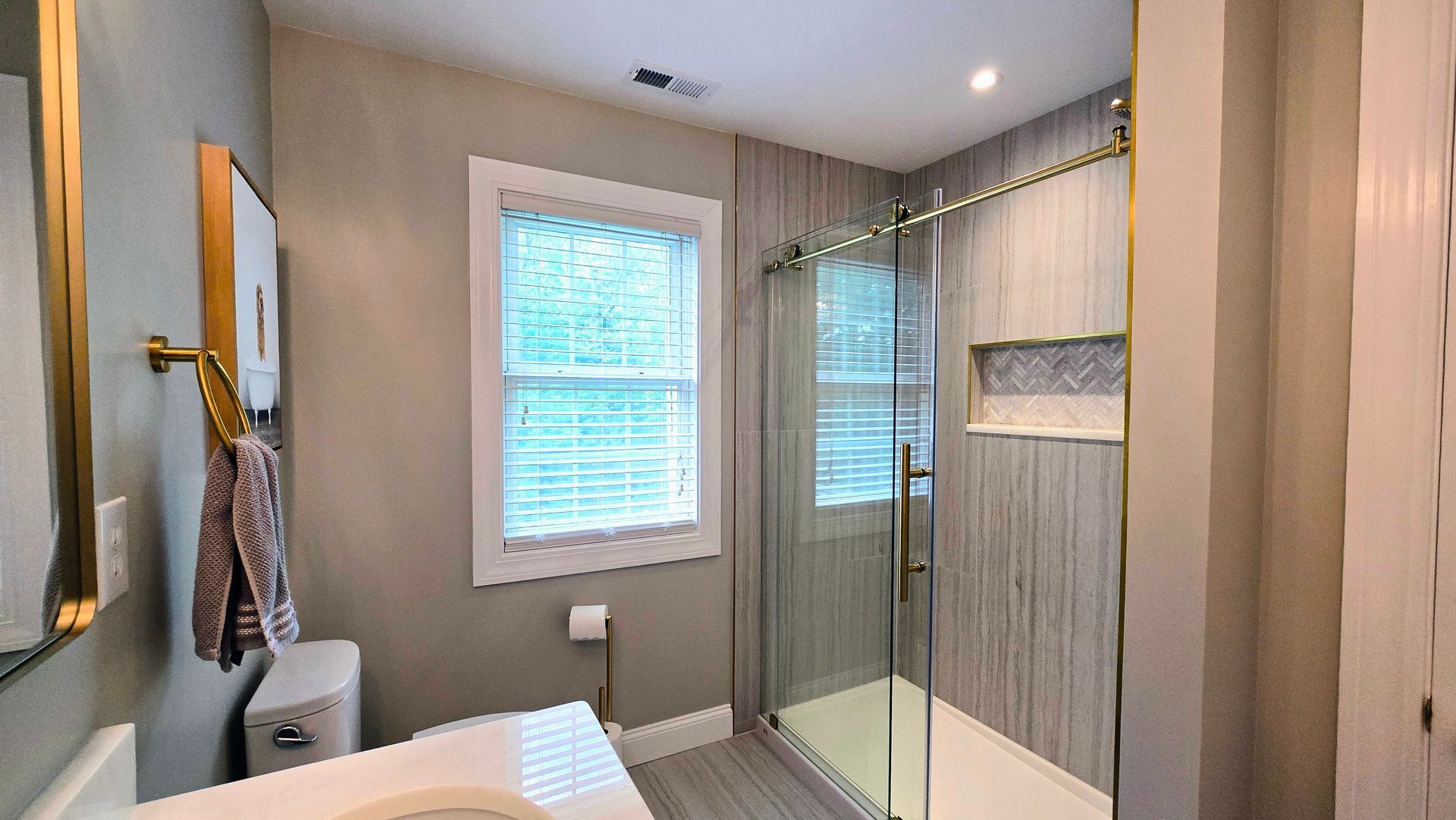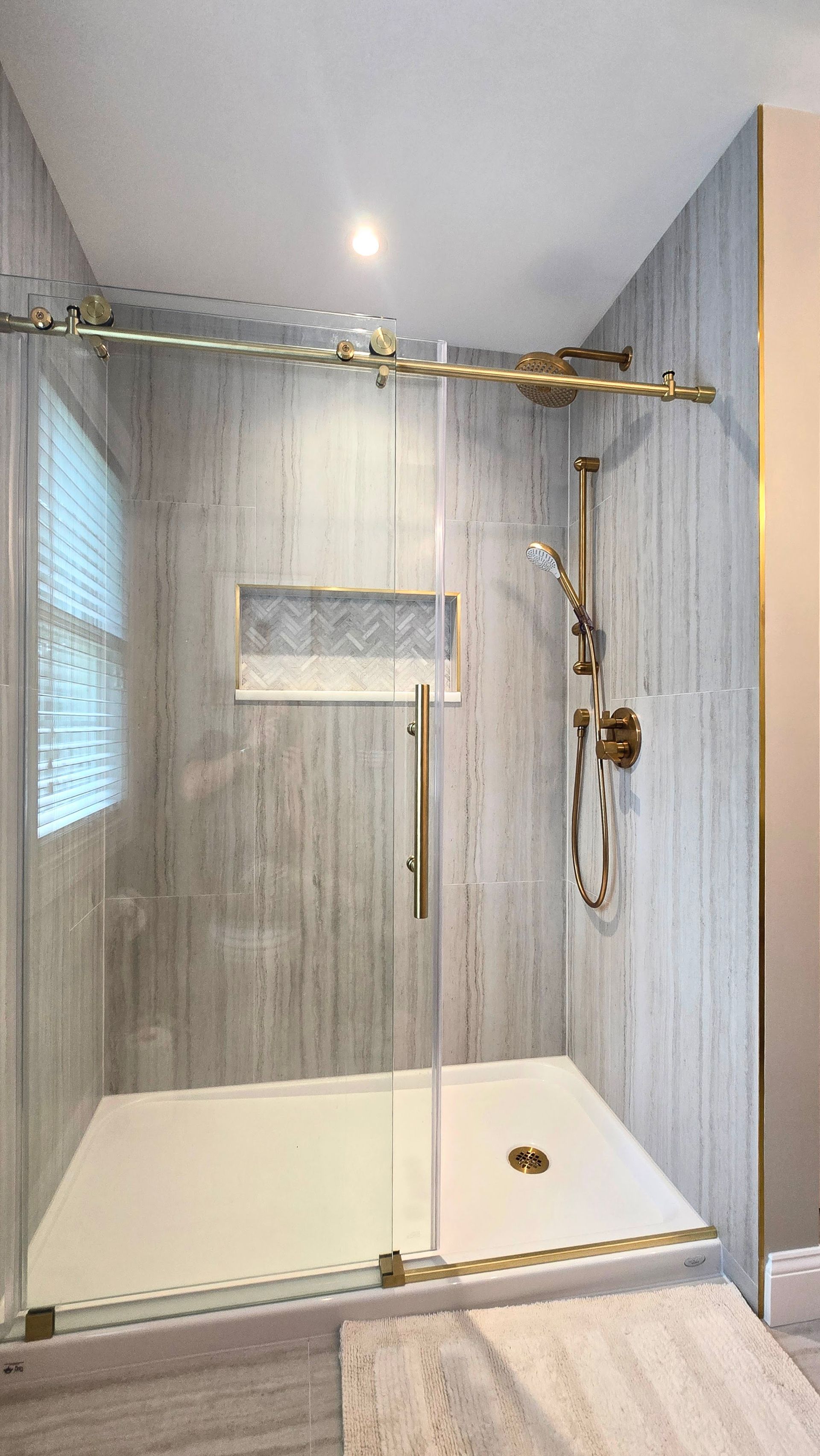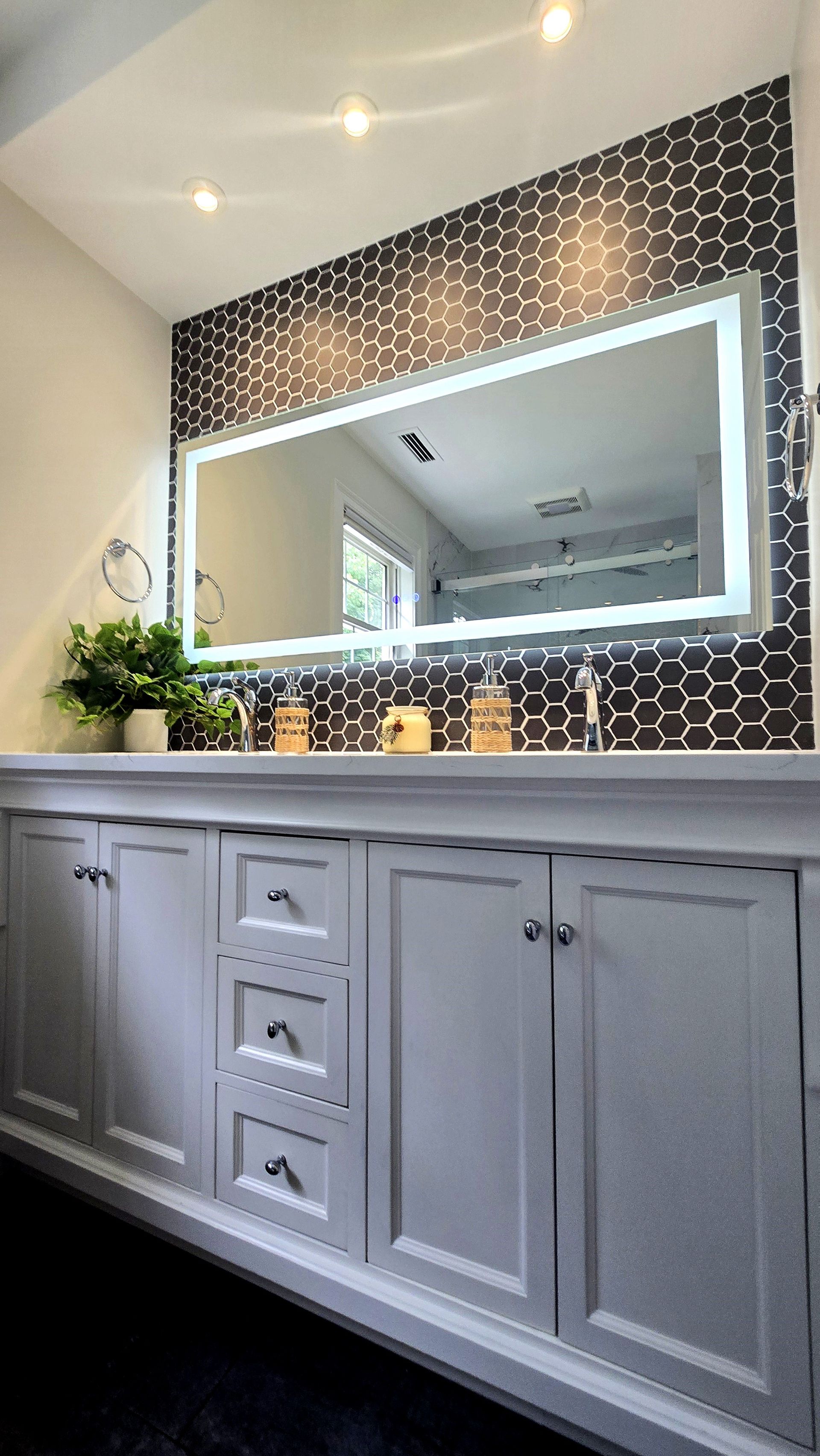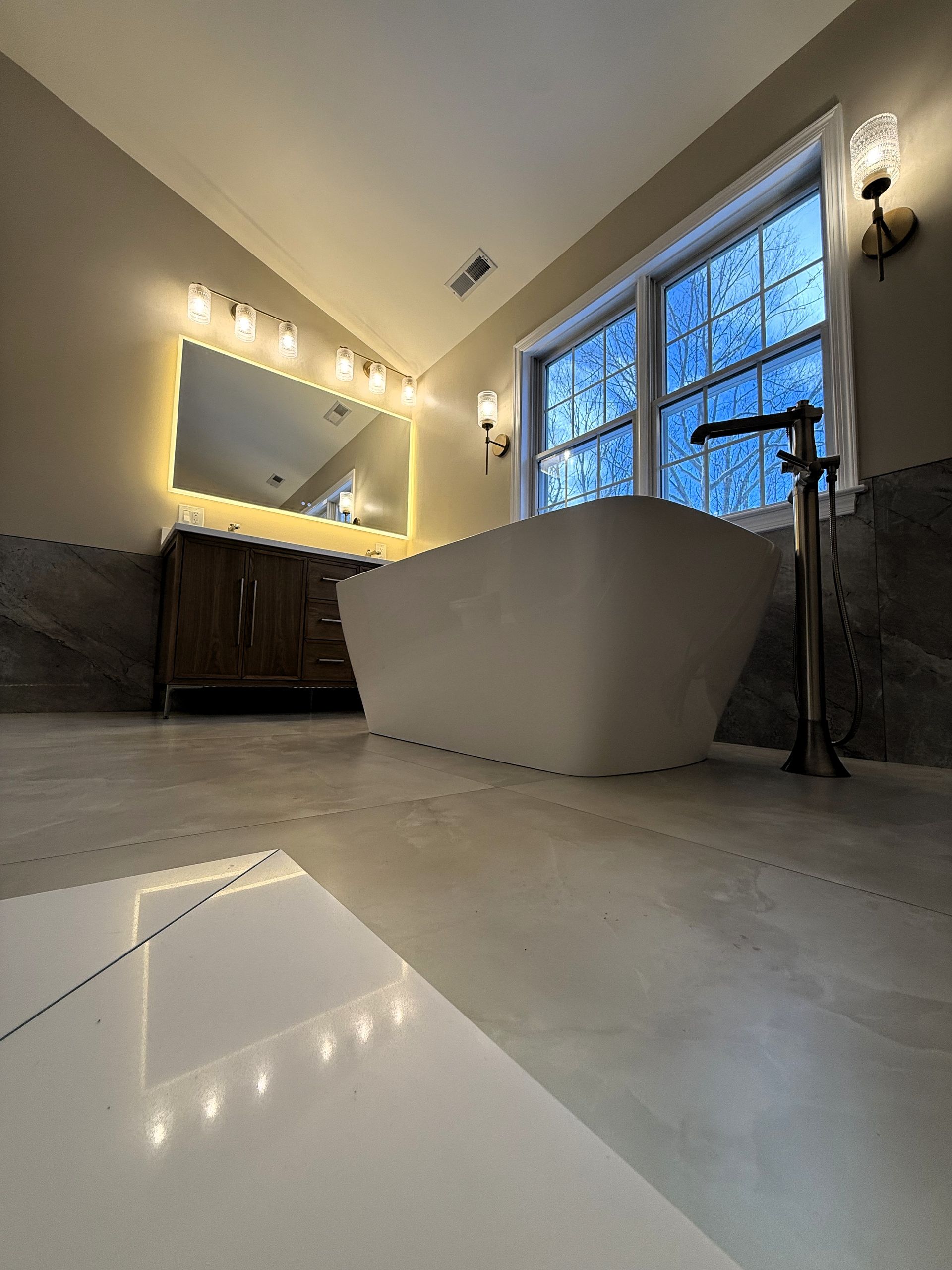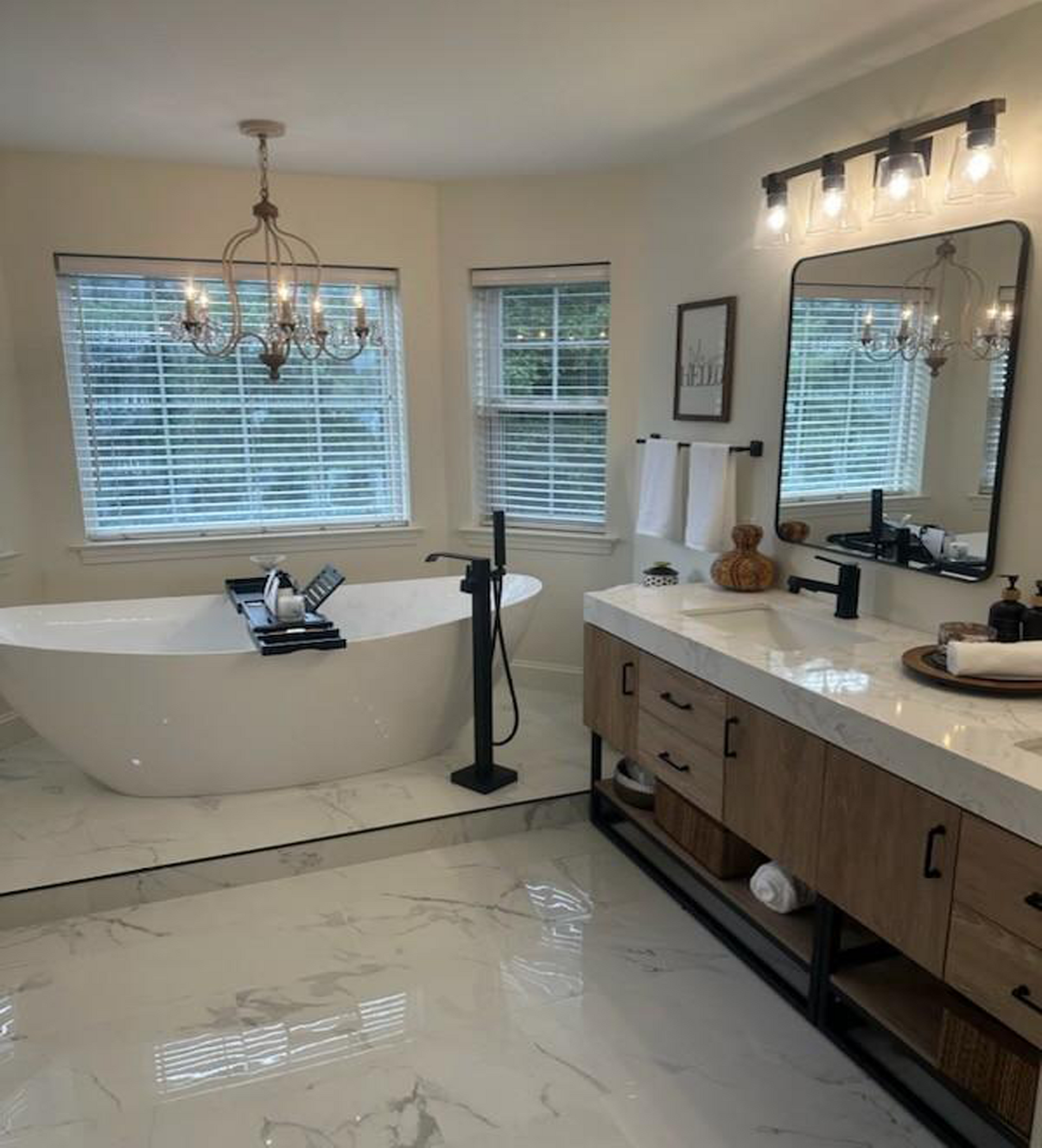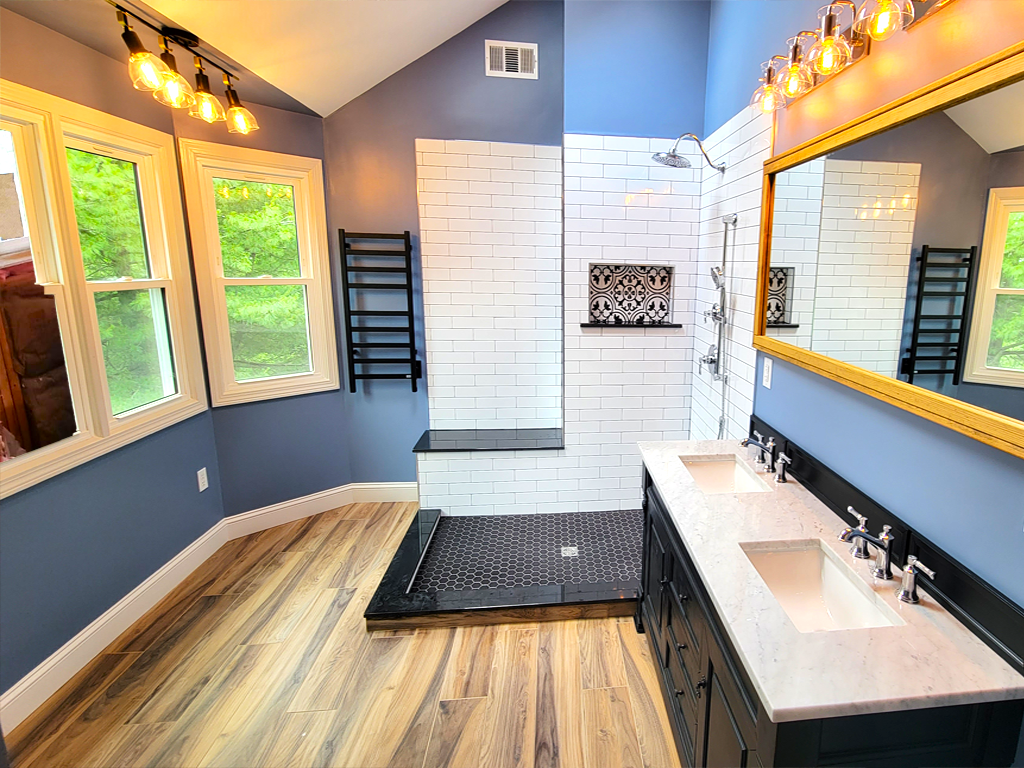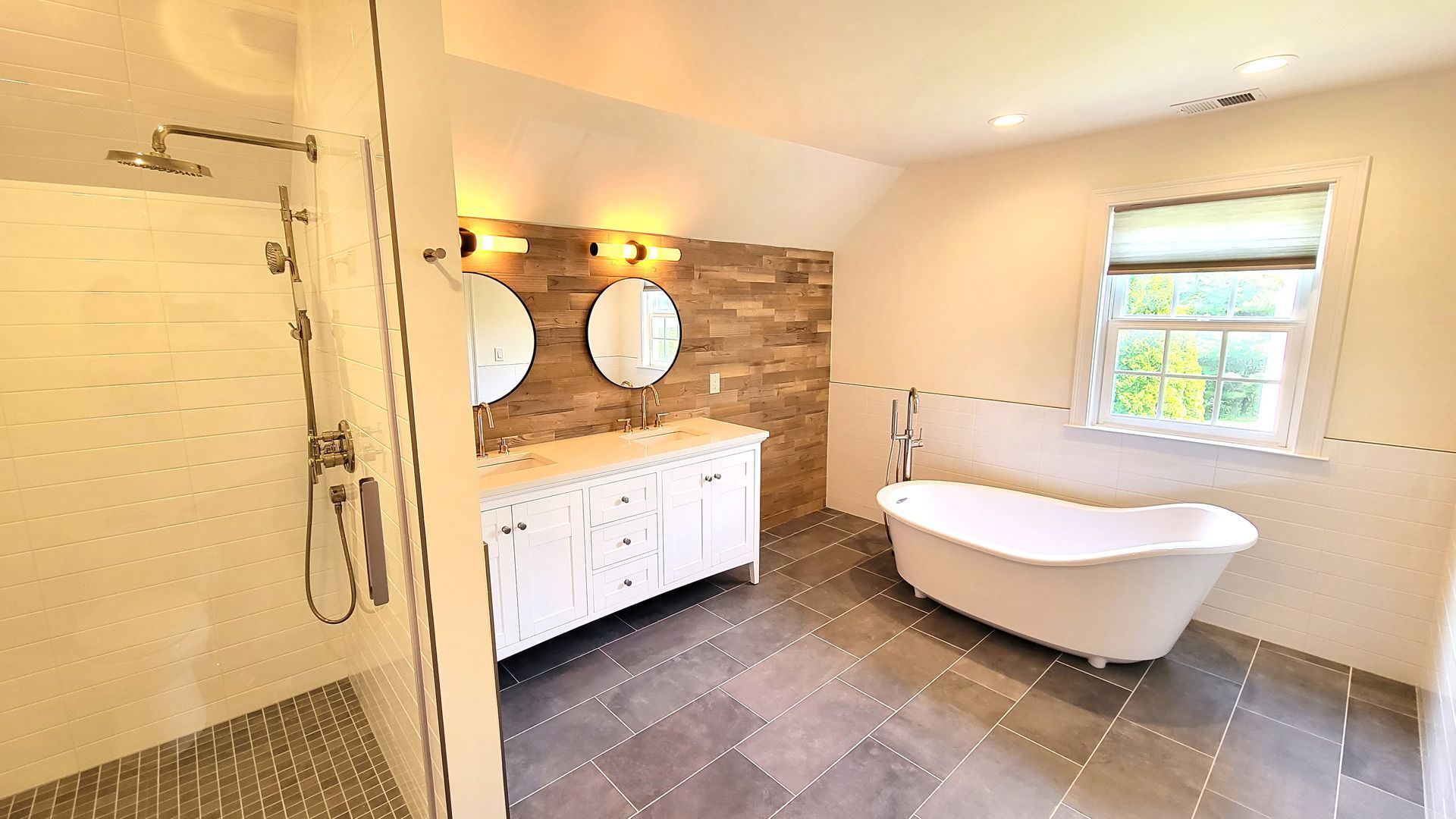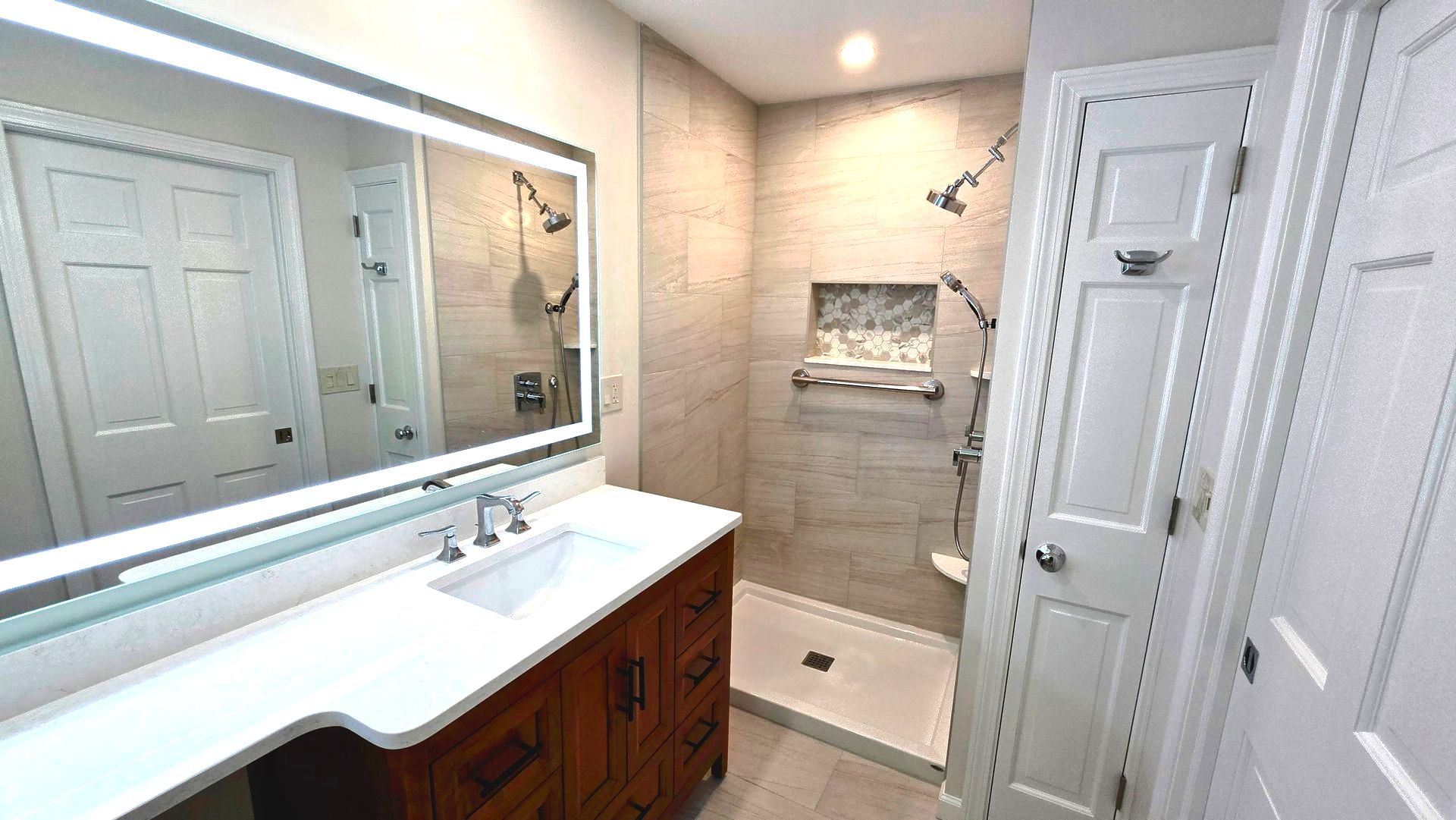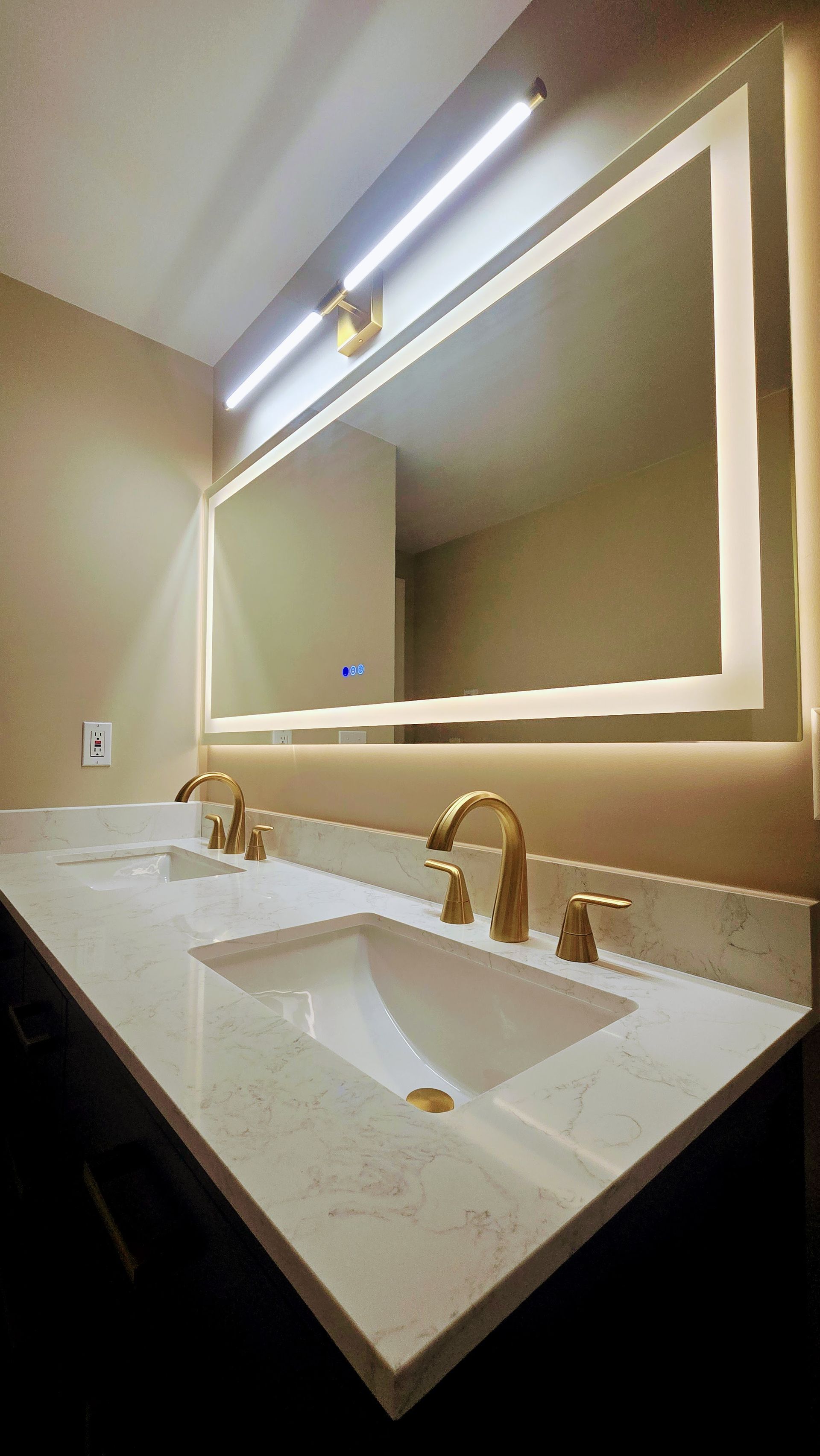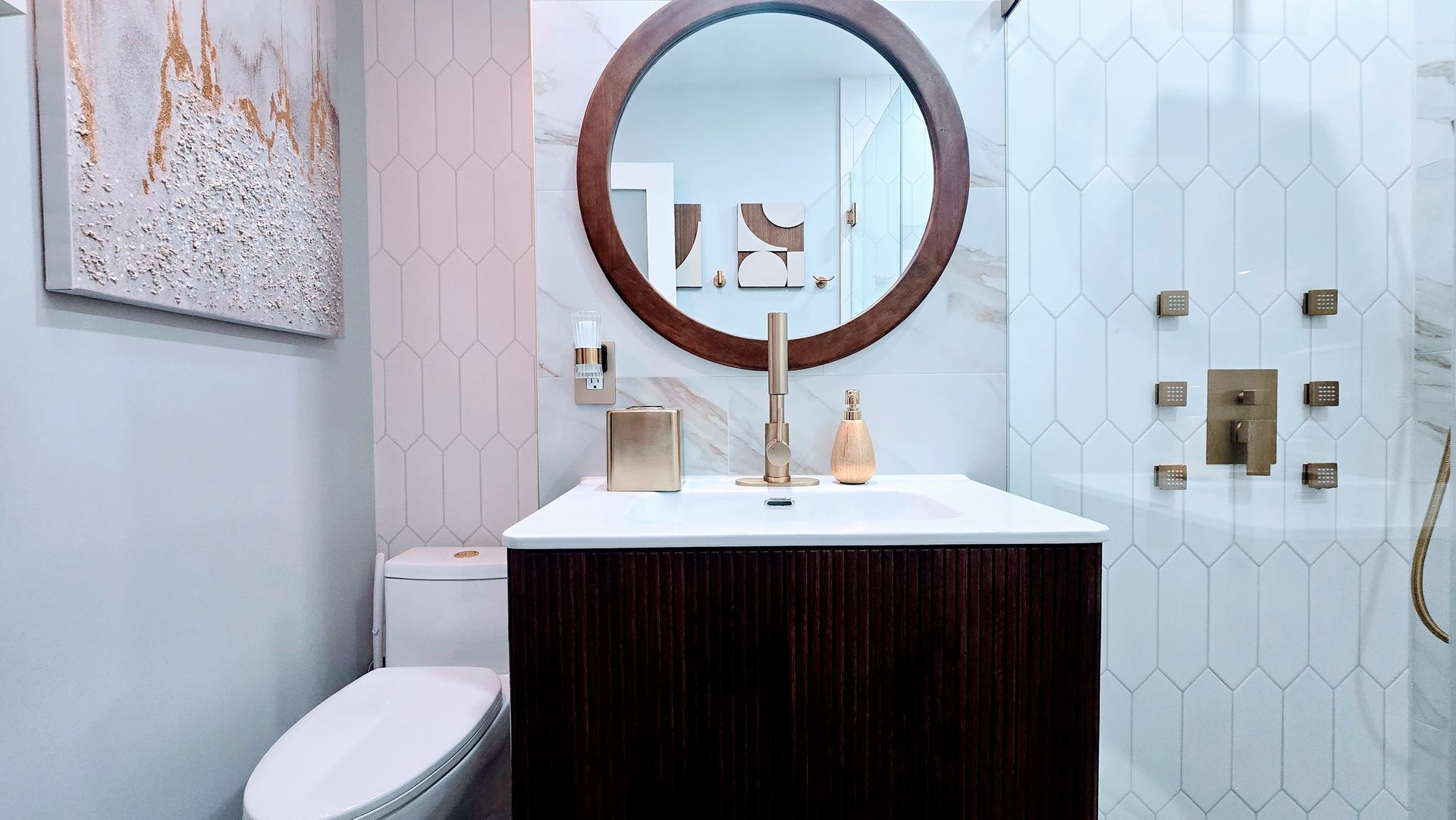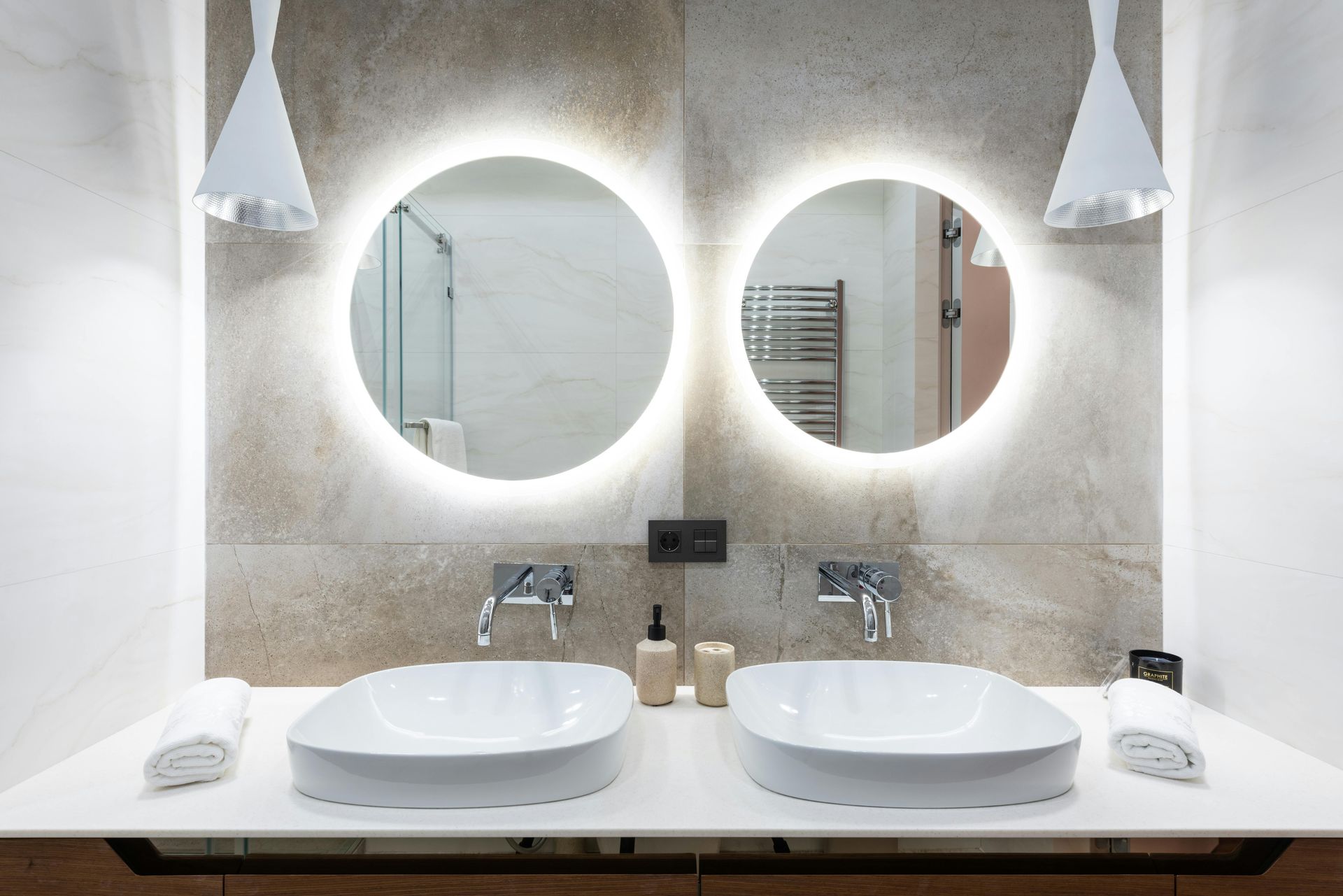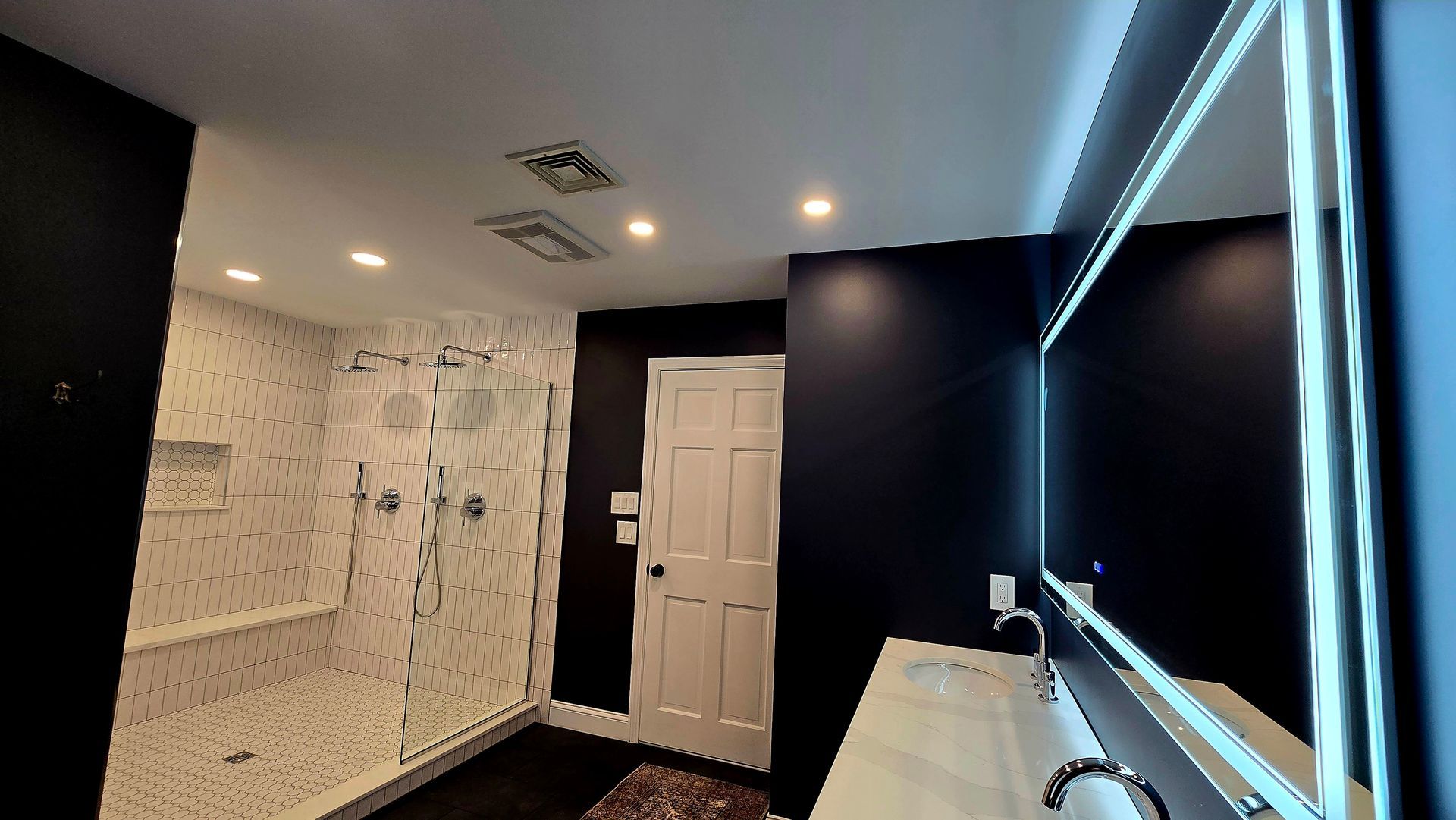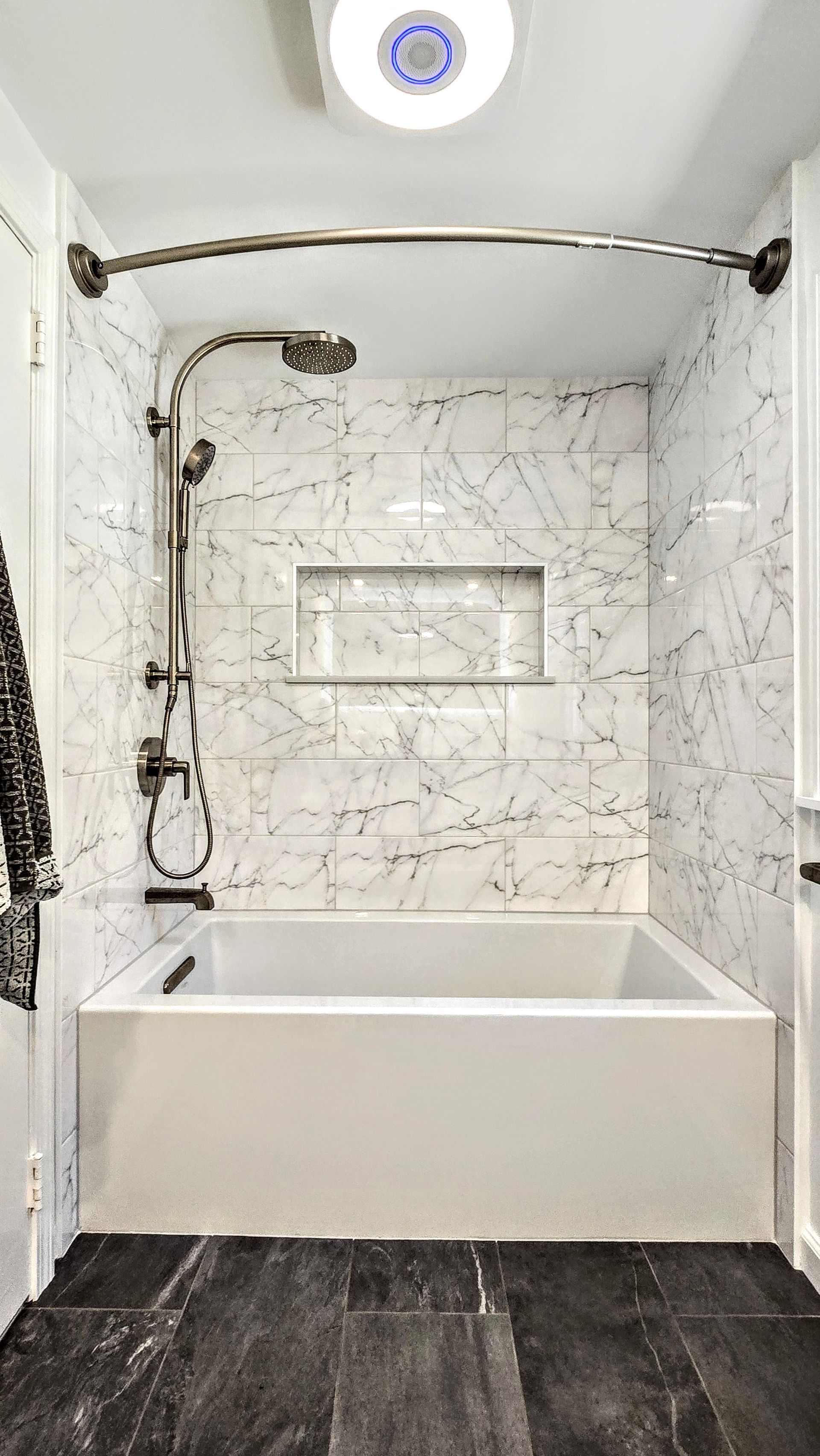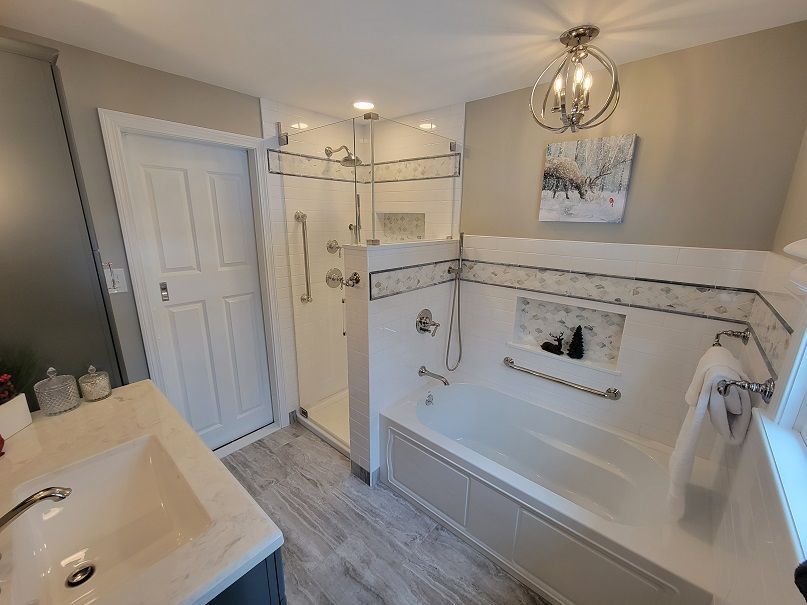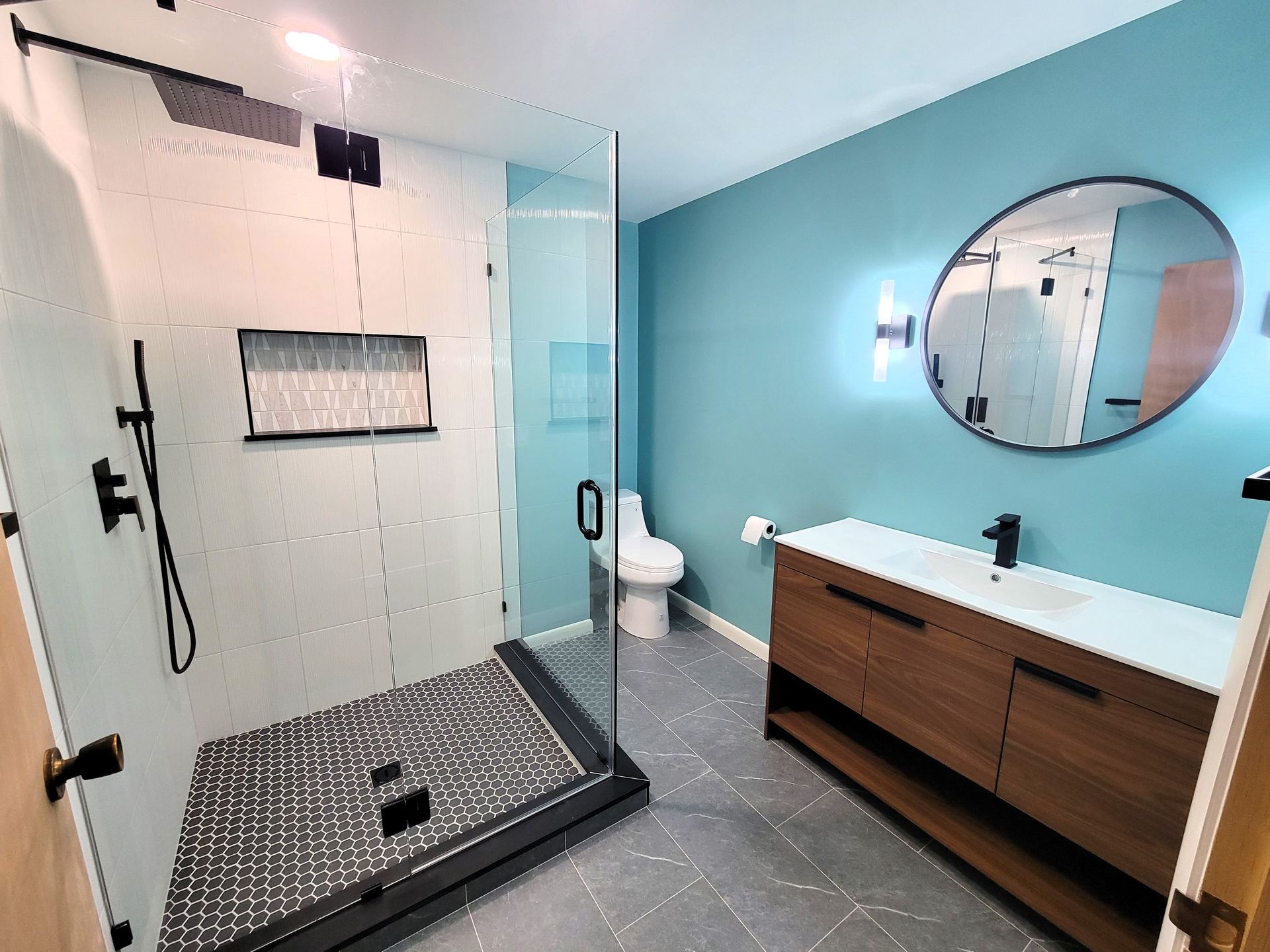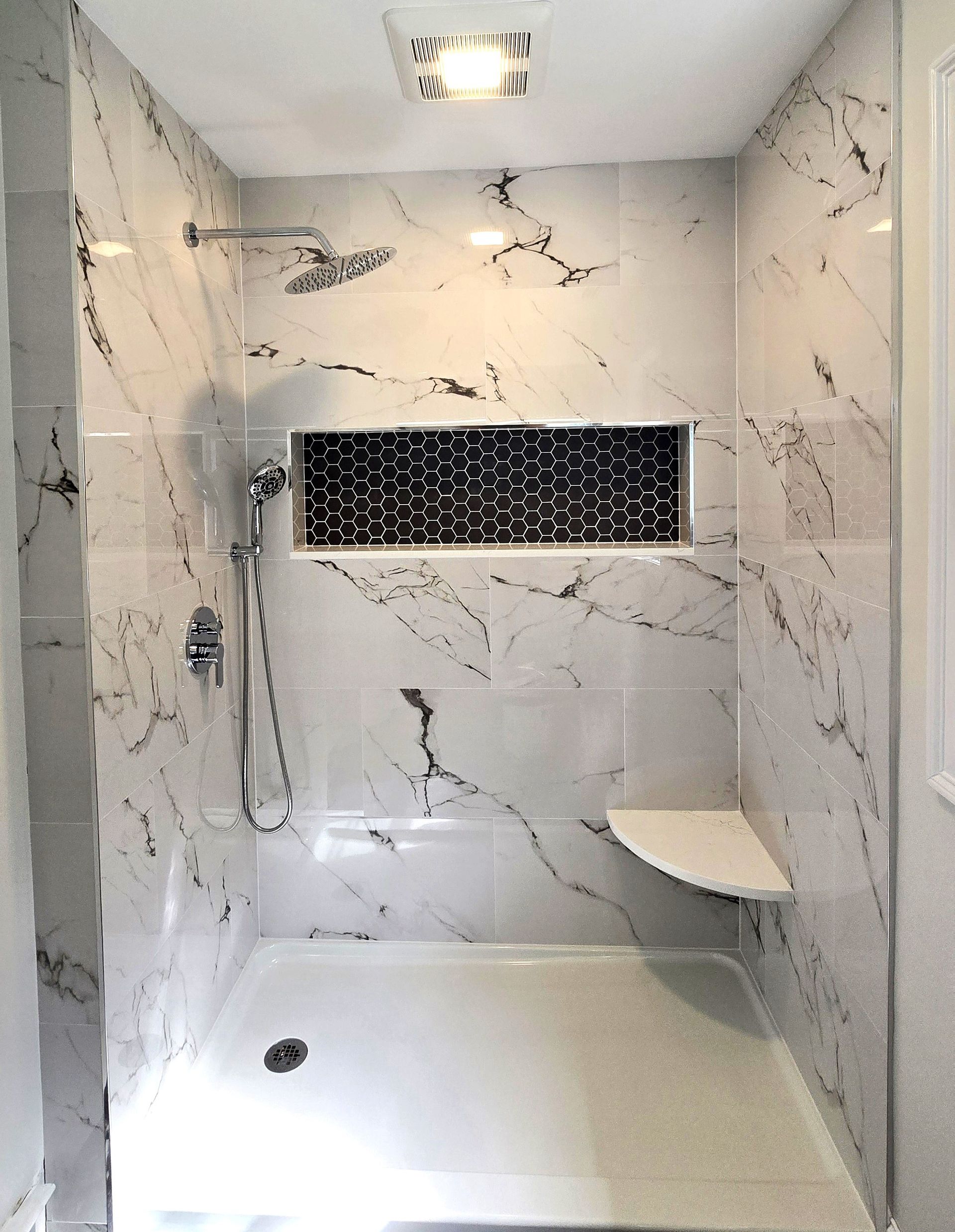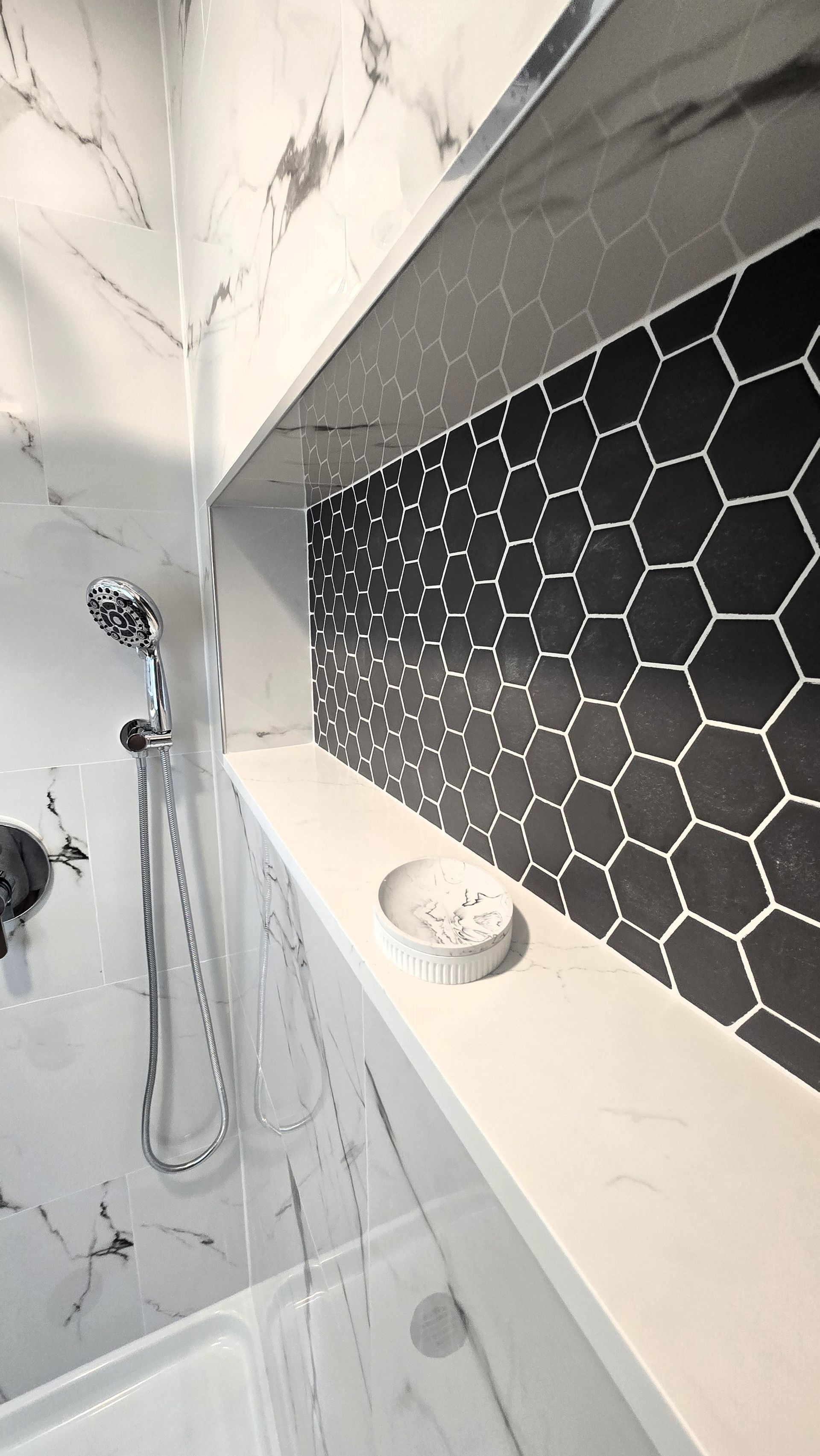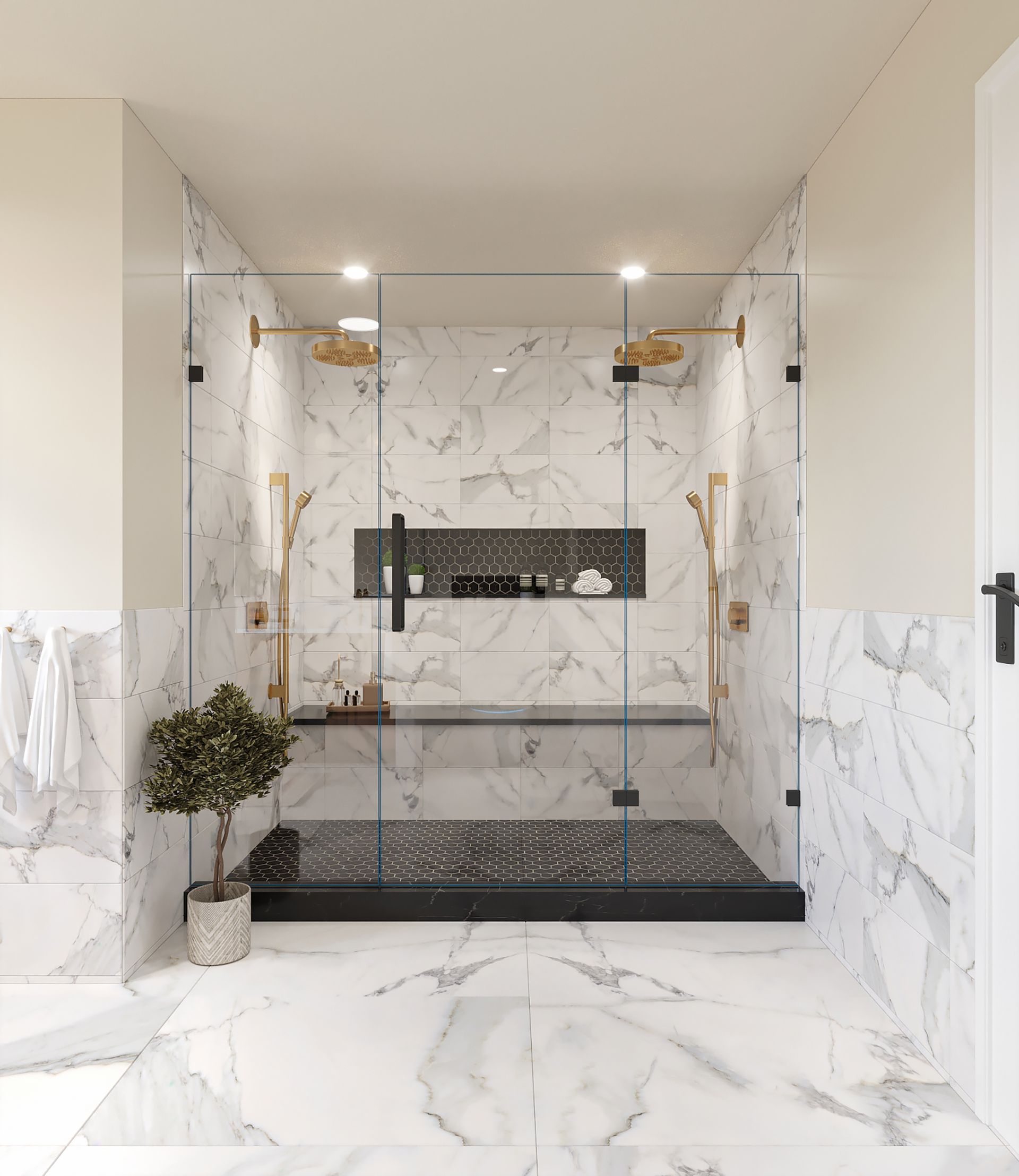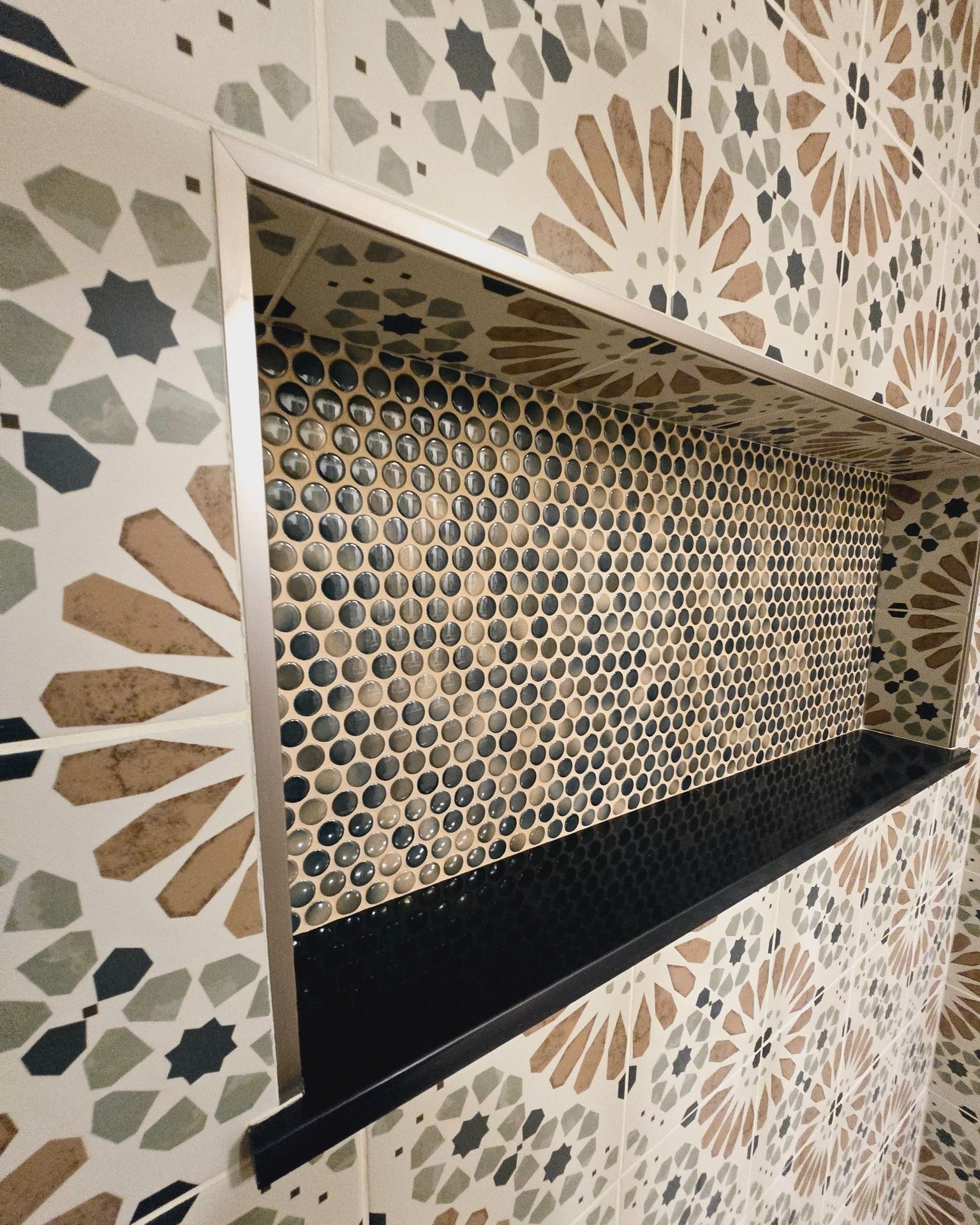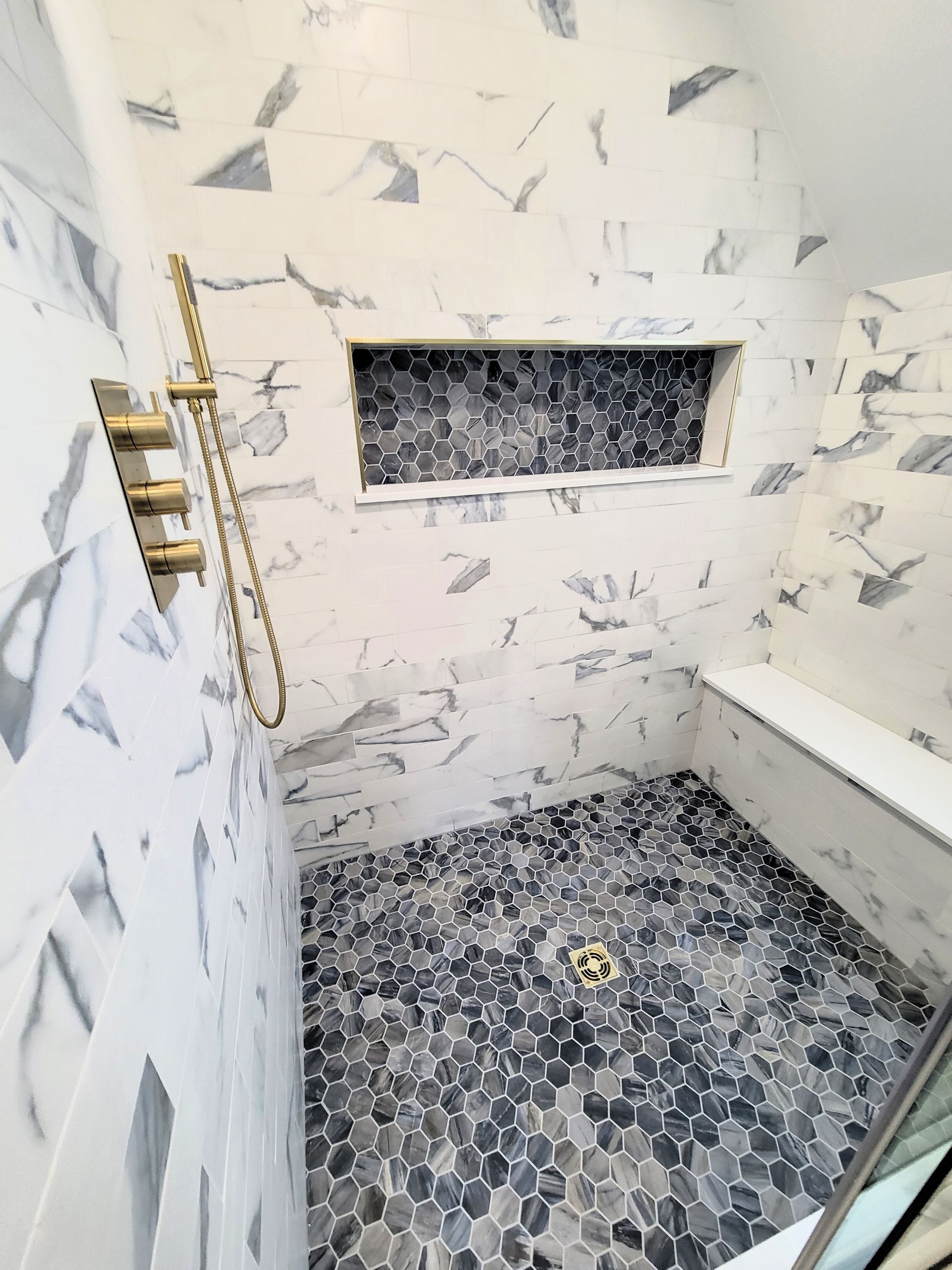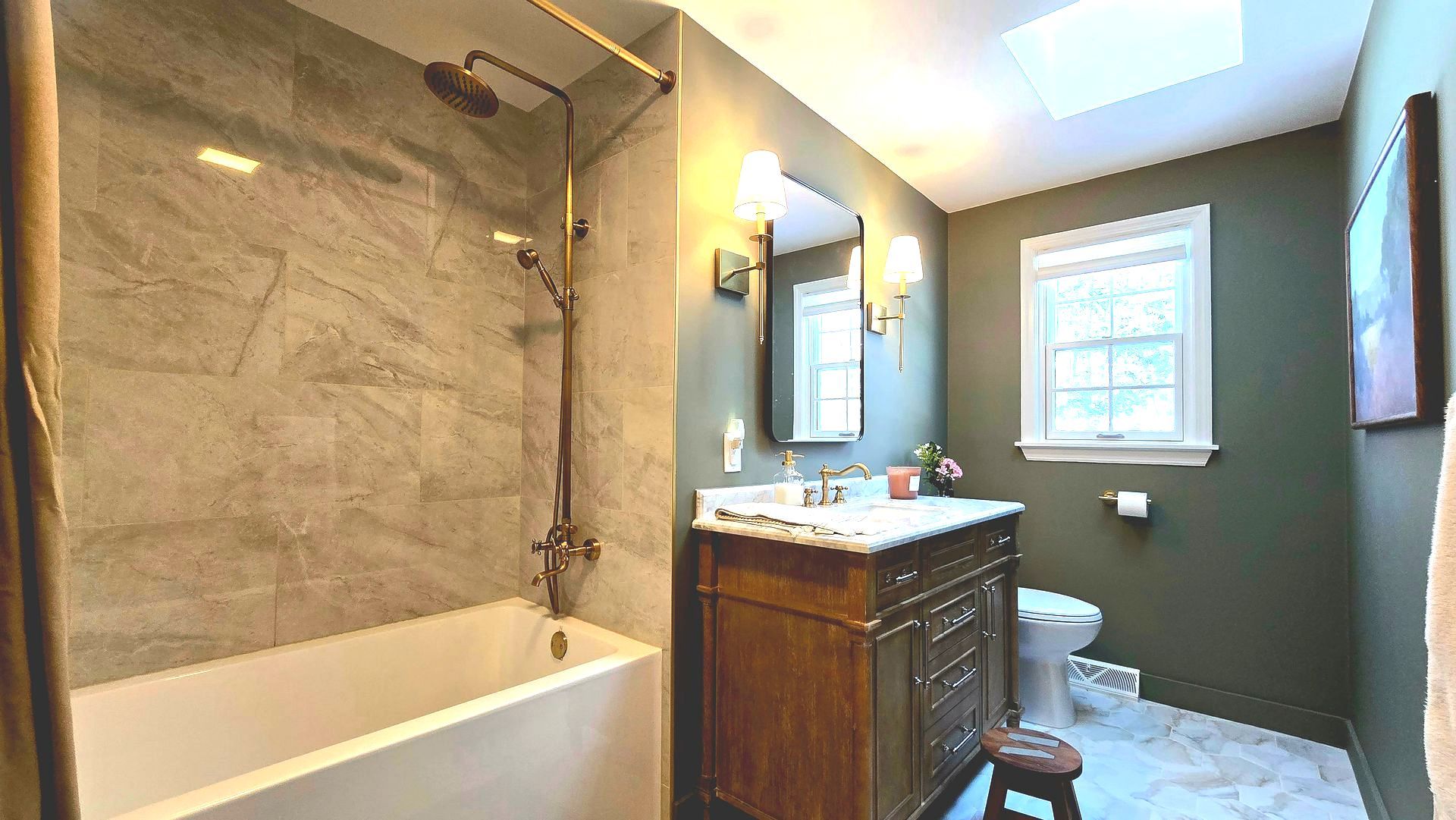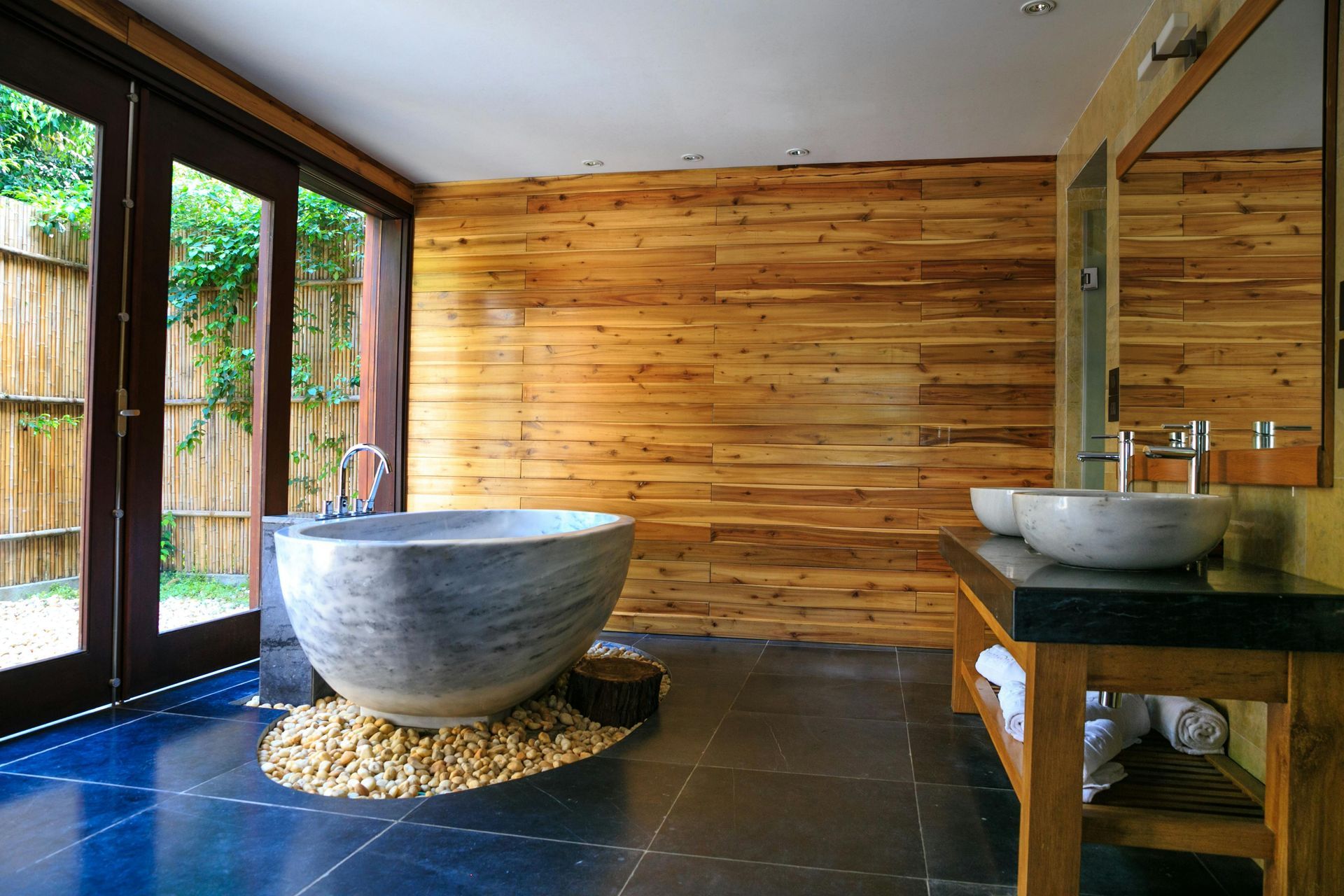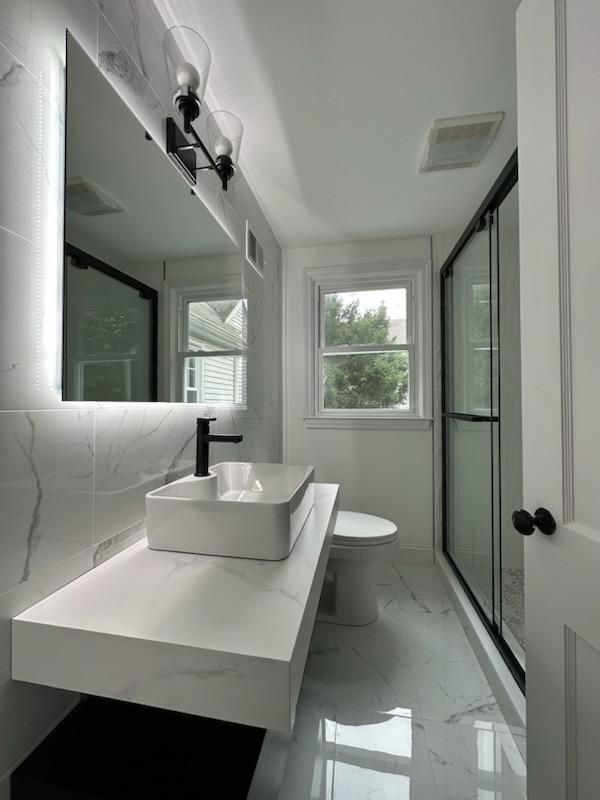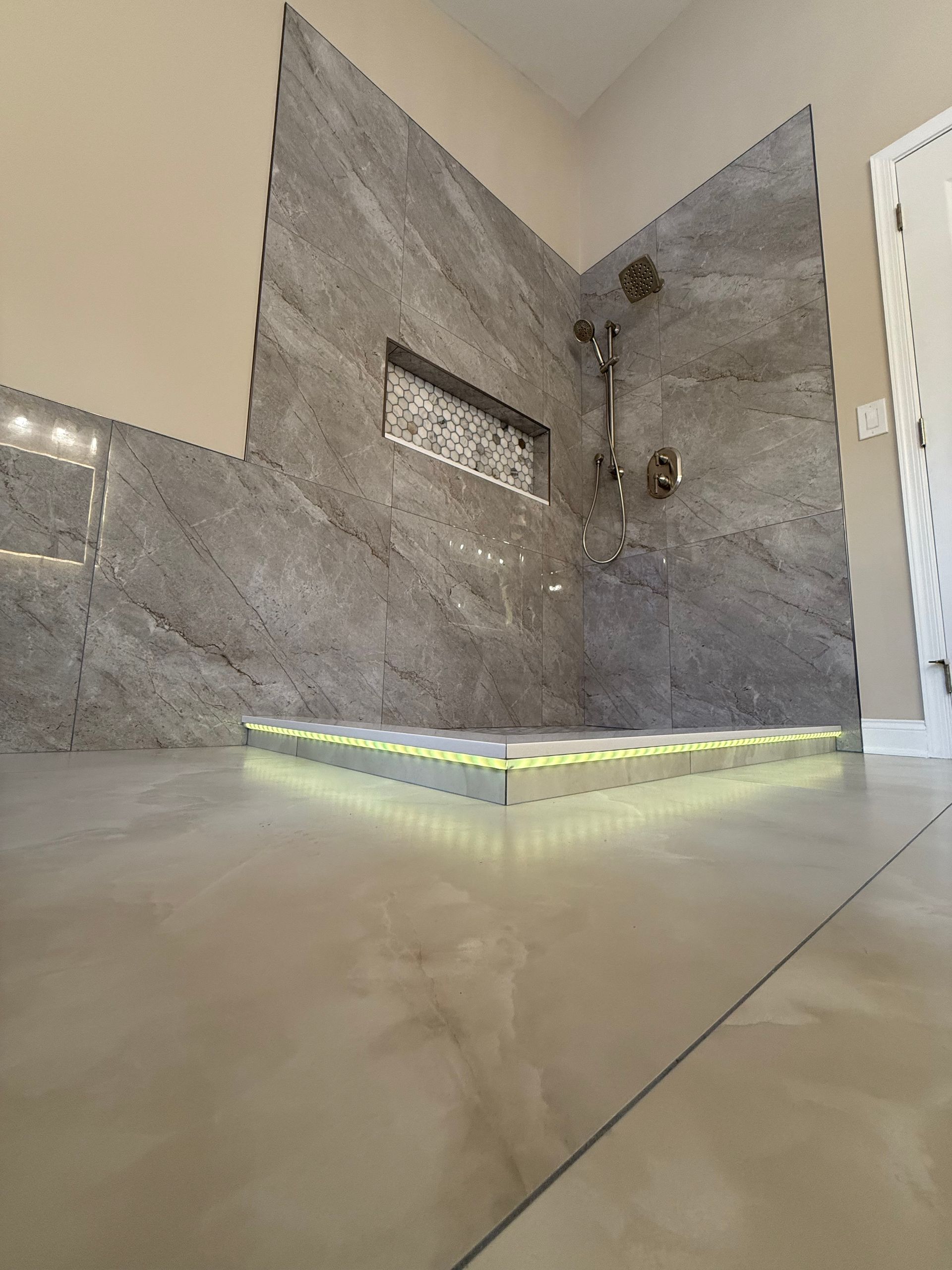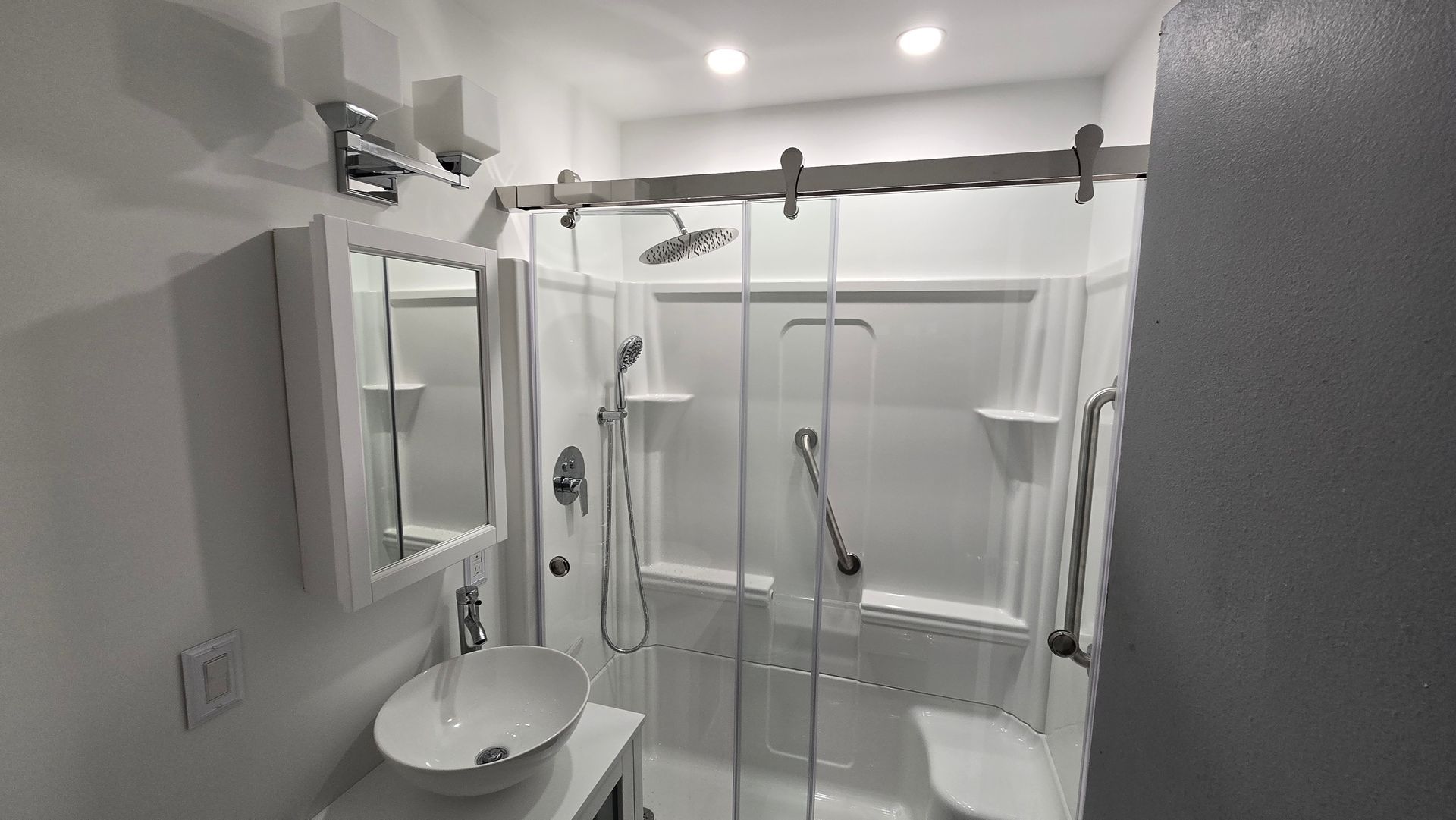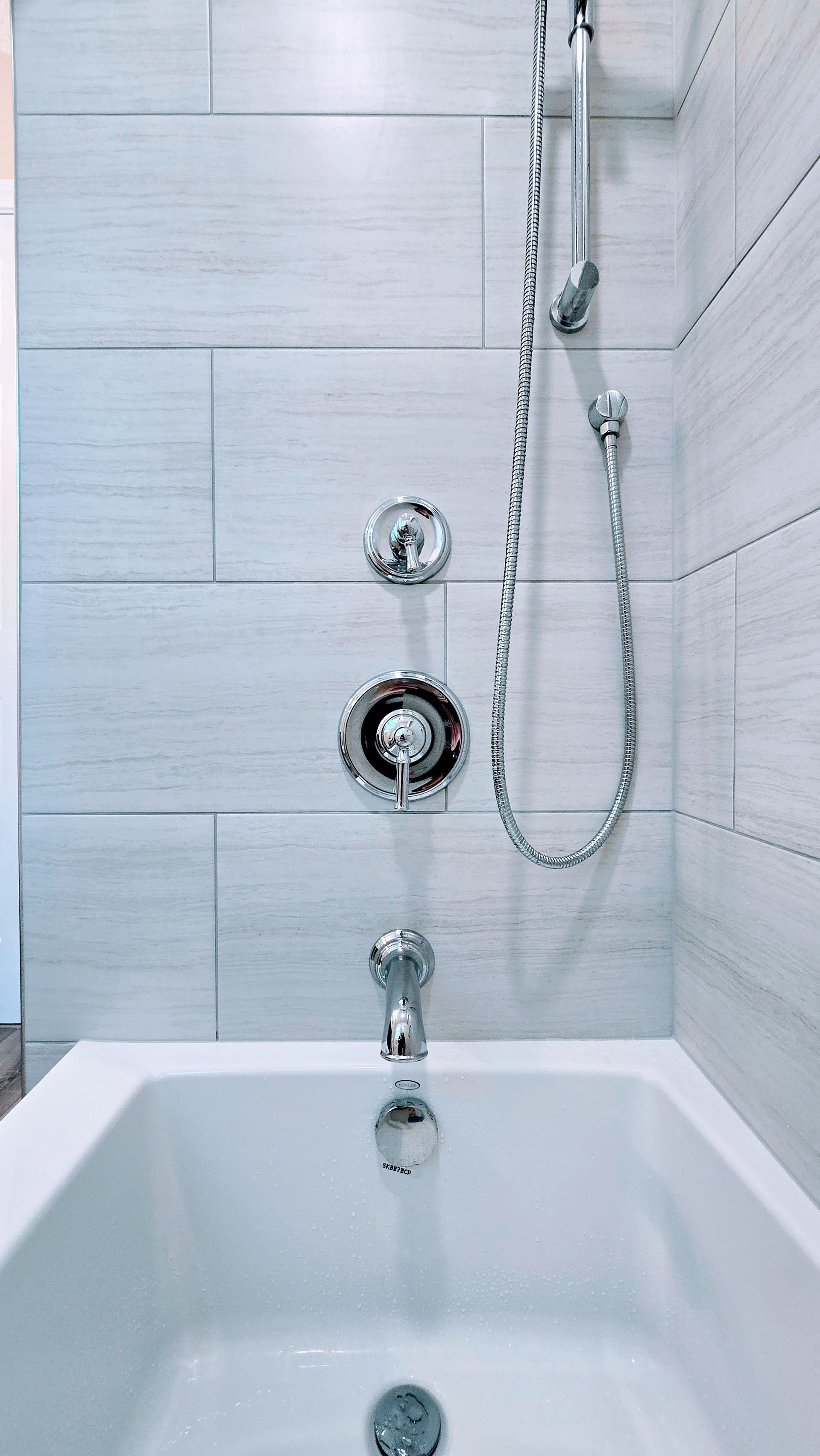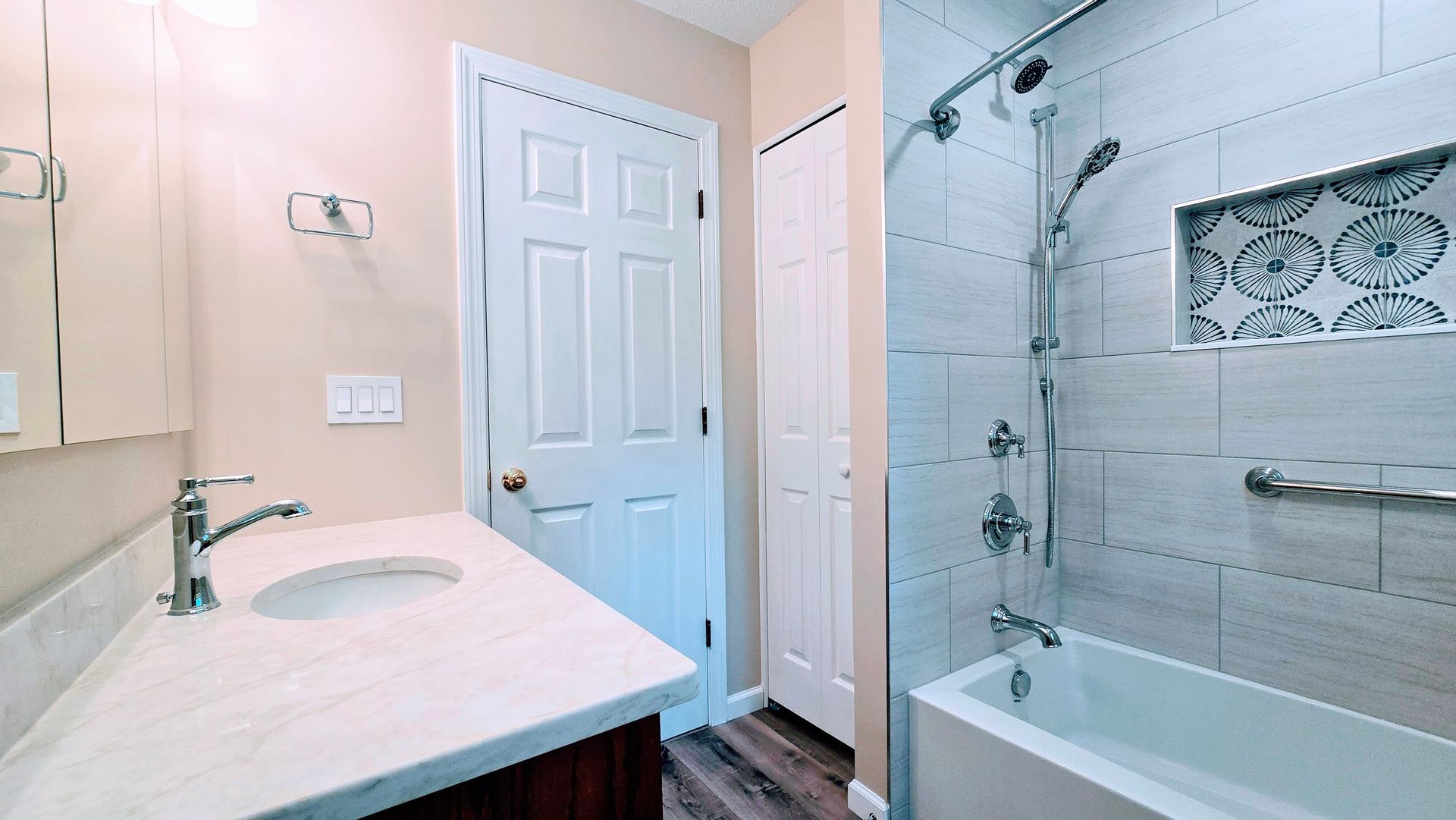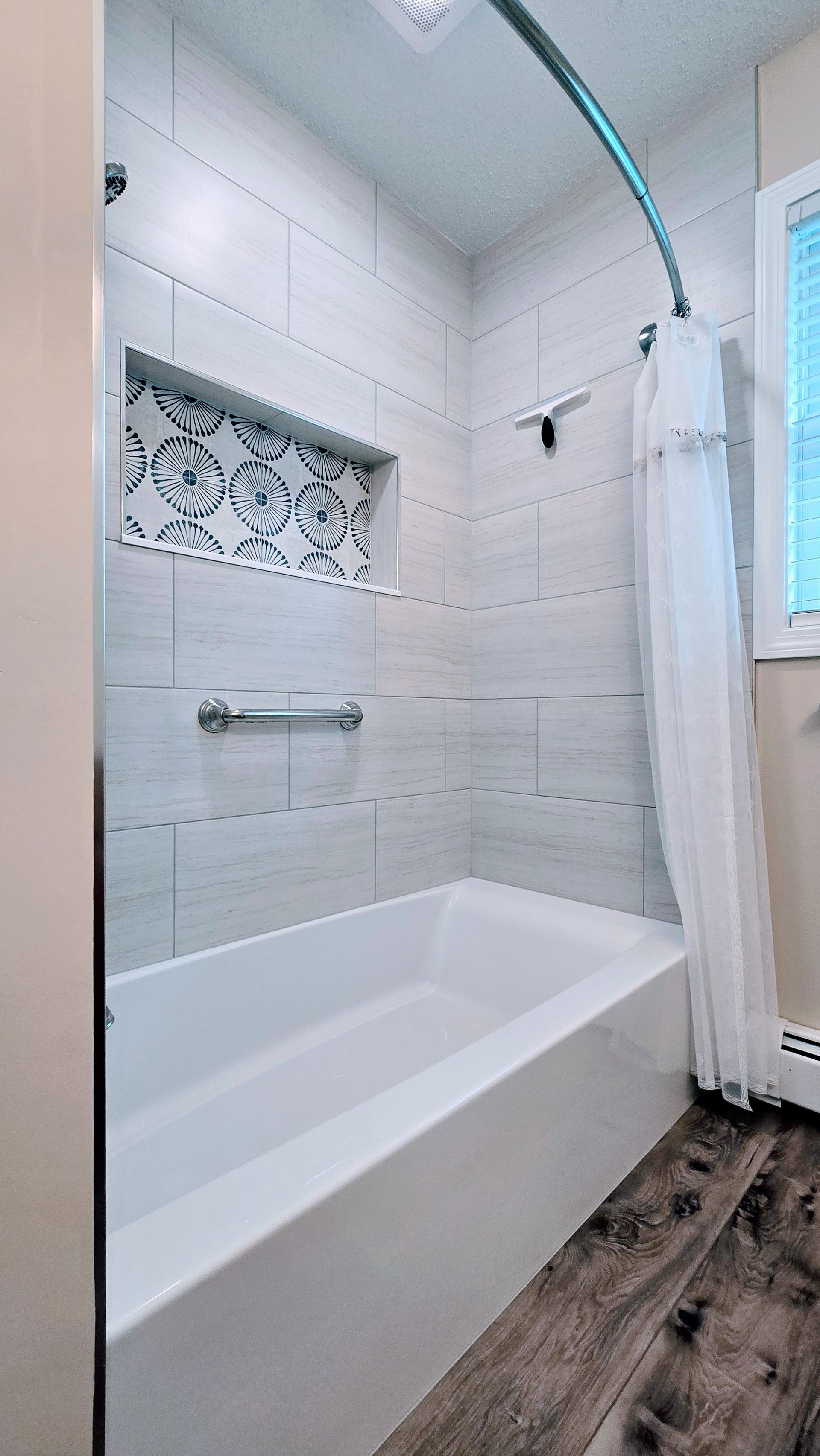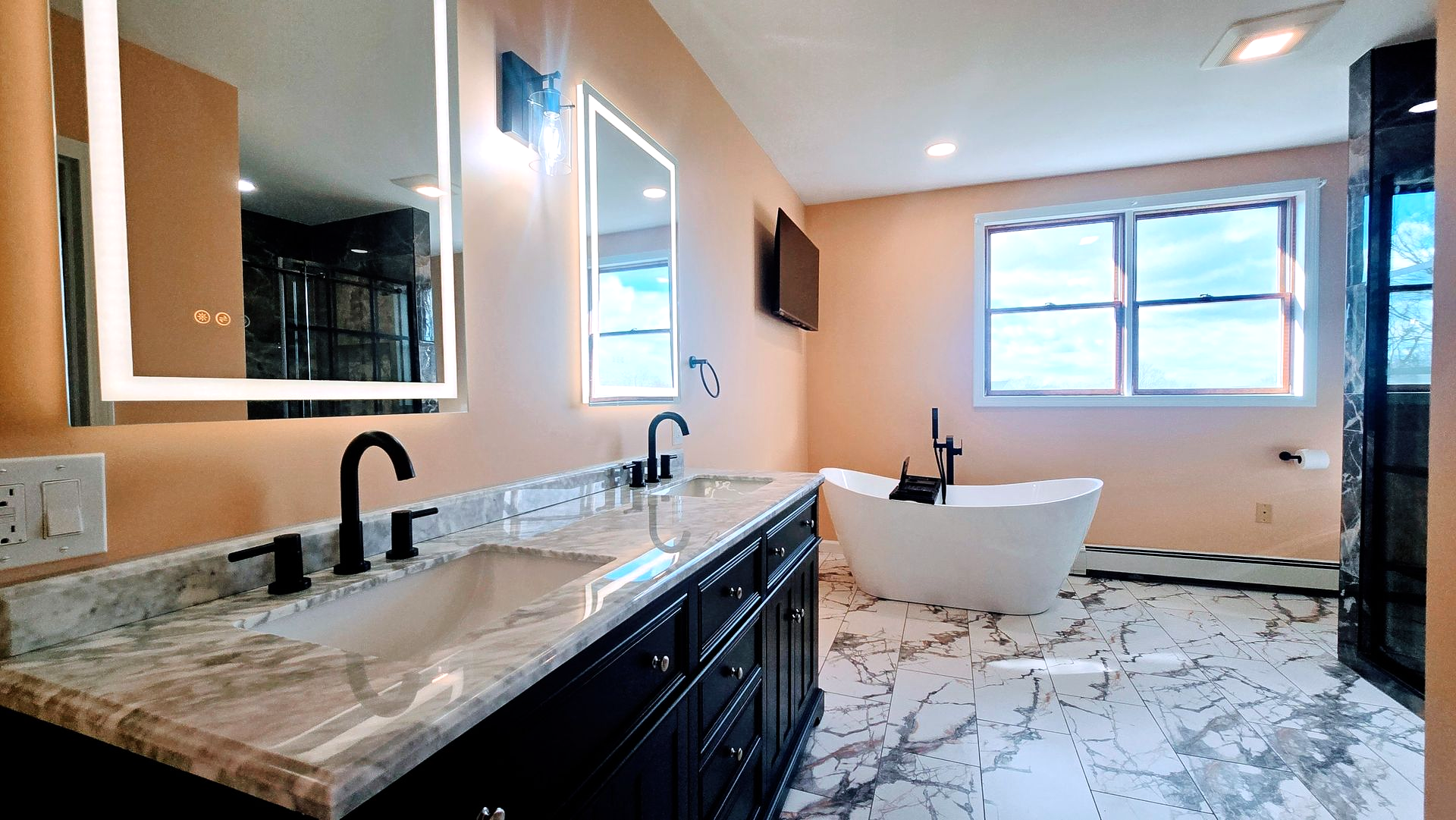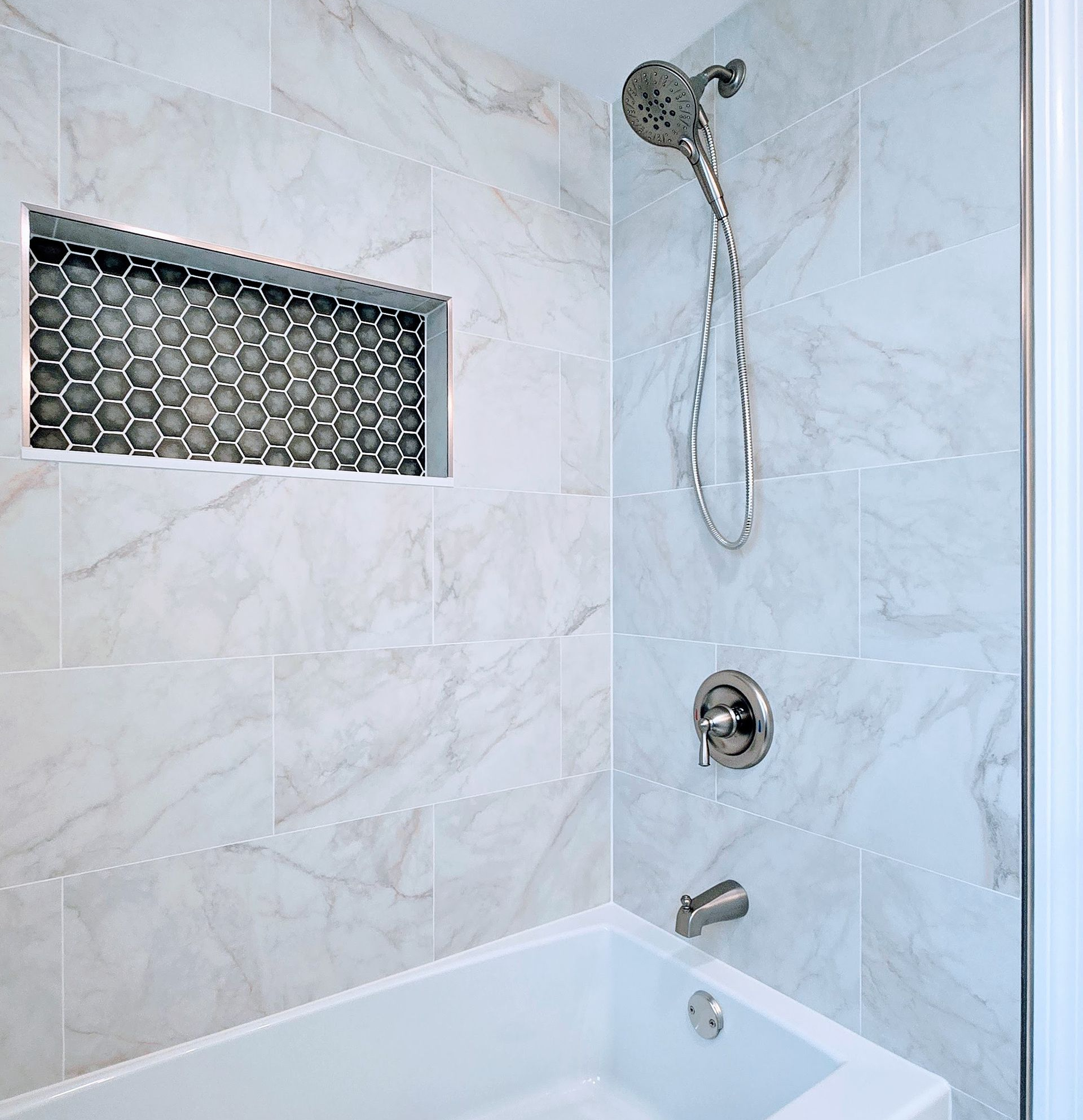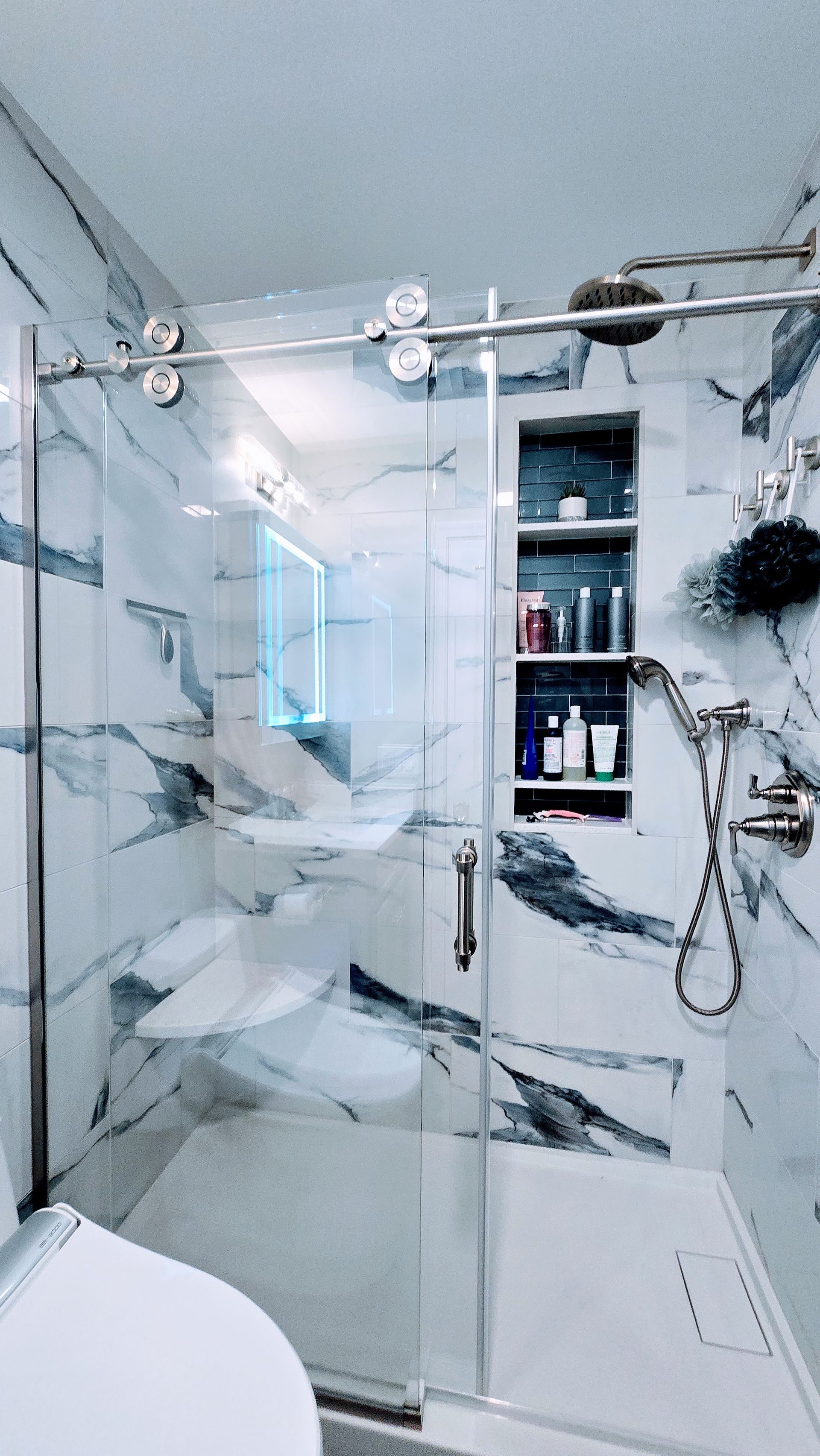Renovation of Bathroom Cost Guide (2024)
Renovation of Bathroom Cost Guide (2024)
The cost of an average bathroom remodel typically ranges between $6,622 and $16,744 for most homeowners. However, for houses built around the 1950s and earlier with plaster walls, the costs can be significantly higher, often doubling the average expense. The overall expense is influenced by various elements such as your bathroom’s dimensions, the scope of the renovation work required, and the geographical location of your residence. This guide aims to clarify what contributes to the total cost associated with renovating a bathroom while offering advice on how to manage expenses effectively to stay within budget constraints.

Key Takeaways
- The national average bathroom remodel cost is around $11,365, with projects typically ranging between $6,622 to $16,744, influenced by factors such as bathroom size, renovation scope, and geographic location.
- Key cost factors include age and bathroom size, with per square foot costs ranging from $70 to $250 or higher for custom features, and the extent of the renovation, with full remodels being more expensive than partial updates.
- Labor and permit costs constitute a significant part of the budget, ranging from 40% to 65% of total expenses, while additional costs such as plumbing and electrical work, water damage repair, and accessibility upgrades can substantially increase overall costs.
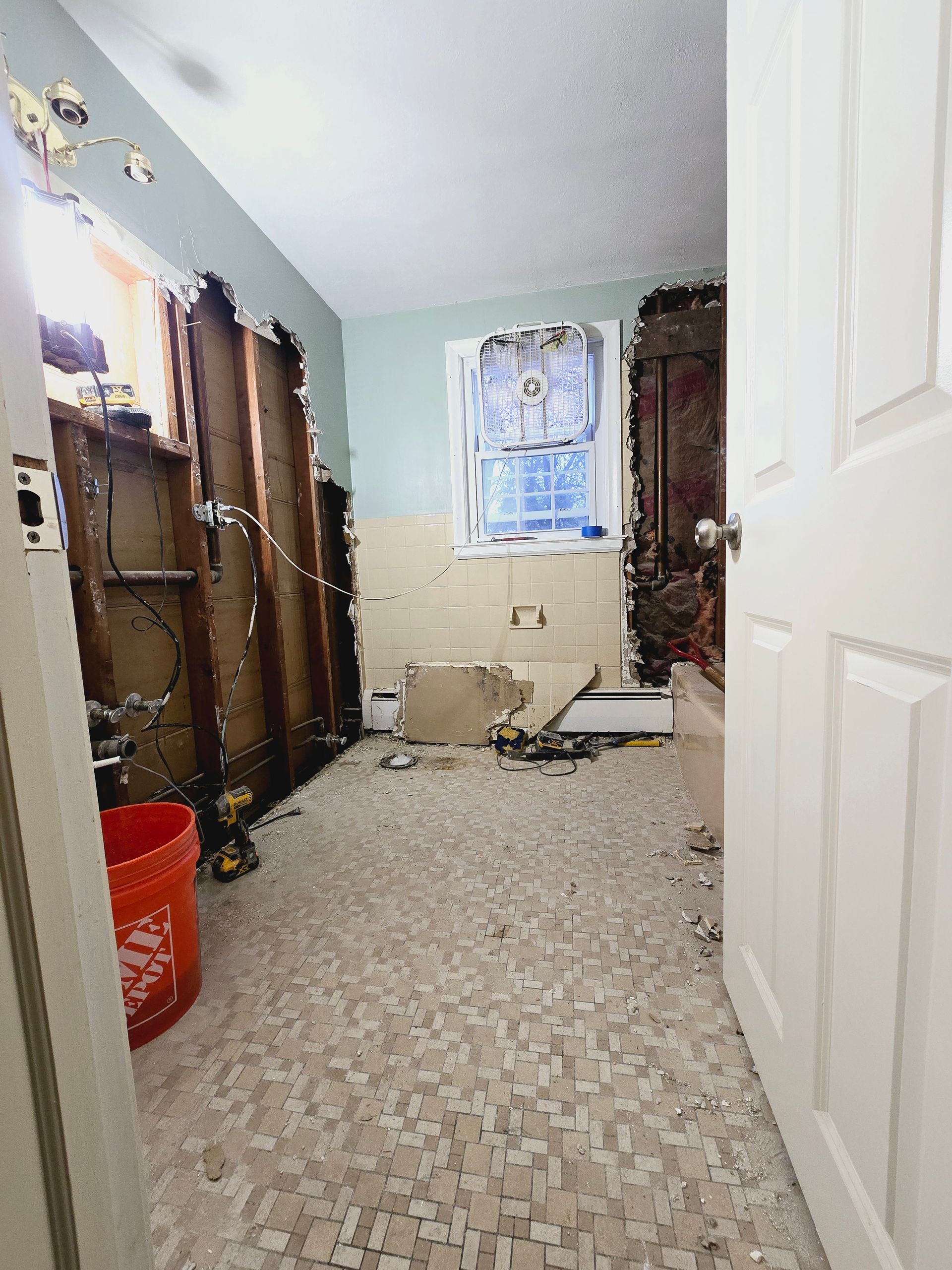
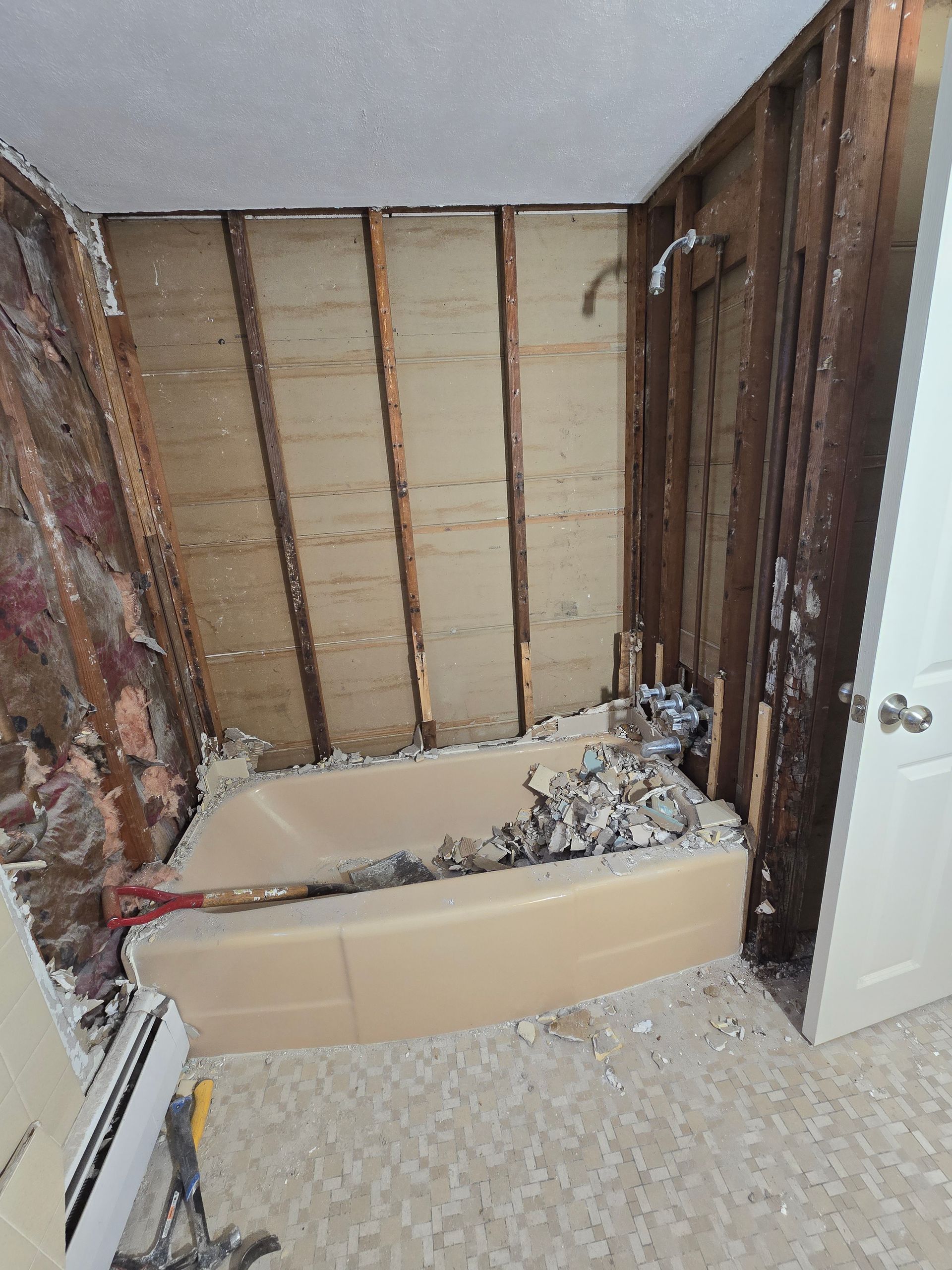
Renovation of Bathroom Cost Guide (2024)
Bathroom renovation expenses can vary greatly from one project to another. On average, a bathroom remodel may cost about $11,365 in the United States, but this figure spans between $6,622 and $16,744. The variability is often due to differences in bathroom dimensions, the range of changes made during the renovation process, as well as regional pricing disparities.
Typically speaking, remodeling a bathroom could set you back anywhere from $70 to as much as $250 for each square foot. For expansive bathrooms with high-end customization, these costs might surge beyond $600 per square foot. In terms of averages based on space size, expect approximately an outlay of either around or between “$5” “0”00 up 100-$200 per given unit area. While that depends on structural integrity, multiple reports point towards standings mean firmly fixturing somewhere middle aligns closely metrics.
Developing a comprehensive understanding of these statistics is crucial when piecing together fitting planned expenditures. When eyeing what’s standard general population plan gird wallets expenditures potentially ascending heights ranging lower scale steep pinnacle total sum factored elements like footprint extent work scope personalization finishings decide insert their domicile.
To estimate your own bath refurbishment effectively consider specific zones intending upgrade choices Material types desire integrate present overview aims dissect aspects plus offer strategic approaches maintain purse strings tight control throughout duration endeavor.
Introduction
Introduction
Renovating your bathroom goes beyond following a trend. It represents a smart investment that can both elevate the value and utility of your home. This handbook will lead you through essential considerations regarding the cost, furnish an in-depth analysis of financial outlays, and equip you with strategies to economize on your bathroom remodel.
Given how quickly bathrooms can become outdated coupled with advances in fixtures that promote better hygiene and added convenience, there is little surprise at the popularity of bathroom remodels throughout America. This guide ensures you’re well-informed about average expenses while also addressing potential additional costs associated with plumbing and electrical modifications.
Embark on this journey as we explore professional bathroom renovation—the ins and outs, dos and don’ts—ensuring successful upgrades to these vital spaces within our homes.
Understanding Bathroom Renovation Costs
The cost of a bathroom renovation can be affected by multiple critical elements such as the dimensions of the room, extent and complexity of the remodel, and regional differences in pricing, leading to varying bathroom remodel costs. On average across the nation, you might expect to pay around $11,365 for a bathroom refurbishment. This figure can vary widely with expenses ranging from as little as $2,500 up to an impressive $80,000 or more. It’s important to consider these variables when budgeting your project so that you are not caught off guard by unforeseen costs.
When broken down into cost per square foot metrics, renovating a bathroom space typically falls between $70 to $250—and may escalate even further. If one opts for larger-scale bathrooms replete with bespoke features. The final total price tag is also heavily influenced by factors like size of your restroom area along with both material selections and how comprehensive your remodeling plans are designed to be. All will contribute significantly towards understanding what full expense breakdown looks like on individual basis.
Bathroom Size
The size of the bathroom plays a pivotal role in establishing the cost for a bath remodel. Smaller bathrooms lead to lesser overall expenses, whereas larger ones with bespoke features can cause costs to soar. Bathroom remodels typically span from $70 to $250 per square foot. This figure can escalate beyond $600 for expansive and tailor-made primary bathrooms.
For instance, overhauling a compact bathroom might set you back anywhere between $3,125 and $6,000—or even as low as approximately $2,500 in some cases. In stark contrast, a comprehensive renovation of an extensive primary bathroom could demand between $60,000 and $80k. A medium-sized bathroom’s makeover would likely incur charges that lie somewhere mid-spectrum depending on the chosen materials and fixtures.
Recognizing how much influence the dimension of a restroom has on its revamping expenditure is crucial when devising your financial plan. Whether it’s giving minor facelifts such as changing tiles or grout lines or opting for an overhaul including plumbing installations—to keep abreast with project feasibility, account must be taken into space being worked upon.
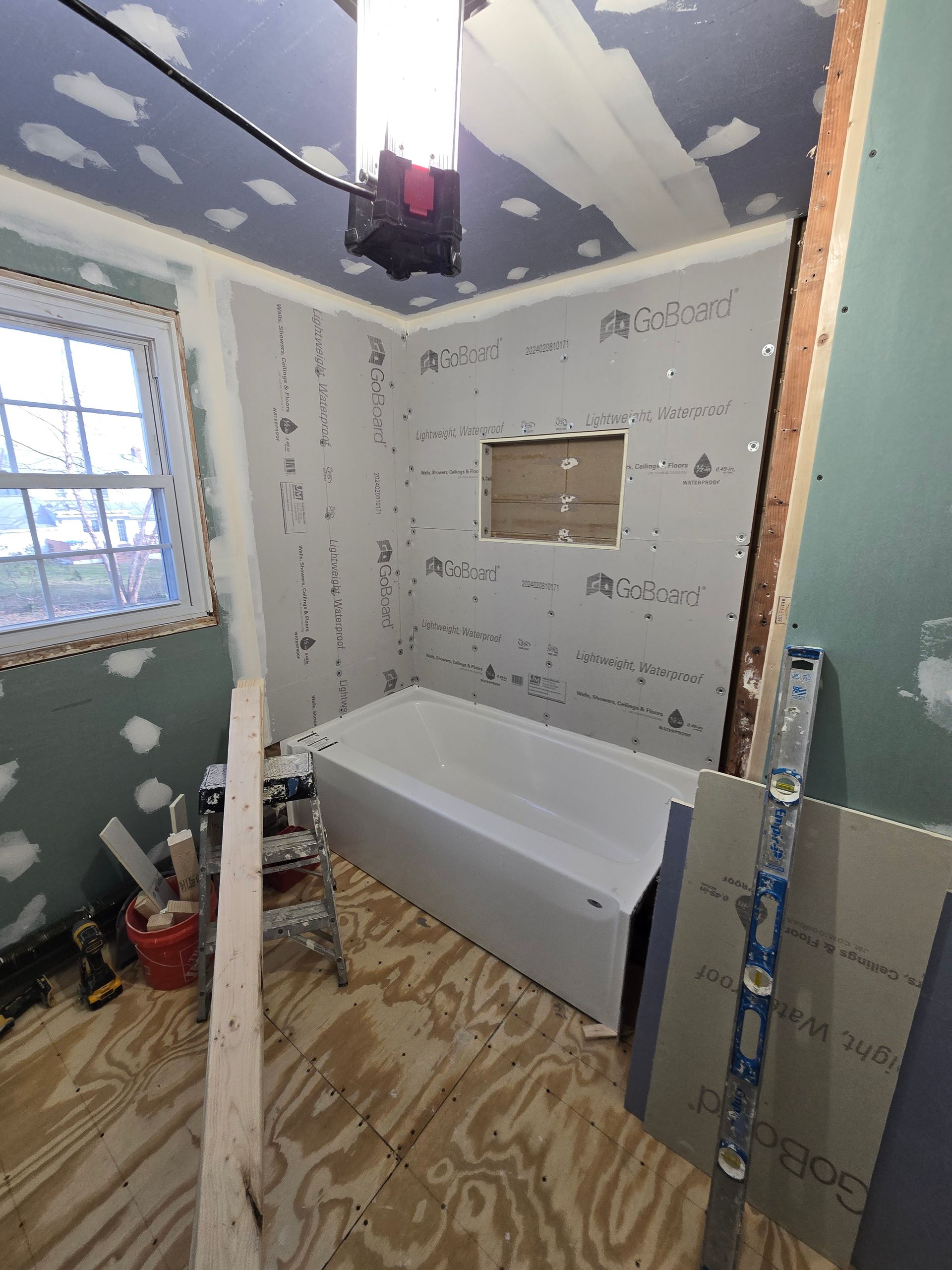
Bathroom Size
The size of the bathroom plays a pivotal role in establishing the cost for a bath remodel. Smaller bathrooms lead to lesser overall expenses, whereas larger ones with bespoke features can cause costs to soar. Bathroom remodels typically span from $70 to $250 per square foot. This figure can escalate beyond $600 for expansive and tailor-made primary bathrooms.
For instance, overhauling a compact bathroom might set you back anywhere between $3,125 and $6,000—or even as low as approximately $2,500 in some cases. In stark contrast, a comprehensive renovation of an extensive primary bathroom could demand between $60,000 and $80k. A medium-sized bathroom’s makeover would likely incur charges that lie somewhere mid-spectrum depending on the chosen materials and fixtures.
Recognizing how much influence the dimension of a restroom has on its revamping expenditure is crucial when devising your financial plan. Whether it’s giving minor facelifts such as changing tiles or grout lines or opting for an overhaul including plumbing installations—to keep abreast with project feasibility, account must be taken into space being worked upon.
Scope of Renovation
The total cost of a bathroom remodel is greatly influenced by the extent of the renovation. If you’re undertaking a full bathroom remodel, you can expect to make substantial modifications to both the layout and plumbing systems. On the other hand, partial renovations may simply update elements such as cabinets and fixtures without major structural changes. The nature and scale of the updates—cosmetic tweaks versus complete revamps—play a key role in affecting overall expenses.
If your plans include altering your current bathroom’s layout through demolition work, costs typically range from $900 to $3,000. Should your project require more drastic alterations like expanding or completely reworking the floor plan, additional expenditures starting at around $5,000 could be anticipated—and they might climb even higher depending on complexity and specifications. For those contemplating changing their bathtub into a shower set-up should budget between $1,100 and $7,000. It’s crucial to consider this aspect when calculating shower style average costs within your financial planning.
Opting for an updated aesthetic with new tiles, countertops or cabinetry can often prove more economical if only material enhancements are needed rather than significant configuration adjustments. This path allows for refreshing your space while keeping expenditure down—a smart way forward that still transforms its appearance effectively. An understanding of what kind of heftier undertakings will have on one’s wallet enables better decision-making processes regarding scope choices which ultimately contributes to efficient budget management throughout renovation projects.
Geographic Location
The cost of a renovation can be significantly influenced by the geographic location due to the regional variations in material and labor costs. For instance, renovating a bathroom at a mid-range level may cost about $23,000 in Alabama while exceeding $31,000 in Californian cities like Los Angeles or San Francisco.
Speaking, areas with higher living expenses tend to reflect elevated remodeling costs as well. In Los Angeles, you might expect to pay up to $25,600 for such renovations whereas Chicago’s top-end prices reach around $13,600. Understanding these differences across regions is crucial for accurate budgeting and avoiding financial surprises during your bathroom remodel process.
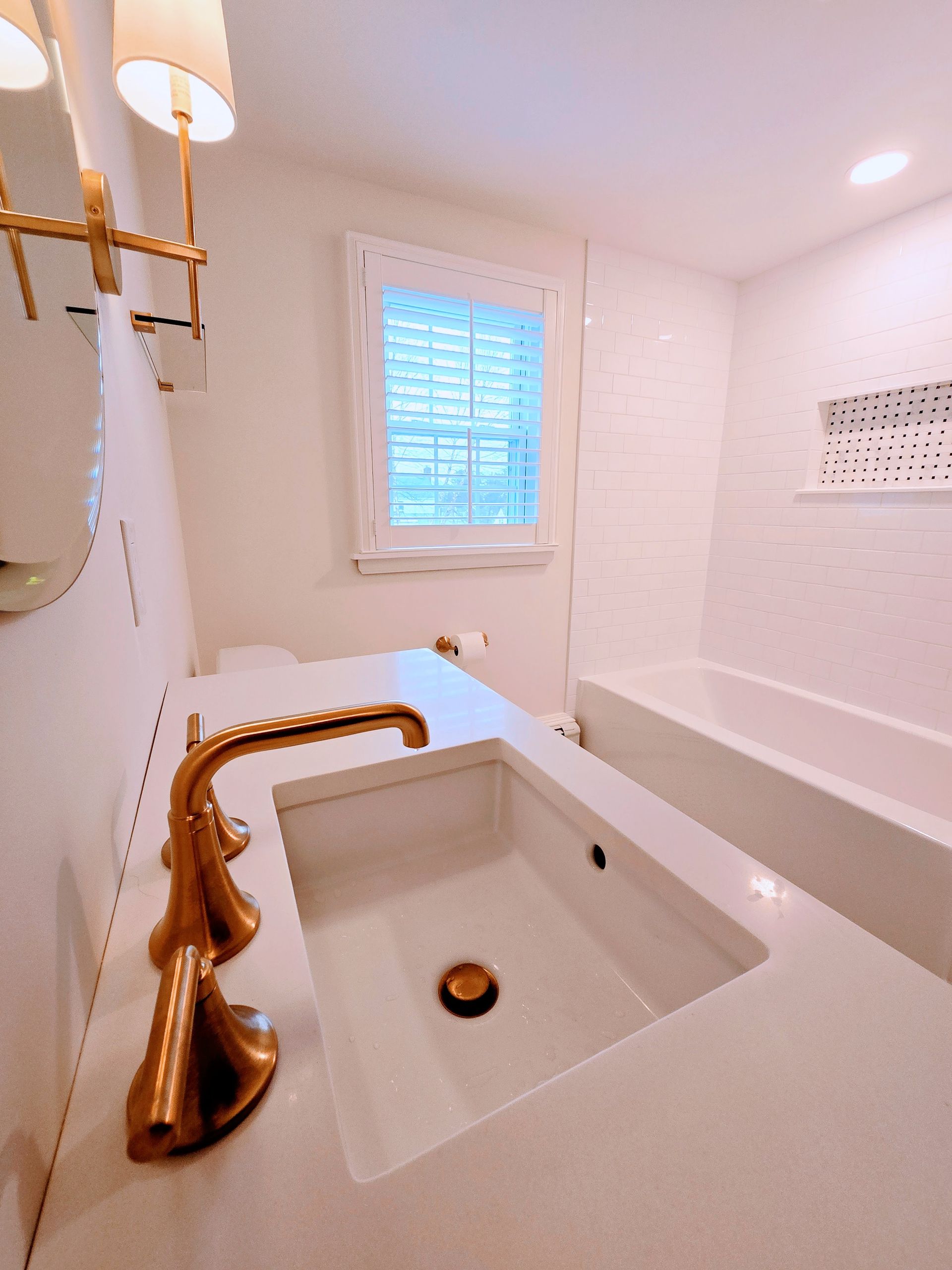
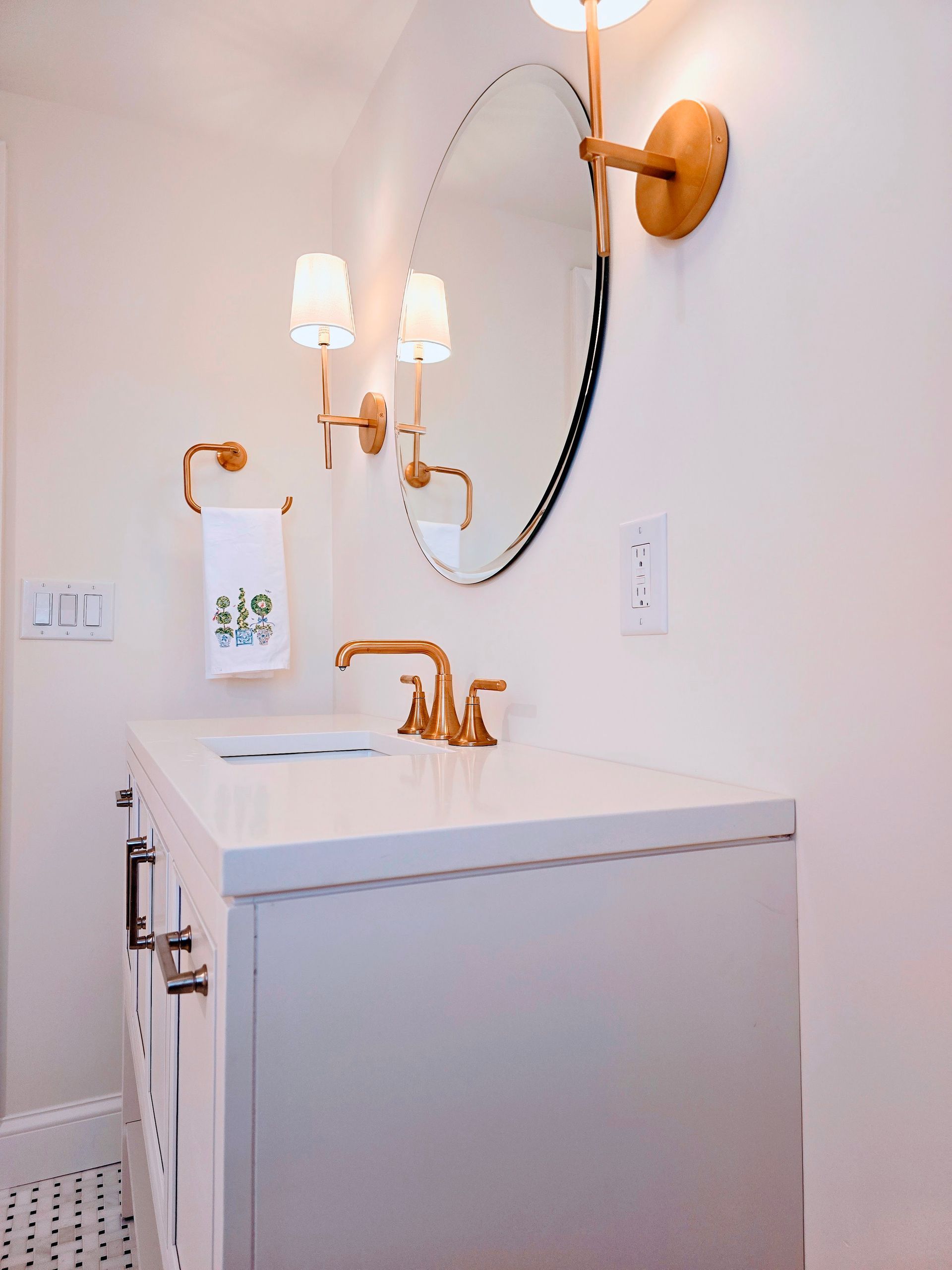
Scope of Renovation
The total cost of a bathroom remodel is greatly influenced by the extent of the renovation. If you’re undertaking a full bathroom remodel, you can expect to make substantial modifications to both the layout and plumbing systems. On the other hand, partial renovations may simply update elements such as cabinets and fixtures without major structural changes. The nature and scale of the updates—cosmetic tweaks versus complete revamps—play a key role in affecting overall expenses.
If your plans include altering your current bathroom’s layout through demolition work, costs typically range from $900 to $3,000. Should your project require more drastic alterations like expanding or completely reworking the floor plan, additional expenditures starting at around $5,000 could be anticipated—and they might climb even higher depending on complexity and specifications. For those contemplating changing their bathtub into a shower set-up should budget between $1,100 and $7,000. It’s crucial to consider this aspect when calculating shower style average costs within your financial planning.
Opting for an updated aesthetic with new tiles, countertops or cabinetry can often prove more economical if only material enhancements are needed rather than significant configuration adjustments. This path allows for refreshing your space while keeping expenditure down—a smart way forward that still transforms its appearance effectively. An understanding of what kind of heftier undertakings will have on one’s wallet enables better decision-making processes regarding scope choices which ultimately contributes to efficient budget management throughout renovation projects.
Geographic Location
The cost of a renovation can be significantly influenced by the geographic location due to the regional variations in material and labor costs. For instance, renovating a bathroom at a mid-range level may cost about $23,000 in Alabama while exceeding $31,000 in Californian cities like Los Angeles or San Francisco.
Speaking, areas with higher living expenses tend to reflect elevated remodeling costs as well. In Los Angeles, you might expect to pay up to $25,600 for such renovations whereas Chicago’s top-end prices reach around $13,600. Understanding these differences across regions is crucial for accurate budgeting and avoiding financial surprises during your bathroom remodel process.
Breakdown of Bathroom Renovation Expenses
Dissecting the bathroom remodeling costs can provide clarity on where your finances are allocated and assist in budget management. Undertaking bathroom renovations requires considerable investment, often due to substantial material costs for essential items like the bathroom vanity, countertops, and tiling—particularly within wet areas of the space. While these components play key roles in both functionality and design appeal of a renovated bathroom, they have a noticeable effect on total expenditure.
The largest portion of expenses is attributed to labor. When breaking down the financial aspects, one would typically categorize them into:
- The wet area which includes elements such as tubs, walk-in showers, and wall surrounds
- Various fixtures and fittings
- Floor coverings alongside wall tiling
- Storage solutions like cabinets as well as surfaces including countertops
Diving deeper into each cost category offers greater insight into how funds are dispersed throughout the project’s execution.
Fixtures and Fittings
The inclusion of fittings such as sinks, toilets, and faucets can significantly influence the expense of renovations. The section of a bathroom most associated with moisture—the wet area—typically houses the bathtub and shower configurations along with their surrounding walls. When it comes to replacement, choosing pre-manufactured showers or bathtubs is typically more budget-friendly than opting for customized versions.
Purchasing a new bathtub may cost anywhere from $600 for an uncomplicated alcove tub to upwards of $5,000 for models equipped with jet features. Prices vary broadly when it comes to common types of bathroom sinks.
- Wall-mounted sinks might set you back around $350
- Pedestal varieties tend approximately toward the $500 mark
- You could spend about $1,000 on drop-in styles
- Vessel options escalate in price up to about $5,000
When installing a new toilet, one might anticipate average costs circling roughly at the figure of $375.
Mounting faucets can come with expenses ranging from modest sums like $40 all through sweeping figures that exceed even$750. Sinks crafted by artisans or mosaic tiles custom-forged have significant potential in spiking renovation expenditures just as unique cabinetry choices do. Likewise imported materials hold similar weight financially speaking, hence understanding these pricings will aid in making fitting selection aligns suitably within your financial scope.
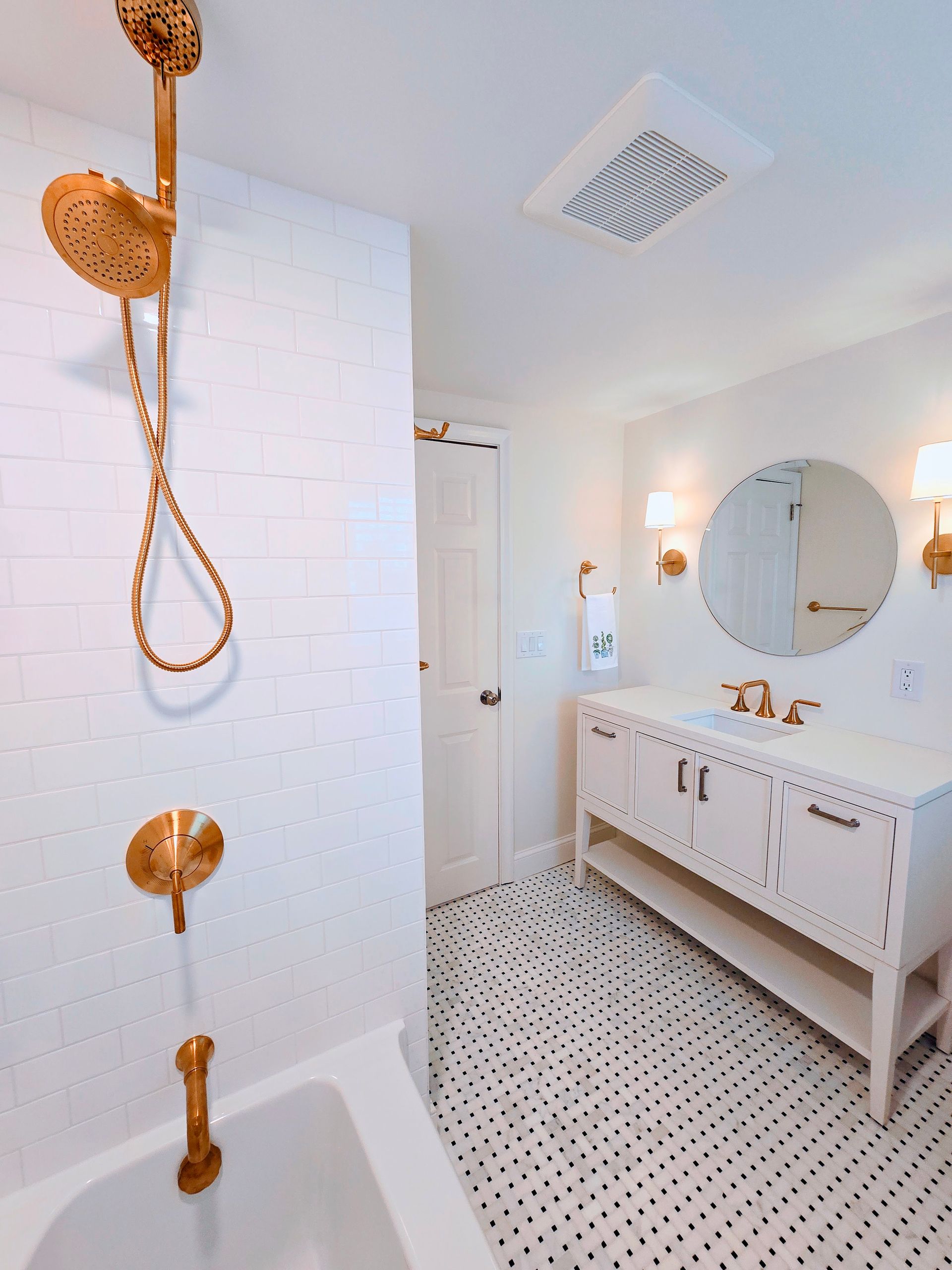
Labor and Permit Costs
The expense of flooring and tiling is influenced by the selected materials and the dimensions of your bathroom. Flooring materials for a bathroom have a price spectrum ranging from $2 to $22 per square foot, while tile prices alone span from $0.50 to $35 per square foot.
Retiling a bathroom typically averages at about $12.50 per square foot in costs. Options for upscale bathroom enhancements include installing radiant heated floors, embedding a sound system into the walls, and integrating various features with smart-home technology systems. Selecting appropriate flooring and tiling options is vital for maintaining control over your financial plan.
Cabinets and Countertops
The price spectrum for cabinets and countertops spans from economical, off-the-shelf models to bespoke creations that come with heftier costs. The expense of ready-to-assemble cabinets falls between $50 to $200 per piece. For new bathroom cabinetry, the typical cost range is anticipated to be from $300 up to a considerable sum of $42,000.
Conversely, complete stock vanities which include pre-installed countertops are priced within a bracket ranging from merely $100 up to about $2,600. Custom-fabricated bathroom countertops may command prices anywhere between $500 and as much as $4,000. Often more budget-friendly than purchasing factory-made ones is the option of constructing a vanity right from scratch yourself. Gaining insight into these varying prices can significantly aid in selecting cabinetries and worktops that align well with your financial plan.
Labor and Permit Costs
Labor and permit fees comprise a considerable part of the expenses for bathroom renovations. The labor costs usually constitute about 100% to 150% of the entire cost of the project, with an average hourly rate for remodeling a bathroom falling between $75 to $100.
Contractors typically add on charges that amount to 10% to 20% of the overall project’s cost. Permit fees associated with bathroom renovation projects may vary widely from as little as $100 up to $1,000, depending on how complex the undertaking is. We will delve into comparing professional services versus do-it-yourself methods and discuss in detail about various permitting charges involved.
Hiring Professionals vs. DIY
Opting to tackle a bathroom remodel on your own can lead to substantial savings, but a professional bathroom remodel offers benefits such as faster completion, proper equipment, and peace of mind. Undertaking significant renovations might require the skill and precision of experts due to their complexity. Nevertheless, engaging in DIY activities such as painting, laying tiles or mounting light fixtures could help in cutting down those labor expenses significantly.
If you’re considering a full but modest bathroom overhaul yourself, you might find yourself keeping an extra $1,500 to $5,300 that would have otherwise gone towards professional fees. For those looking for a middle ground between cost-effectiveness and expert quality workmanship, they may consider acting as their personal project manager while subcontracting specific tasks where they lack confidence or expertise.
Diving into DIY without sufficient skills can be costly. Errors like not sealing floor or wall tiles adequately, making incorrect changes to plumbing systems or mishandling electrical wiring are potential pitfalls. When dealing with critical components such as major fixtures installation, make it a point of duty to always enlist insured plumbers and licensed electricians who guarantee both adherence to safety regulations and building codes.
Permit Fees
Fees for permits fluctuate based on the complexity of your project and the regulations specific to your locality. Acquiring a permit is commonly required for several types of home improvement tasks, including:
- Renovations in bathrooms
- Remodels in kitchens
- Finishing basements
- Construction of new rooms or additions
These permits are essential to certify that all modifications adhere to the established local building codes.
When it comes to bathroom renovations, you can expect construction permit costs to span from $100 up to $1,000. This range varies with how complex the renovation project is.
Additional Costs to Consider
Additional bathroom costs might not be immediately obvious when first budgeting. These hidden costs can encompass work on plumbing and electrics, fixing water damage, and making the space more accessible. The cost of installing a new window could potentially raise your renovation bill by $3,000 to $6,000 since it necessitates expert installation.
Also noteworthy is the financial impact of post-renovation cleanup efforts and engaging a junk removal service. These services alone may increase your overall spend by $70 to $240. Addressing unforeseen water damage during renovations has its own price tag as well – expect to pay anywhere from $3.75 to $7 per square foot for repairs. Anticipating these possible additional outlays ahead of time is crucial for thorough financial planning and sidestepping any unexpected hits to your wallet.
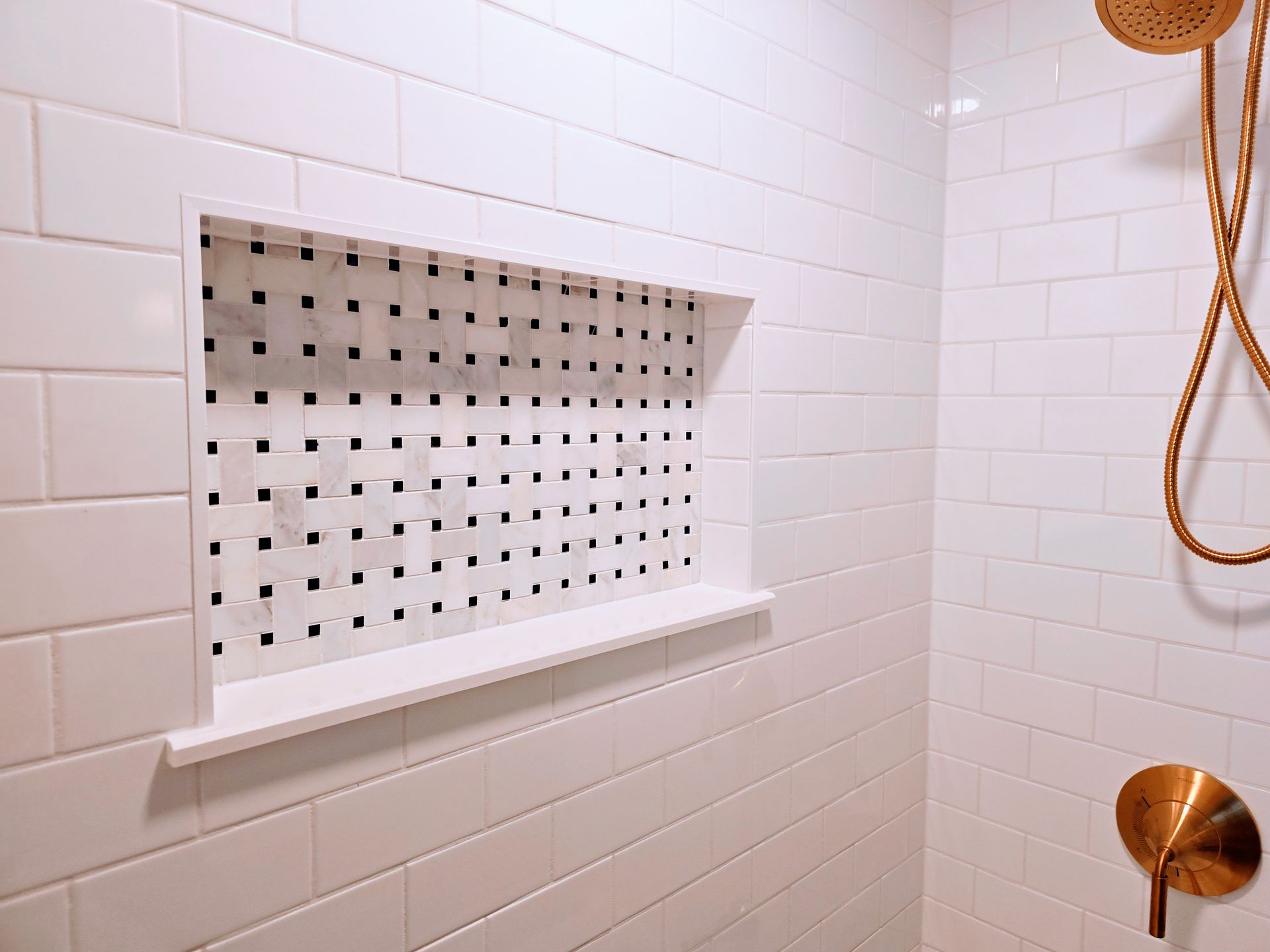
Plumbing and Electrical Work
During a bathroom remodel, the inclusion of plumbing and electrical alterations can increase the total expenses. The typical expenditure for updating plumbing is about $800 on average, which may cover the replacement of fixtures, pipes, and other essential components in your plumbing system. If there’s a need to relocate existing bathroom plumbing elements, costs could range from $1,000 to as high as $5,000. By maintaining the original configuration of your bathroom layout, you can considerably reduce these expenditures related to both plumbing and electrics.
The price tag for an updated electrical setup during renovations should not be overlooked either. Installing just one new outlet might cost anywhere between $130 to $300. If rewiring becomes necessary, expect it to contribute an additional cost ranging from two dollars up four per square foot involved in project area. To bypass potentially expensive errors, professional help with complex tasks like major changes involving water or power lines comes highly recommended, this strategic approach towards planning will undoubtedly lead to more efficient management of renovation budgets overall.
Water Damage Repair
The cost to fix water damage is contingent upon the severity of the damage and required fixes. For a bathroom renovation, repairing water-damaged areas typically costs between $3,75 and $7 per square foot. To avoid moisture build-up and hinder mold proliferation, one should consider integrating mildew-resistant paint and drywall.
Incorporating products resistant to mold and mildew in your renovations can serve as a preventative measure against significant problems for an extended period.
Accessibility Upgrades
Renovation expenses can rise when incorporating accessibility improvements like expanded doorways and grab bars. The cost of making a bathroom compliant with the Americans with Disabilities Act (ADA) might range from an additional $100 to $18,000 on top of the usual remodeling costs, contingent upon how extensive the upgrades are. Accessibility enhancements often include broader doorway openings, cabinets that are positioned lower, and showers that feature zero-depth entries. Such alterations aim to increase the functionality of living areas for people facing mobility difficulties.
Understanding these potential upgrade expenditures is key in planning for a bathroom remodel that is both inclusive and practical.
Types of Bathrooms and Their Renovation Costs
The expense of renovating a bathroom can vary greatly depending on its size and the intricacies involved. Here are some ballpark figures for different types of bathroom remodels:
- For primary bathrooms, you might expect to spend between $15,000 and $55,000.
- If opting for luxury renovations, the costs could soar from $60,000 to as high as $80,1000.
- Guest bathroom updates vary widely in price from about $3,500 to an upper range around $20 000—this largely hinges on your choice of finishing touches.
When it comes to powder rooms—which typically require less work—they tend not to be too heavy on the pocketbook. Renovation expenses here can run anywhere from just approximately 1200 all up over slightly beyond.4You’ll find that being informed about these potential outlays aids tremendously both in scheming out a renovation strategy with precision Directing investments wisely throughout various segments within your home’s lavatory spaces.
Master Bathroom
The cost of renovating a master bathroom can vary significantly, typically ranging from $15,000 to $55,000. For high-end luxury remodels, expenses may reach as much as $80,000. A 2020 study by the National Kitchen and Bath Association indicated that homeowners usually invested between $20,000 and $30,000 in renovations for their primary bathrooms. Incorporating walk-in showers into master bathrooms has been shown to cost anywhere from $8,500 up to around $20,s.
When it comes to refurbishing the wet area of a bathroom—which could entail refinishing an existing bathtub or transforming a tub into a shower—homeowners are looking at costs between approximately two thousand dollars ($2k) on the lower end and five thousand dollars (5k) on higher end engagements.
Included within this are key details outlining how elements are perceived as luxurious add-ons such as:
- heated towel racks,
- premium showerheads,
- stylish cabinet hardware
- sophisticated bidets
It might raise the total expense involved with these kinds of improvements projects. It’s useful to understand various price points related considerations so one might more effectively budget proposed expenditures when planning undertake any sort of upscale remodeling work specific your residence’s master bath areas.”
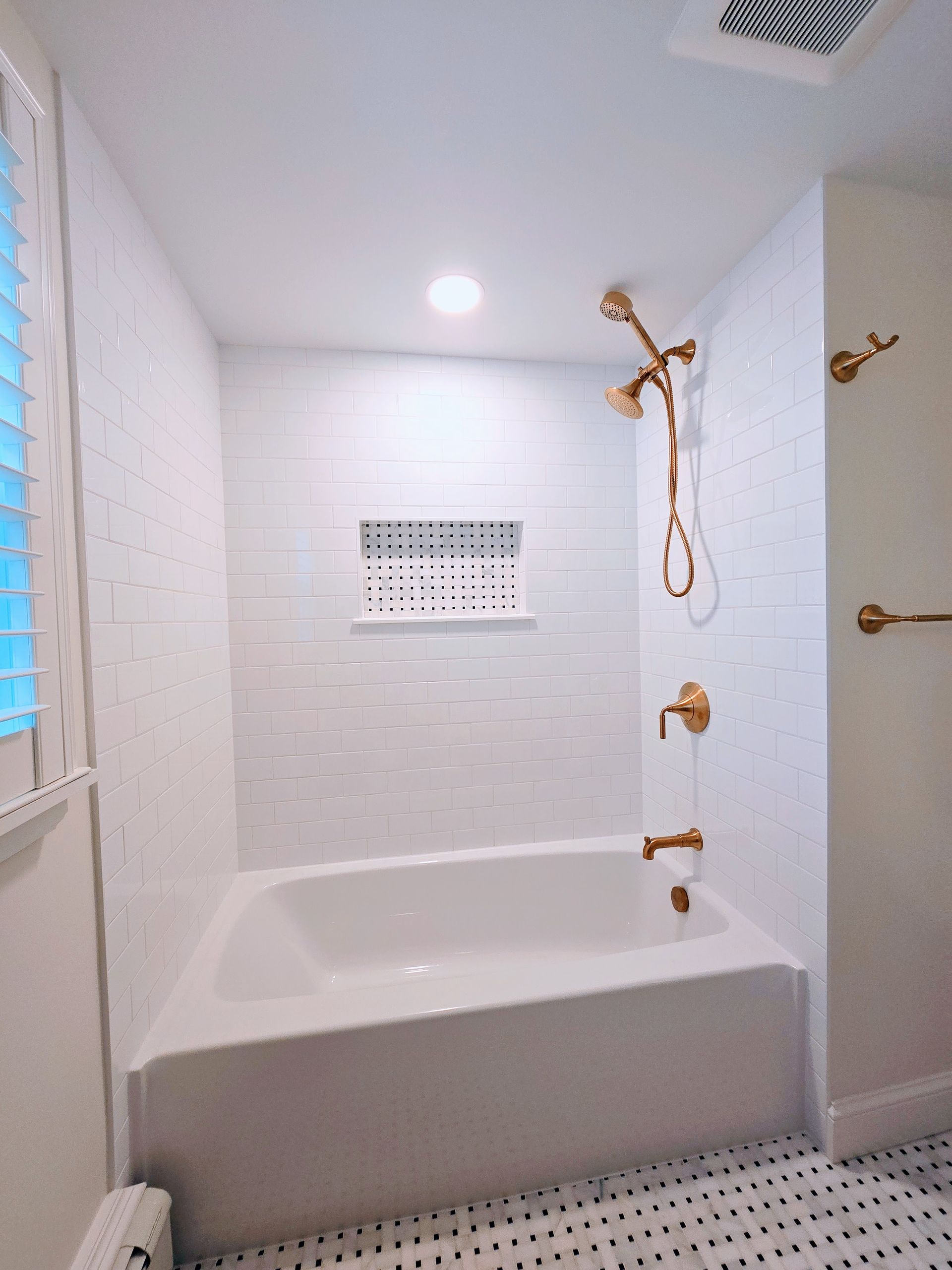
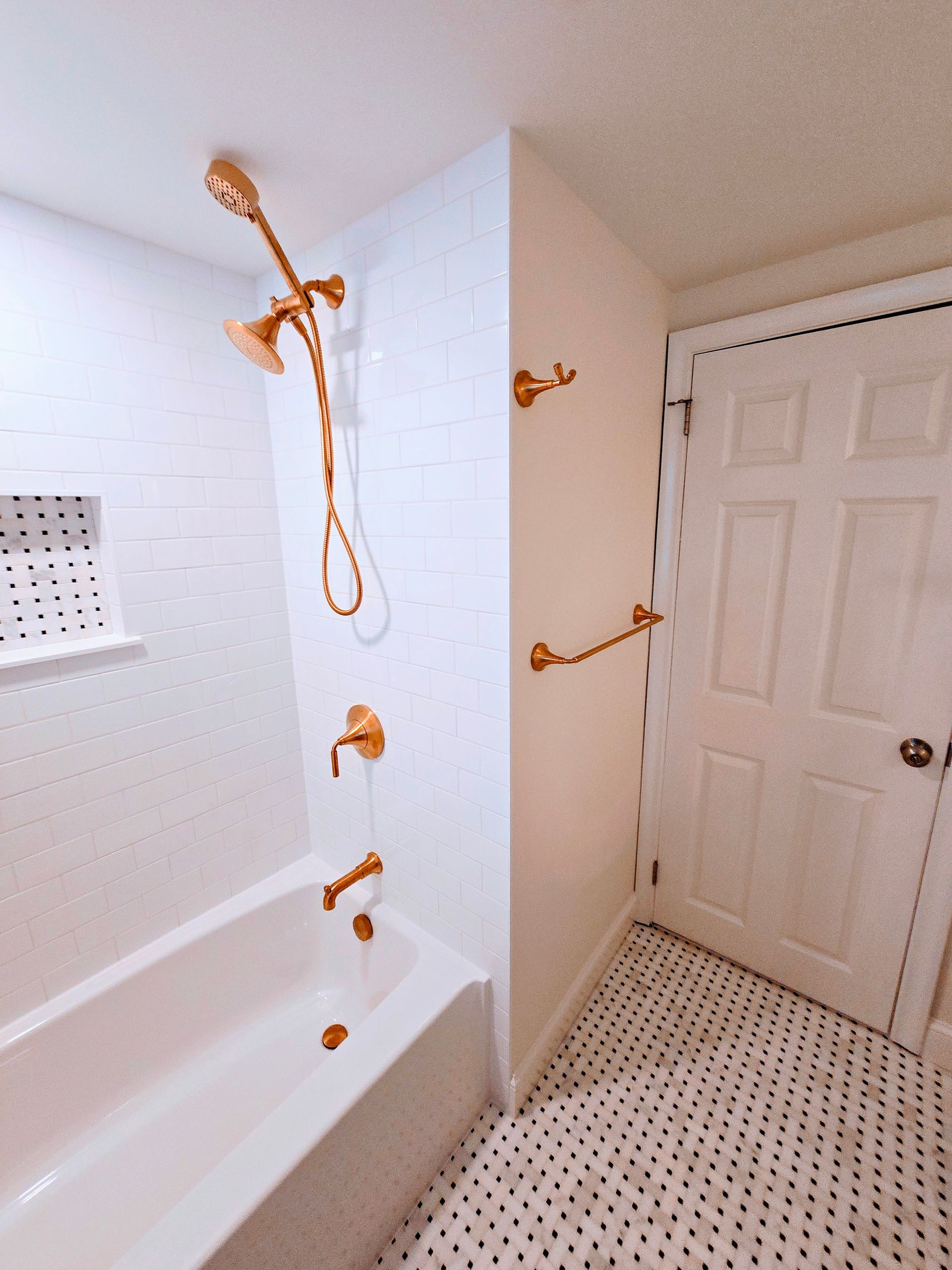
Guest Bathroom
Renovating a guest bathroom can enhance both the functionality and attractiveness of your home to visitors, often at a lower cost compared to master bathroom remodels. The expense for revamping a guest bath varies from $3,500 to $20,000 based on the quality of finishes selected.
Powder Room
Renovating a powder room typically falls on the more affordable end of the spectrum, with expenditure stretching between $12,000 and $16,000. Even though they are compact in size, these areas have the potential to greatly impress when updated with economical yet careful design choices.
Benefits of Renovating Your Bathroom
Undertaking a bathroom renovation can lead to numerous advantages, not least among them being a boost in your property’s value, the optimization of its use, and greater energy efficiency. A moderate overhaul of your bathroom could potentially enhance home value by up to 70.1%, while more luxurious renovations might deliver around 60.2% return on investment.
To the monetary upsides, an intelligently designed bathroom refurbishment can increase functionality through better space utilization and enhanced storage options. Upgrading to eco-friendly features such as low-flow toilets and LED lights is also likely to reduce monthly bills by cutting down on water and electricity consumption respectively—allowing us Exploration into these myriad benefits.
Increased Home Value
Undergoing a bathroom renovation can significantly boost the value of your property when it’s time to sell. To maximize your home’s value, consider making these updates in your bathroom:
- Exchange old fixtures and hardware for modern ones
- Lay down new flooring materials
- Refresh the vanity area along with countertops
- Revamp or replace the bathtub and shower units
- Enhance illumination within the space
- Introduce additional storage options
- Amp up overall design appeal and aesthetics
A typical midrange bathroom remodel is often reported to recoup 58.9% in investment returns, whereas an upscale bath upgrade sees a slightly lower return at 53.5%. The components you decide to enhance will largely dictate both how much you’ll spend on renovations as well as their expected financial yield.
Investing in middle-tier bathroom remodels tends to escalate property values by $1.71 for every invested dollar. Keep in mind that this rate of ROI could be affected by prevailing market trends specific to real estate at any given point during your project timeline or sale period for your renovated restroom facilities.
Improved Functionality
Refurbishing your bathroom can optimize the use of space and enhance its storage capabilities, thereby increasing the room’s practicality. The addition of double vanities can also boost functionality by offering distinct spaces for several users to utilize concurrently.
A renovation allows for possibilities to expand the area and implement new storage options, improving the overall utility of the space.
Energy Efficiency
Incorporating water-saving toilets, showerheads, and faucets during bathroom remodels can greatly reduce utility expenses. These low-flow fixtures not only conserve water, but also provide advantages for homeowners and the environment alike. Introducing adjustable lighting options along with newer versions of light fixtures and water heaters enhances energy efficiency which leads to Cost savings.
Tips for Saving Money on Bathroom Renovations
It is feasible to economize on bathroom remodels by making judicious decisions and strategic planning. Establishing a budget and accounting for unforeseen costs are critical actions prior to initiating the renovation process of your bathroom. To adhere to your financial plan, consider choosing more affordable flooring materials and opting for tub refinishment over replacement.
To diminish renovation expenditures, you might:
- Look for promotions and markdowns on building supplies as well as fixtures
- Undertake simple tasks such as painting independently to cut back on labor expenses
- Recycle or retrofit current fixtures
Employing these tactics can lead to substantial savings in your bathroom upgrade venture.
Budget-Friendly Materials
Opting for economical materials is a smart way to maintain quality while reducing expenses. Subway tiles, particularly in classic white ceramic, are an affordable option for lining bathroom walls. If you desire the aesthetic of natural stone but at a more modest price point, porcelain tiles are both durable and cost-effective.
For countertops, laminate surfaces provide a budget-conscious choice that can replicate the upscale appearance of granite or marble. Vinyl flooring presents itself as an inexpensive yet water-resistant solution ideal for bathroom settings. Utilizing these selections will allow you to fashion an elegant bathroom ambiance without overextending your finances.
Retaining Existing Layout
Preserving the existing layout of your bathroom can significantly reduce expenses. By not altering the placement of plumbing fixtures or demolishing walls, you avoid additional costs, enabling you to refresh your space while maintaining adherence to your financial plan.
Refinishing Instead of Replacing
Applying new finishes or protective coatings to bathtubs and cabinets is a cost-effective substitution for full replacement during a diy bathroom remodel. Consider the advantages of refinishing.
- It can lead to substantial savings, often in the hundreds of dollars over complete fixture replacements.
- The expense for refinishing a clawfoot bathtub falls between $500 and $1,200.
- A refinished fixture can enjoy an increased lifespan, potentially lasting an additional 10 to 15 years.
Revitalizing worn cabinets with a refurbishment offers them renewed vibrancy at a fraction of what you’d spend on brand-new cabinetry. Similarly, giving old sinks a refurbished appearance spares you from the financial burden of acquiring new ones. Comprehending these choices is key in managing your budget effectively throughout your bathroom renovation project.
Questions to Ask Your Contractor
When embarking on a bathroom remodeling project, it is imperative to pose pertinent questions to your contractor to confirm the smooth progression of the renovation. It’s beneficial to request portfolios of previous bathroom renovations completed by the contractor, which allows you to assess their timeliness, communicative efficiency and standard of craftsmanship. Confirm if they are accustomed to managing projects that mirror yours in terms of scale and complexity for assurance that they possess appropriate expertise.
To gain a clear understanding of where your money will be allocated during the renovation process, ask for a detailed bid breaking down costs associated with each element. This assists in aligning your budget plans more accurately. Verifying whether your contractor is fully bonded, licensed and holds adequate insurance is essential as it offers protection against potential damage or accidents over the course elements may fall out over time due eroding materials from age pf installation so continue monitoring closely any new developments needing immediate attention throughout longevity maintaining stability within foundation infrastructureions such as adhesive bonds holding tiles together securely inplace without risk coming loose causing injury anyone unlucky enough step wrong one day unexpectedlyonsite operations . Establish an agreed-upon work schedule outlining daily tasks, clarify who bears responsibility for clean up at end day after finishing jobsite duties along with arrangements regarding construction waste disposal, setting these parameters upfront can facilitate smoother working relations while choosing the most suitable professional complete job successfully. These inquiries will assist you in selecting an ideal contractor tailor-fit for fulfilling requirements set forth within the planned undertaking effectively.
Summary
Comprehending the financial requirements and various elements that play a role in remodeling a bathroom can facilitate better preparation and help circumvent unforeseen costs. This guide has comprehensively addressed everything from evaluating the magnitude of your renovation to selecting materials that are kind to your wallet, as well as posing pertinent inquiries to your contractor. Through meticulous planning and judicious decision-making, you’re able to establish an aesthetically pleasing and practical restroom within your financial means, satisfying all your specifications.
Frequently Asked Questions
What is the average cost of a bathroom remodel?
The typical expense for renovating a bathroom hovers at approximately $11,365. Depending on the project’s complexity and size, this cost can fluctuate between $6,622 to $16,744.
How does the size of the bathroom affect renovation costs?
Renovation expenses are greatly influenced by the dimensions of the bathroom, with smaller ones typically incurring less cost and larger ones, especially those equipped with bespoke elements, potentially driving up expenditures considerably.
What are some budget-friendly materials for a bathroom renovation?
For your bathroom renovation project, there are affordable materials to consider such as plain white ceramic tiles, porcelain tiles, laminate countertops, and vinyl flooring. These selections offer economical alternatives that can help keep costs down.
How can I save money on labor costs during a bathroom remodel?
By opting for a do-it-yourself method when painting, tiling, and setting up light fixtures during a bathroom remodel, you can substantially cut down on labor expenses and consequently lower the total cost of the renovation.
What should I ask my contractor before starting a bathroom renovation?
Prior to commencing a renovation of your bathroom, it is essential to inquire about several details from your contractor. You should ensure they share their experience with similar renovations, examples of past work, and provide you with an itemized bid. Confirm that the contractor has appropriate bonding, licensing and insurance. It’s also important to discuss the schedule for daily work along with how cleanup will be managed.
Acknowledging these factors is vital in achieving a successfulbathroom makeover.
